How to develop effective leadership skills across the global organisation
VerifiedAdded on 2022/08/13
|44
|11435
|284
AI Summary
How will the paper help in ensuring the effectiveness of the leadership that will help in the improvement of the working style of an organisation Q3. The paper aims to help in ensuring the effectiveness of the leadership that will help in the improvement of the working style of an organisation (Antonakis 2017). Summary 33 Chapter 5- Discussion 34 5.1 Overview 34 5.2 Conclusion 34 5.3 Linking to Objectives 35 5.4 Future Scope 35 Reference list 37 Chapter 1- Introduction 1.1 Research Background Leadership is an important factor that will ensure that the organisation
Contribute Materials
Your contribution can guide someone’s learning journey. Share your
documents today.
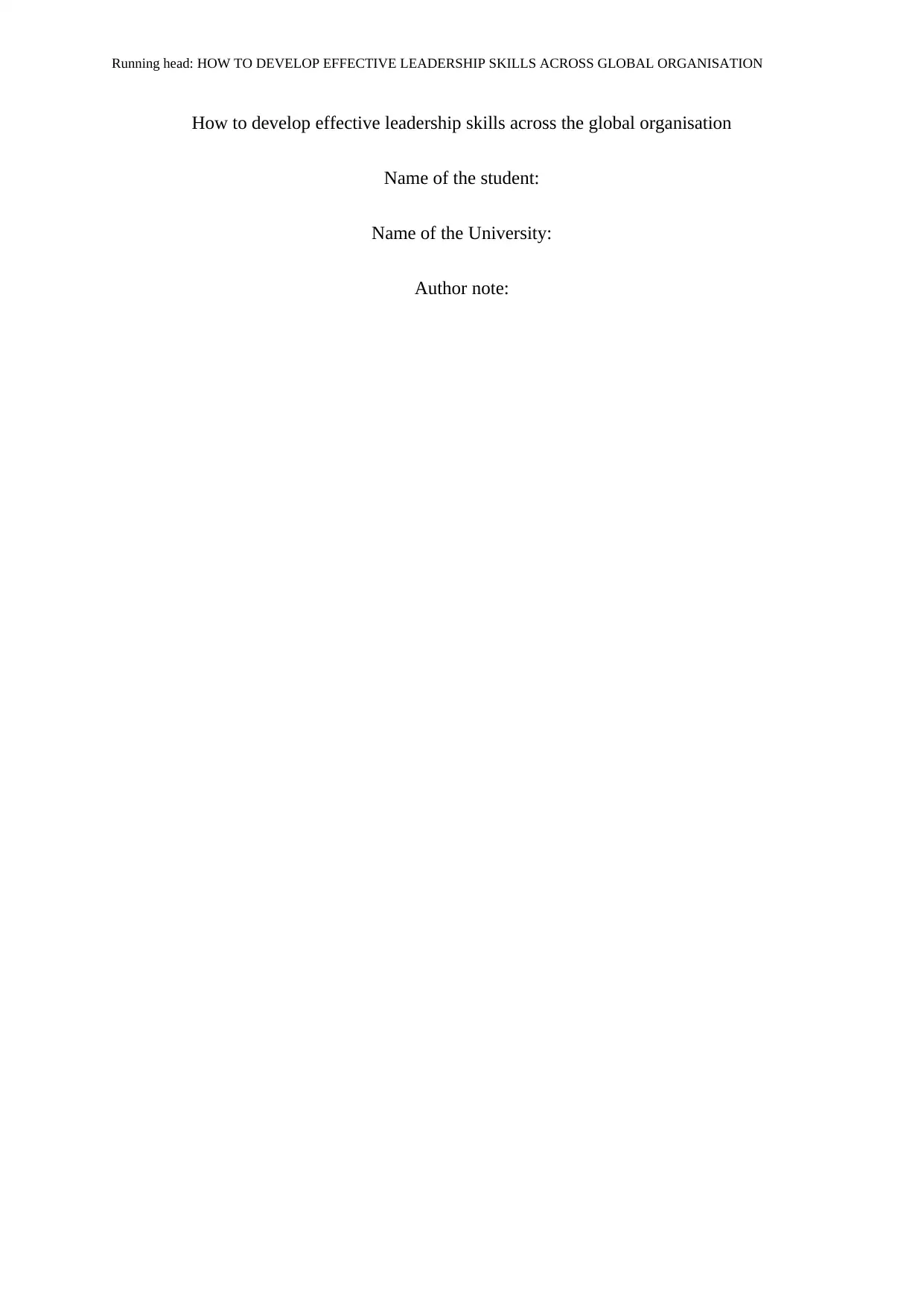
Running head: HOW TO DEVELOP EFFECTIVE LEADERSHIP SKILLS ACROSS GLOBAL ORGANISATION
How to develop effective leadership skills across the global organisation
Name of the student:
Name of the University:
Author note:
How to develop effective leadership skills across the global organisation
Name of the student:
Name of the University:
Author note:
Secure Best Marks with AI Grader
Need help grading? Try our AI Grader for instant feedback on your assignments.
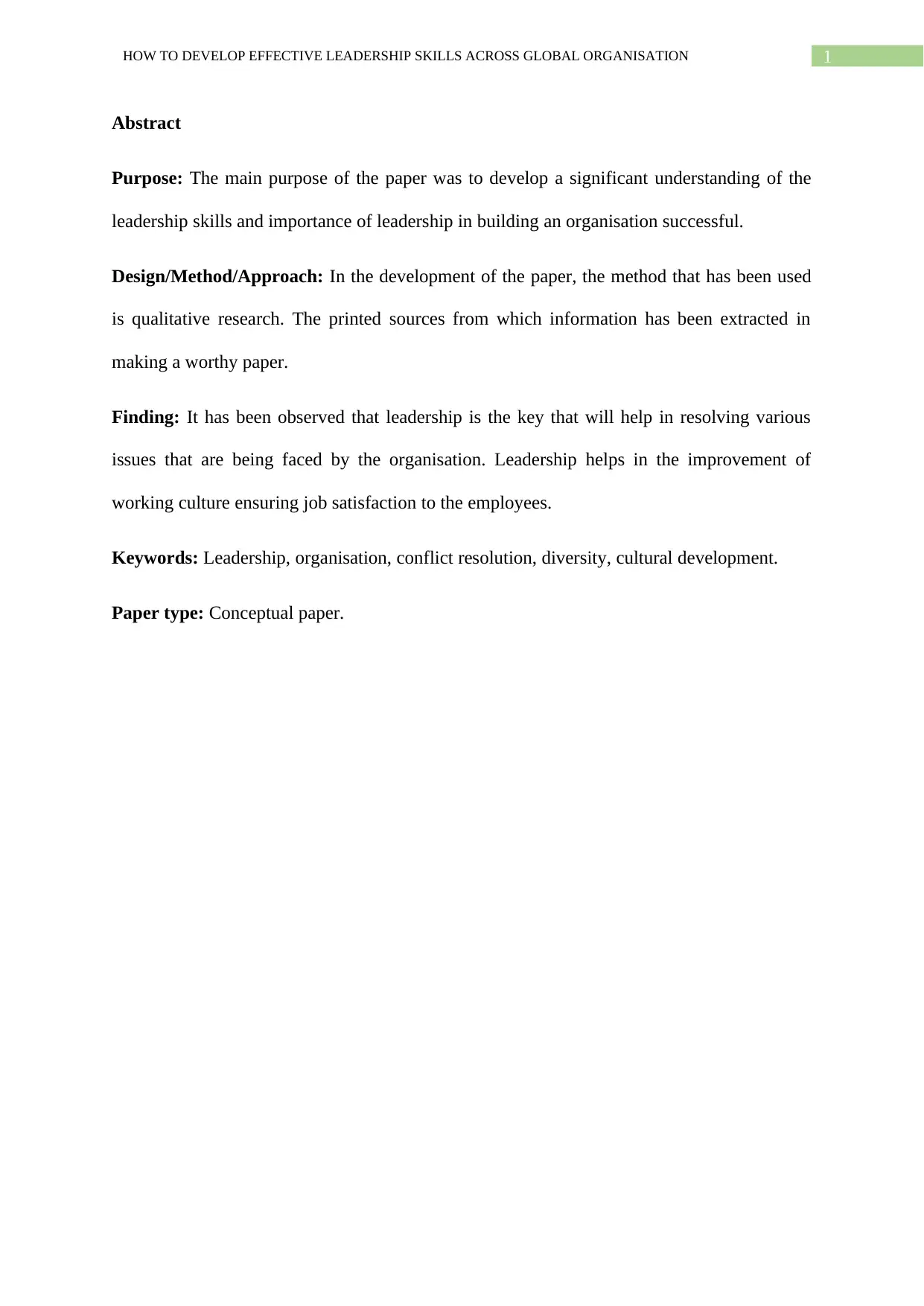
1HOW TO DEVELOP EFFECTIVE LEADERSHIP SKILLS ACROSS GLOBAL ORGANISATION
Abstract
Purpose: The main purpose of the paper was to develop a significant understanding of the
leadership skills and importance of leadership in building an organisation successful.
Design/Method/Approach: In the development of the paper, the method that has been used
is qualitative research. The printed sources from which information has been extracted in
making a worthy paper.
Finding: It has been observed that leadership is the key that will help in resolving various
issues that are being faced by the organisation. Leadership helps in the improvement of
working culture ensuring job satisfaction to the employees.
Keywords: Leadership, organisation, conflict resolution, diversity, cultural development.
Paper type: Conceptual paper.
Abstract
Purpose: The main purpose of the paper was to develop a significant understanding of the
leadership skills and importance of leadership in building an organisation successful.
Design/Method/Approach: In the development of the paper, the method that has been used
is qualitative research. The printed sources from which information has been extracted in
making a worthy paper.
Finding: It has been observed that leadership is the key that will help in resolving various
issues that are being faced by the organisation. Leadership helps in the improvement of
working culture ensuring job satisfaction to the employees.
Keywords: Leadership, organisation, conflict resolution, diversity, cultural development.
Paper type: Conceptual paper.
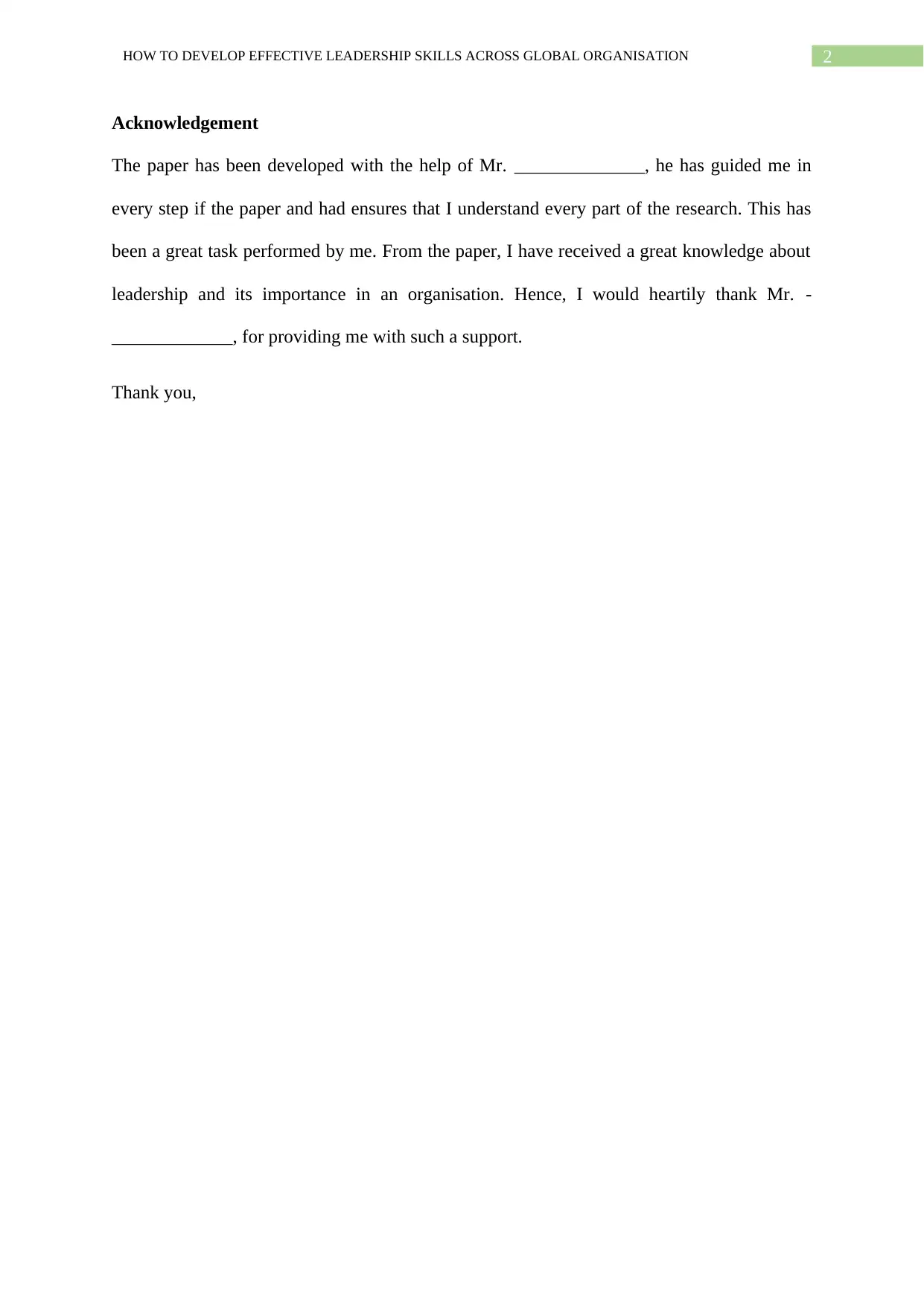
2HOW TO DEVELOP EFFECTIVE LEADERSHIP SKILLS ACROSS GLOBAL ORGANISATION
Acknowledgement
The paper has been developed with the help of Mr. ______________, he has guided me in
every step if the paper and had ensures that I understand every part of the research. This has
been a great task performed by me. From the paper, I have received a great knowledge about
leadership and its importance in an organisation. Hence, I would heartily thank Mr. -
_____________, for providing me with such a support.
Thank you,
Acknowledgement
The paper has been developed with the help of Mr. ______________, he has guided me in
every step if the paper and had ensures that I understand every part of the research. This has
been a great task performed by me. From the paper, I have received a great knowledge about
leadership and its importance in an organisation. Hence, I would heartily thank Mr. -
_____________, for providing me with such a support.
Thank you,
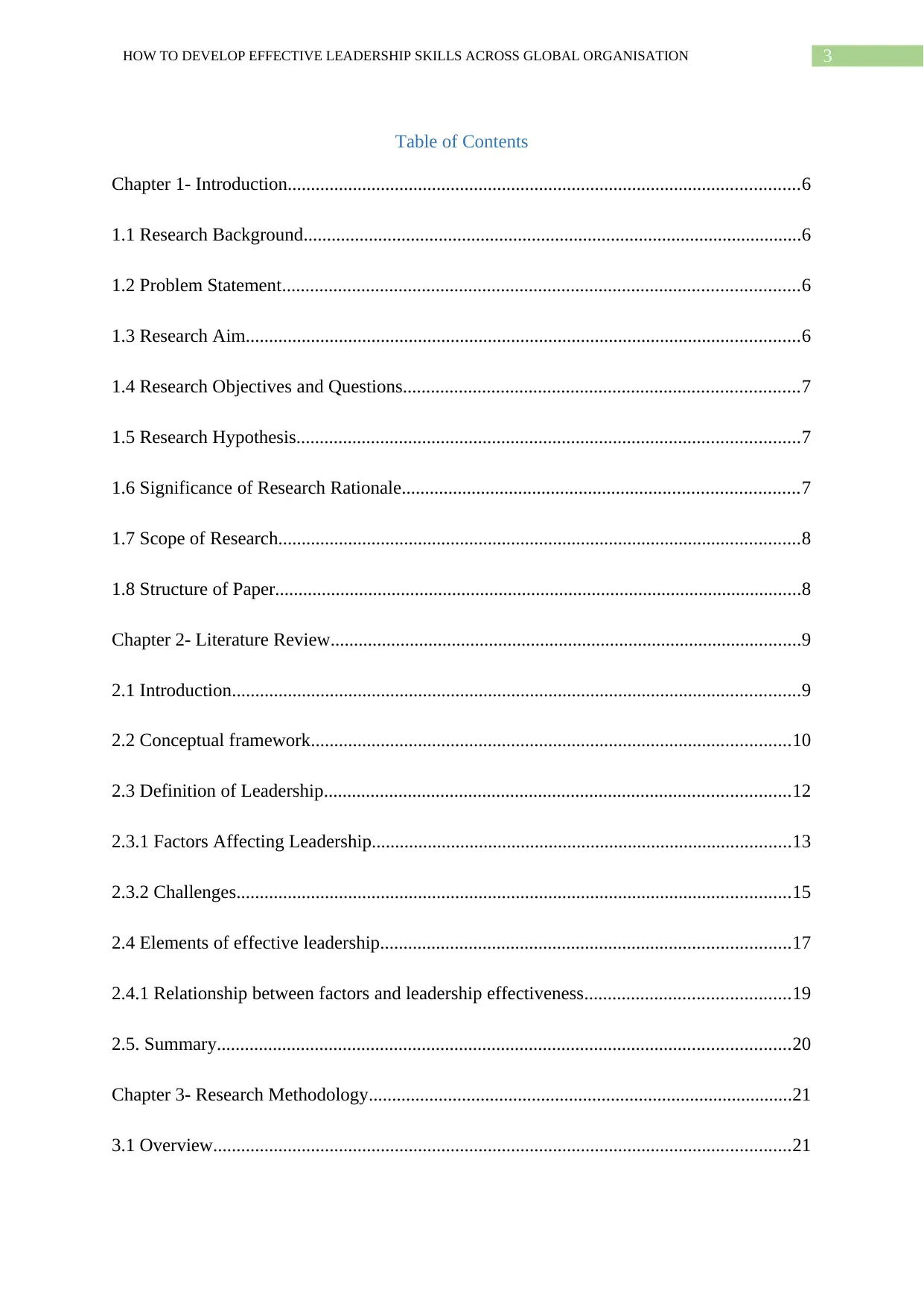
3HOW TO DEVELOP EFFECTIVE LEADERSHIP SKILLS ACROSS GLOBAL ORGANISATION
Table of Contents
Chapter 1- Introduction..............................................................................................................6
1.1 Research Background...........................................................................................................6
1.2 Problem Statement...............................................................................................................6
1.3 Research Aim.......................................................................................................................6
1.4 Research Objectives and Questions.....................................................................................7
1.5 Research Hypothesis............................................................................................................7
1.6 Significance of Research Rationale.....................................................................................7
1.7 Scope of Research................................................................................................................8
1.8 Structure of Paper.................................................................................................................8
Chapter 2- Literature Review.....................................................................................................9
2.1 Introduction..........................................................................................................................9
2.2 Conceptual framework.......................................................................................................10
2.3 Definition of Leadership....................................................................................................12
2.3.1 Factors Affecting Leadership..........................................................................................13
2.3.2 Challenges.......................................................................................................................15
2.4 Elements of effective leadership........................................................................................17
2.4.1 Relationship between factors and leadership effectiveness............................................19
2.5. Summary...........................................................................................................................20
Chapter 3- Research Methodology...........................................................................................21
3.1 Overview............................................................................................................................21
Table of Contents
Chapter 1- Introduction..............................................................................................................6
1.1 Research Background...........................................................................................................6
1.2 Problem Statement...............................................................................................................6
1.3 Research Aim.......................................................................................................................6
1.4 Research Objectives and Questions.....................................................................................7
1.5 Research Hypothesis............................................................................................................7
1.6 Significance of Research Rationale.....................................................................................7
1.7 Scope of Research................................................................................................................8
1.8 Structure of Paper.................................................................................................................8
Chapter 2- Literature Review.....................................................................................................9
2.1 Introduction..........................................................................................................................9
2.2 Conceptual framework.......................................................................................................10
2.3 Definition of Leadership....................................................................................................12
2.3.1 Factors Affecting Leadership..........................................................................................13
2.3.2 Challenges.......................................................................................................................15
2.4 Elements of effective leadership........................................................................................17
2.4.1 Relationship between factors and leadership effectiveness............................................19
2.5. Summary...........................................................................................................................20
Chapter 3- Research Methodology...........................................................................................21
3.1 Overview............................................................................................................................21
Secure Best Marks with AI Grader
Need help grading? Try our AI Grader for instant feedback on your assignments.
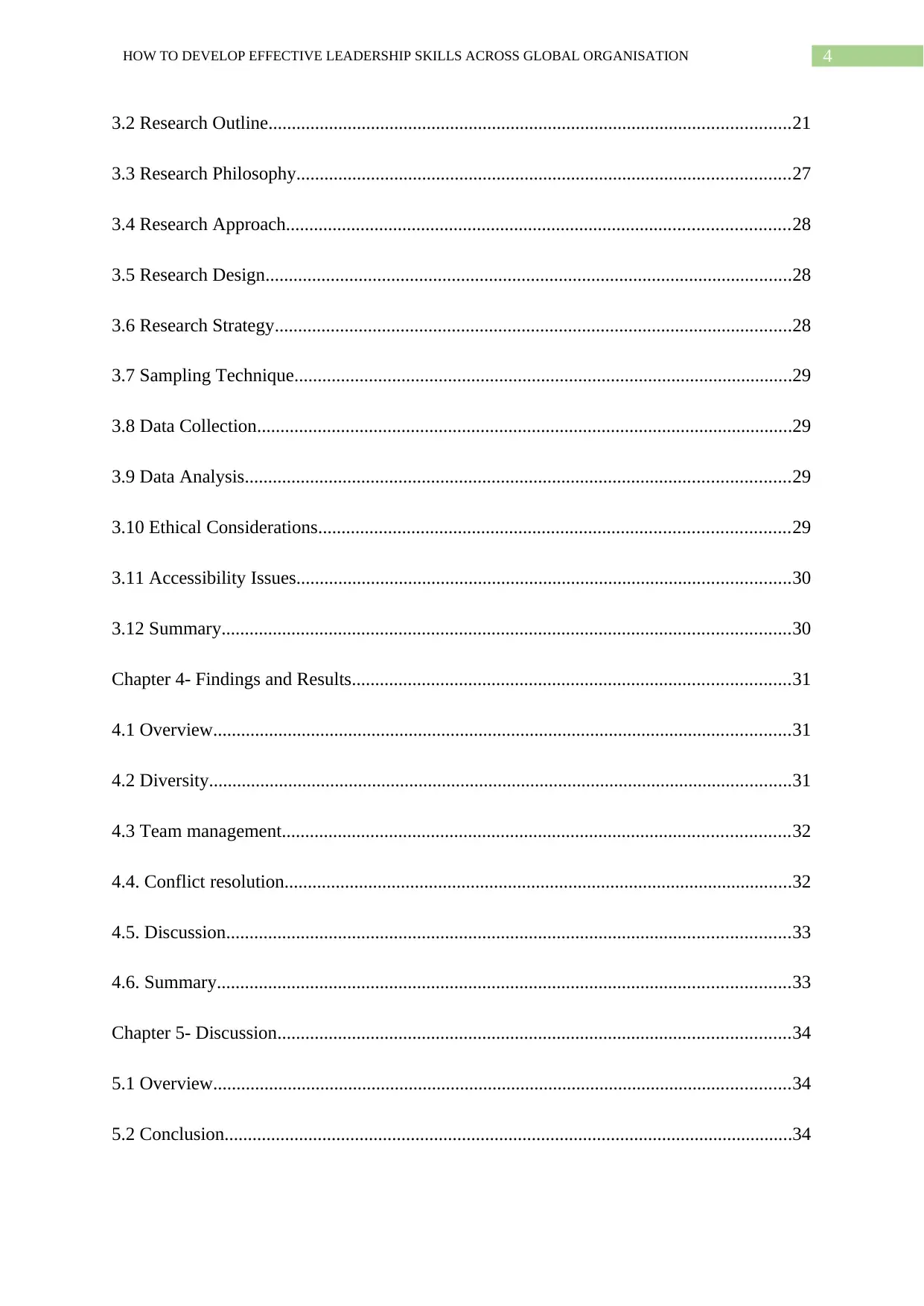
4HOW TO DEVELOP EFFECTIVE LEADERSHIP SKILLS ACROSS GLOBAL ORGANISATION
3.2 Research Outline................................................................................................................21
3.3 Research Philosophy..........................................................................................................27
3.4 Research Approach............................................................................................................28
3.5 Research Design.................................................................................................................28
3.6 Research Strategy...............................................................................................................28
3.7 Sampling Technique...........................................................................................................29
3.8 Data Collection...................................................................................................................29
3.9 Data Analysis.....................................................................................................................29
3.10 Ethical Considerations.....................................................................................................29
3.11 Accessibility Issues..........................................................................................................30
3.12 Summary..........................................................................................................................30
Chapter 4- Findings and Results..............................................................................................31
4.1 Overview............................................................................................................................31
4.2 Diversity.............................................................................................................................31
4.3 Team management.............................................................................................................32
4.4. Conflict resolution.............................................................................................................32
4.5. Discussion.........................................................................................................................33
4.6. Summary...........................................................................................................................33
Chapter 5- Discussion..............................................................................................................34
5.1 Overview............................................................................................................................34
5.2 Conclusion..........................................................................................................................34
3.2 Research Outline................................................................................................................21
3.3 Research Philosophy..........................................................................................................27
3.4 Research Approach............................................................................................................28
3.5 Research Design.................................................................................................................28
3.6 Research Strategy...............................................................................................................28
3.7 Sampling Technique...........................................................................................................29
3.8 Data Collection...................................................................................................................29
3.9 Data Analysis.....................................................................................................................29
3.10 Ethical Considerations.....................................................................................................29
3.11 Accessibility Issues..........................................................................................................30
3.12 Summary..........................................................................................................................30
Chapter 4- Findings and Results..............................................................................................31
4.1 Overview............................................................................................................................31
4.2 Diversity.............................................................................................................................31
4.3 Team management.............................................................................................................32
4.4. Conflict resolution.............................................................................................................32
4.5. Discussion.........................................................................................................................33
4.6. Summary...........................................................................................................................33
Chapter 5- Discussion..............................................................................................................34
5.1 Overview............................................................................................................................34
5.2 Conclusion..........................................................................................................................34
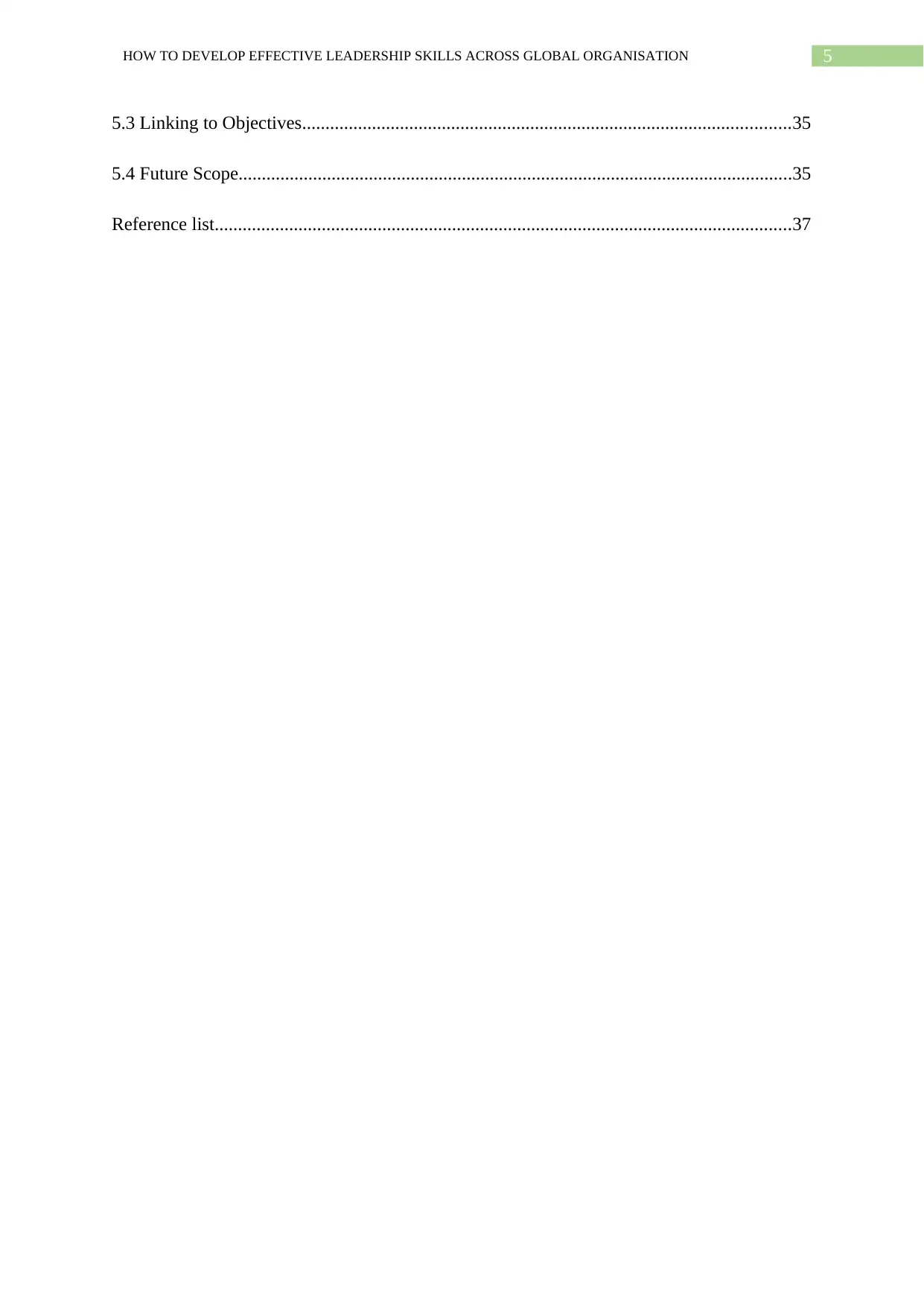
5HOW TO DEVELOP EFFECTIVE LEADERSHIP SKILLS ACROSS GLOBAL ORGANISATION
5.3 Linking to Objectives.........................................................................................................35
5.4 Future Scope.......................................................................................................................35
Reference list............................................................................................................................37
5.3 Linking to Objectives.........................................................................................................35
5.4 Future Scope.......................................................................................................................35
Reference list............................................................................................................................37
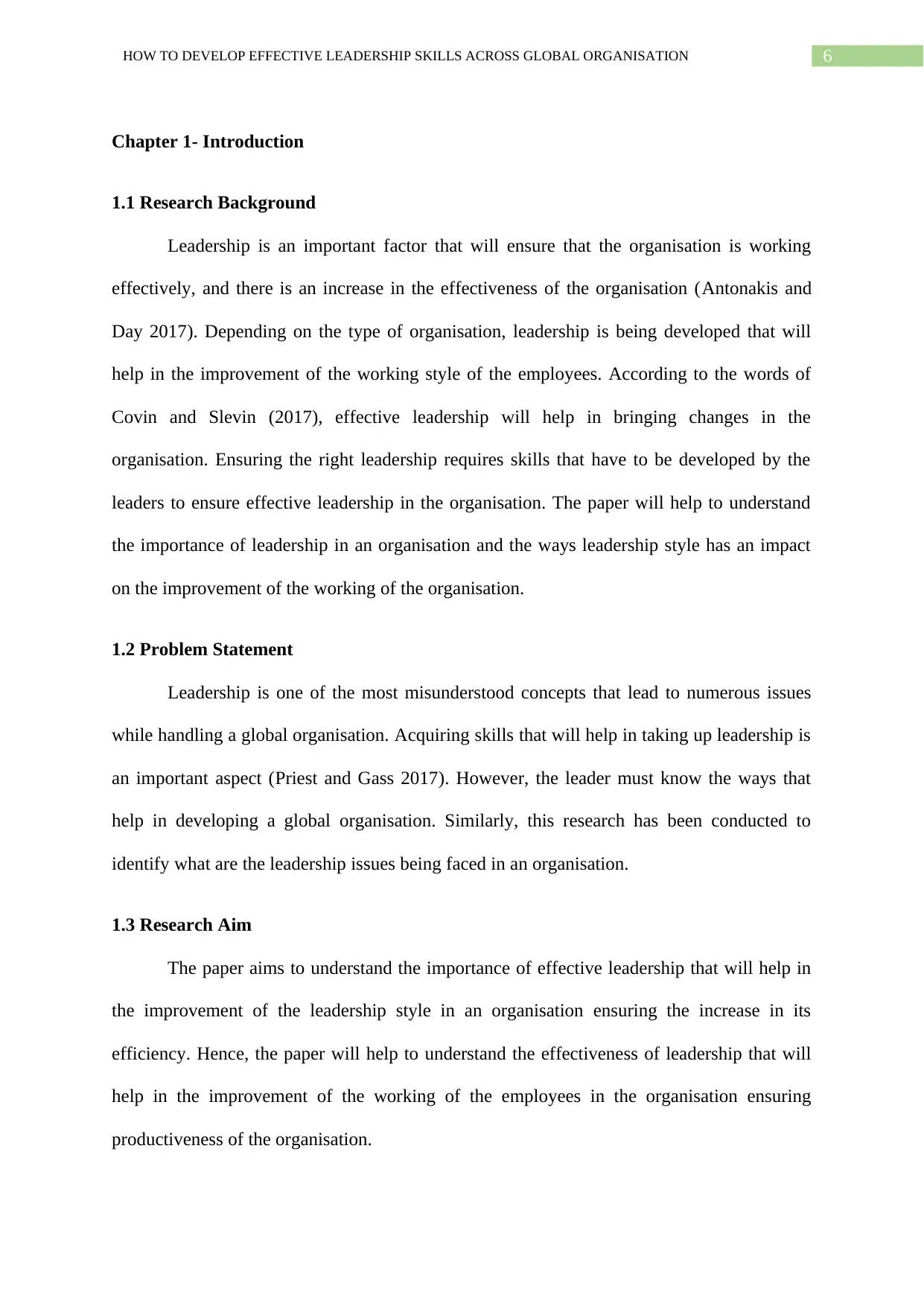
6HOW TO DEVELOP EFFECTIVE LEADERSHIP SKILLS ACROSS GLOBAL ORGANISATION
Chapter 1- Introduction
1.1 Research Background
Leadership is an important factor that will ensure that the organisation is working
effectively, and there is an increase in the effectiveness of the organisation (Antonakis and
Day 2017). Depending on the type of organisation, leadership is being developed that will
help in the improvement of the working style of the employees. According to the words of
Covin and Slevin (2017), effective leadership will help in bringing changes in the
organisation. Ensuring the right leadership requires skills that have to be developed by the
leaders to ensure effective leadership in the organisation. The paper will help to understand
the importance of leadership in an organisation and the ways leadership style has an impact
on the improvement of the working of the organisation.
1.2 Problem Statement
Leadership is one of the most misunderstood concepts that lead to numerous issues
while handling a global organisation. Acquiring skills that will help in taking up leadership is
an important aspect (Priest and Gass 2017). However, the leader must know the ways that
help in developing a global organisation. Similarly, this research has been conducted to
identify what are the leadership issues being faced in an organisation.
1.3 Research Aim
The paper aims to understand the importance of effective leadership that will help in
the improvement of the leadership style in an organisation ensuring the increase in its
efficiency. Hence, the paper will help to understand the effectiveness of leadership that will
help in the improvement of the working of the employees in the organisation ensuring
productiveness of the organisation.
Chapter 1- Introduction
1.1 Research Background
Leadership is an important factor that will ensure that the organisation is working
effectively, and there is an increase in the effectiveness of the organisation (Antonakis and
Day 2017). Depending on the type of organisation, leadership is being developed that will
help in the improvement of the working style of the employees. According to the words of
Covin and Slevin (2017), effective leadership will help in bringing changes in the
organisation. Ensuring the right leadership requires skills that have to be developed by the
leaders to ensure effective leadership in the organisation. The paper will help to understand
the importance of leadership in an organisation and the ways leadership style has an impact
on the improvement of the working of the organisation.
1.2 Problem Statement
Leadership is one of the most misunderstood concepts that lead to numerous issues
while handling a global organisation. Acquiring skills that will help in taking up leadership is
an important aspect (Priest and Gass 2017). However, the leader must know the ways that
help in developing a global organisation. Similarly, this research has been conducted to
identify what are the leadership issues being faced in an organisation.
1.3 Research Aim
The paper aims to understand the importance of effective leadership that will help in
the improvement of the leadership style in an organisation ensuring the increase in its
efficiency. Hence, the paper will help to understand the effectiveness of leadership that will
help in the improvement of the working of the employees in the organisation ensuring
productiveness of the organisation.
Paraphrase This Document
Need a fresh take? Get an instant paraphrase of this document with our AI Paraphraser
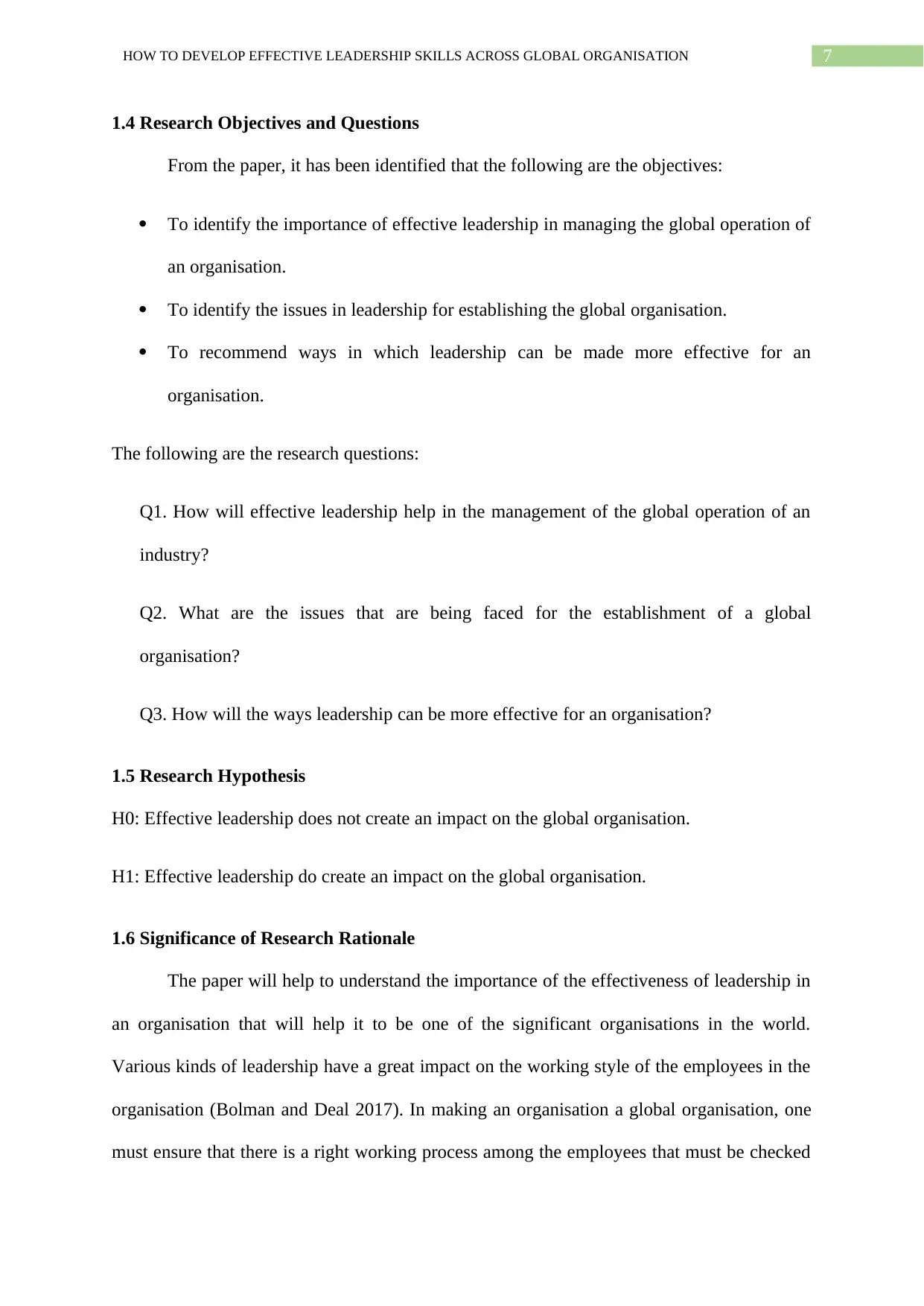
7HOW TO DEVELOP EFFECTIVE LEADERSHIP SKILLS ACROSS GLOBAL ORGANISATION
1.4 Research Objectives and Questions
From the paper, it has been identified that the following are the objectives:
To identify the importance of effective leadership in managing the global operation of
an organisation.
To identify the issues in leadership for establishing the global organisation.
To recommend ways in which leadership can be made more effective for an
organisation.
The following are the research questions:
Q1. How will effective leadership help in the management of the global operation of an
industry?
Q2. What are the issues that are being faced for the establishment of a global
organisation?
Q3. How will the ways leadership can be more effective for an organisation?
1.5 Research Hypothesis
H0: Effective leadership does not create an impact on the global organisation.
H1: Effective leadership do create an impact on the global organisation.
1.6 Significance of Research Rationale
The paper will help to understand the importance of the effectiveness of leadership in
an organisation that will help it to be one of the significant organisations in the world.
Various kinds of leadership have a great impact on the working style of the employees in the
organisation (Bolman and Deal 2017). In making an organisation a global organisation, one
must ensure that there is a right working process among the employees that must be checked
1.4 Research Objectives and Questions
From the paper, it has been identified that the following are the objectives:
To identify the importance of effective leadership in managing the global operation of
an organisation.
To identify the issues in leadership for establishing the global organisation.
To recommend ways in which leadership can be made more effective for an
organisation.
The following are the research questions:
Q1. How will effective leadership help in the management of the global operation of an
industry?
Q2. What are the issues that are being faced for the establishment of a global
organisation?
Q3. How will the ways leadership can be more effective for an organisation?
1.5 Research Hypothesis
H0: Effective leadership does not create an impact on the global organisation.
H1: Effective leadership do create an impact on the global organisation.
1.6 Significance of Research Rationale
The paper will help to understand the importance of the effectiveness of leadership in
an organisation that will help it to be one of the significant organisations in the world.
Various kinds of leadership have a great impact on the working style of the employees in the
organisation (Bolman and Deal 2017). In making an organisation a global organisation, one
must ensure that there is a right working process among the employees that must be checked
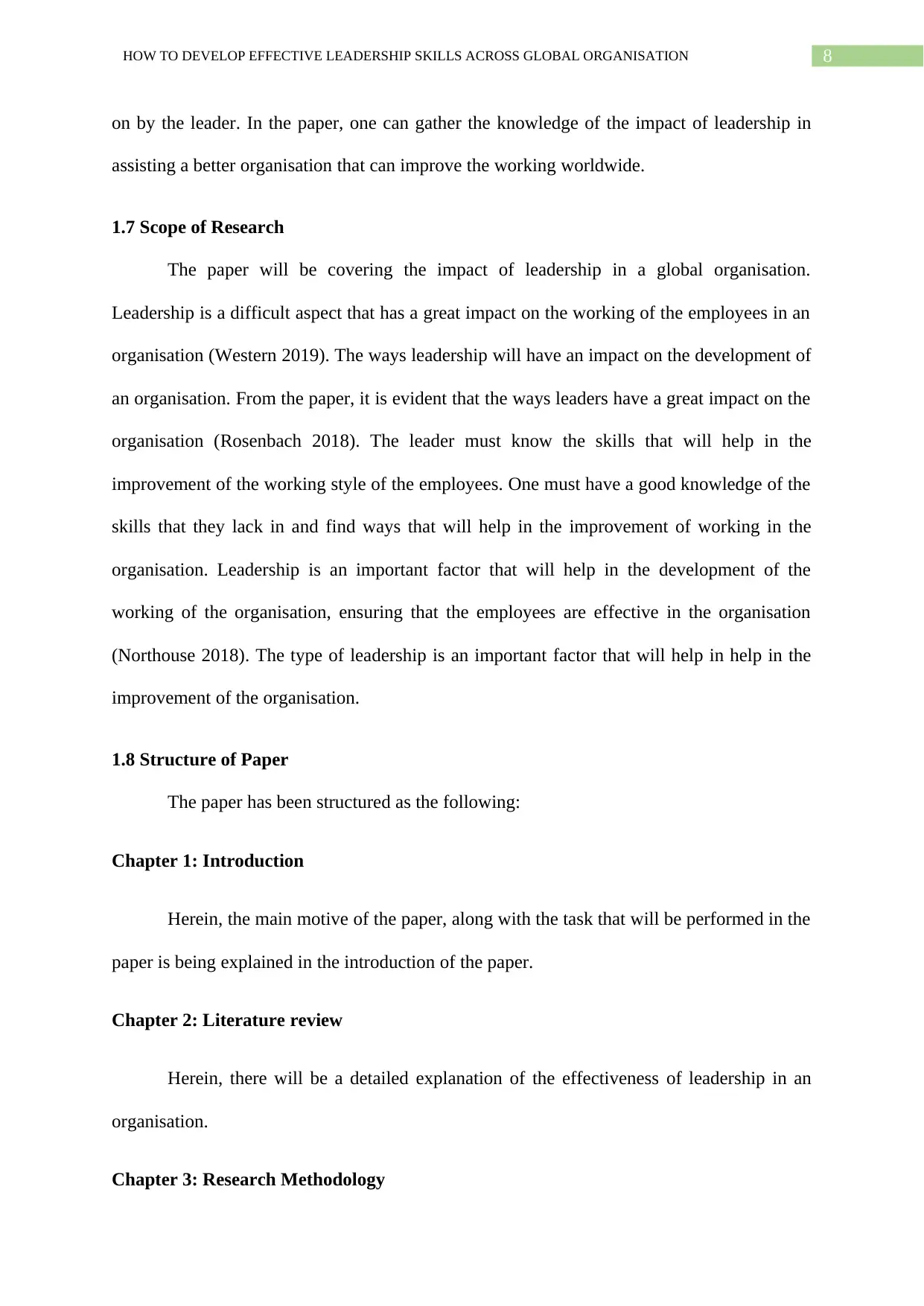
8HOW TO DEVELOP EFFECTIVE LEADERSHIP SKILLS ACROSS GLOBAL ORGANISATION
on by the leader. In the paper, one can gather the knowledge of the impact of leadership in
assisting a better organisation that can improve the working worldwide.
1.7 Scope of Research
The paper will be covering the impact of leadership in a global organisation.
Leadership is a difficult aspect that has a great impact on the working of the employees in an
organisation (Western 2019). The ways leadership will have an impact on the development of
an organisation. From the paper, it is evident that the ways leaders have a great impact on the
organisation (Rosenbach 2018). The leader must know the skills that will help in the
improvement of the working style of the employees. One must have a good knowledge of the
skills that they lack in and find ways that will help in the improvement of working in the
organisation. Leadership is an important factor that will help in the development of the
working of the organisation, ensuring that the employees are effective in the organisation
(Northouse 2018). The type of leadership is an important factor that will help in help in the
improvement of the organisation.
1.8 Structure of Paper
The paper has been structured as the following:
Chapter 1: Introduction
Herein, the main motive of the paper, along with the task that will be performed in the
paper is being explained in the introduction of the paper.
Chapter 2: Literature review
Herein, there will be a detailed explanation of the effectiveness of leadership in an
organisation.
Chapter 3: Research Methodology
on by the leader. In the paper, one can gather the knowledge of the impact of leadership in
assisting a better organisation that can improve the working worldwide.
1.7 Scope of Research
The paper will be covering the impact of leadership in a global organisation.
Leadership is a difficult aspect that has a great impact on the working of the employees in an
organisation (Western 2019). The ways leadership will have an impact on the development of
an organisation. From the paper, it is evident that the ways leaders have a great impact on the
organisation (Rosenbach 2018). The leader must know the skills that will help in the
improvement of the working style of the employees. One must have a good knowledge of the
skills that they lack in and find ways that will help in the improvement of working in the
organisation. Leadership is an important factor that will help in the development of the
working of the organisation, ensuring that the employees are effective in the organisation
(Northouse 2018). The type of leadership is an important factor that will help in help in the
improvement of the organisation.
1.8 Structure of Paper
The paper has been structured as the following:
Chapter 1: Introduction
Herein, the main motive of the paper, along with the task that will be performed in the
paper is being explained in the introduction of the paper.
Chapter 2: Literature review
Herein, there will be a detailed explanation of the effectiveness of leadership in an
organisation.
Chapter 3: Research Methodology
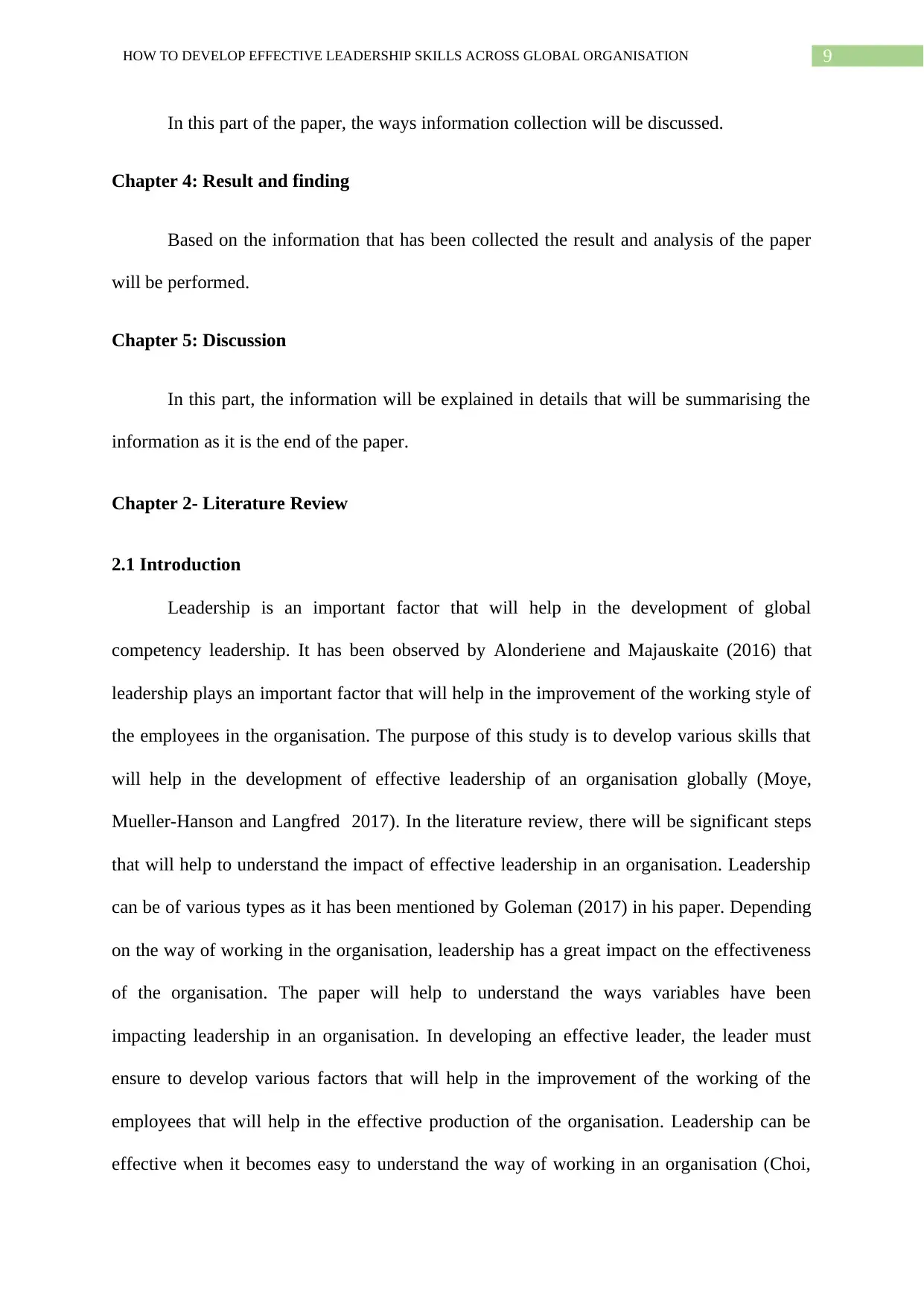
9HOW TO DEVELOP EFFECTIVE LEADERSHIP SKILLS ACROSS GLOBAL ORGANISATION
In this part of the paper, the ways information collection will be discussed.
Chapter 4: Result and finding
Based on the information that has been collected the result and analysis of the paper
will be performed.
Chapter 5: Discussion
In this part, the information will be explained in details that will be summarising the
information as it is the end of the paper.
Chapter 2- Literature Review
2.1 Introduction
Leadership is an important factor that will help in the development of global
competency leadership. It has been observed by Alonderiene and Majauskaite (2016) that
leadership plays an important factor that will help in the improvement of the working style of
the employees in the organisation. The purpose of this study is to develop various skills that
will help in the development of effective leadership of an organisation globally (Moye,
Mueller‐Hanson and Langfred 2017). In the literature review, there will be significant steps
that will help to understand the impact of effective leadership in an organisation. Leadership
can be of various types as it has been mentioned by Goleman (2017) in his paper. Depending
on the way of working in the organisation, leadership has a great impact on the effectiveness
of the organisation. The paper will help to understand the ways variables have been
impacting leadership in an organisation. In developing an effective leader, the leader must
ensure to develop various factors that will help in the improvement of the working of the
employees that will help in the effective production of the organisation. Leadership can be
effective when it becomes easy to understand the way of working in an organisation (Choi,
In this part of the paper, the ways information collection will be discussed.
Chapter 4: Result and finding
Based on the information that has been collected the result and analysis of the paper
will be performed.
Chapter 5: Discussion
In this part, the information will be explained in details that will be summarising the
information as it is the end of the paper.
Chapter 2- Literature Review
2.1 Introduction
Leadership is an important factor that will help in the development of global
competency leadership. It has been observed by Alonderiene and Majauskaite (2016) that
leadership plays an important factor that will help in the improvement of the working style of
the employees in the organisation. The purpose of this study is to develop various skills that
will help in the development of effective leadership of an organisation globally (Moye,
Mueller‐Hanson and Langfred 2017). In the literature review, there will be significant steps
that will help to understand the impact of effective leadership in an organisation. Leadership
can be of various types as it has been mentioned by Goleman (2017) in his paper. Depending
on the way of working in the organisation, leadership has a great impact on the effectiveness
of the organisation. The paper will help to understand the ways variables have been
impacting leadership in an organisation. In developing an effective leader, the leader must
ensure to develop various factors that will help in the improvement of the working of the
employees that will help in the effective production of the organisation. Leadership can be
effective when it becomes easy to understand the way of working in an organisation (Choi,
Secure Best Marks with AI Grader
Need help grading? Try our AI Grader for instant feedback on your assignments.
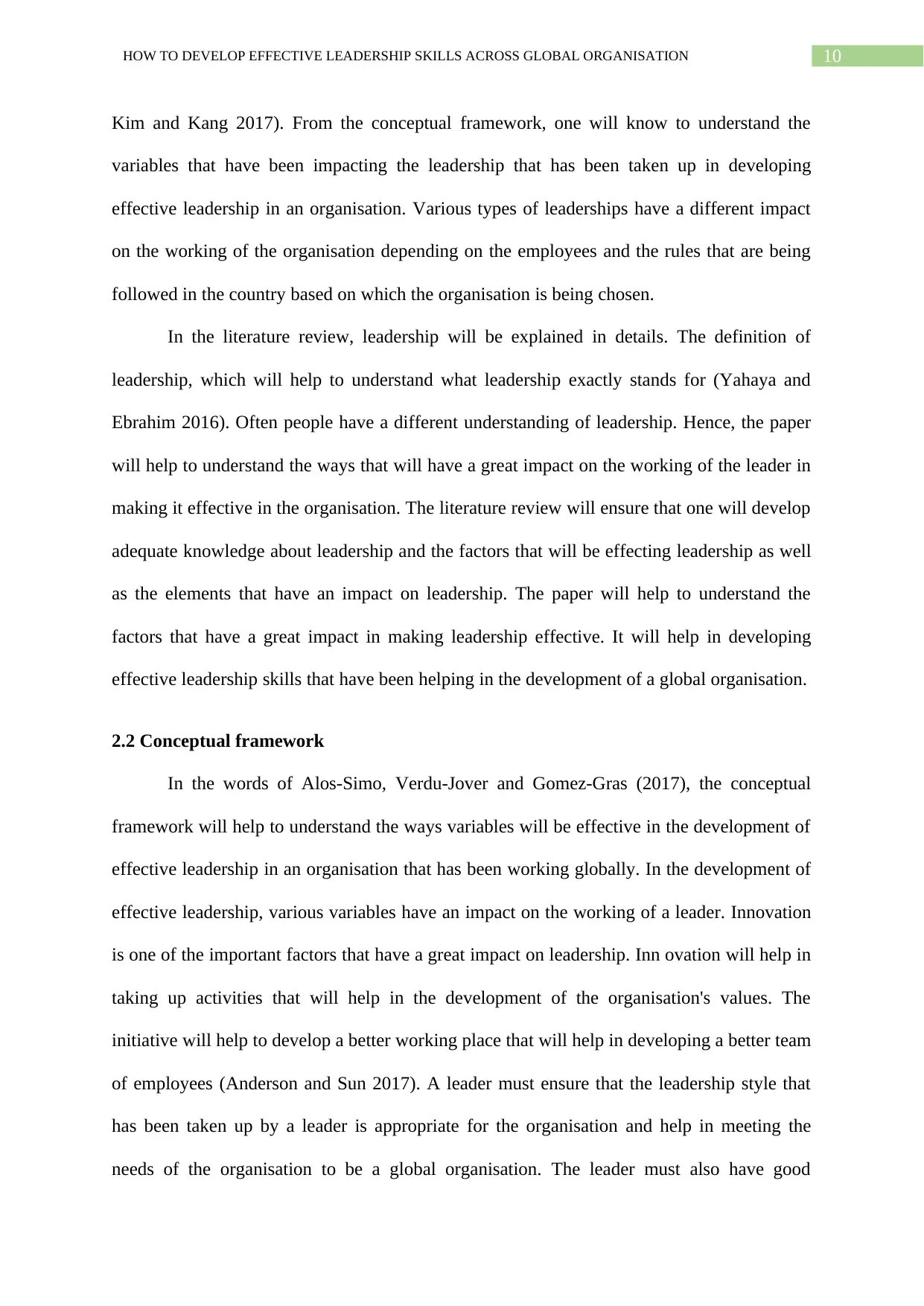
10HOW TO DEVELOP EFFECTIVE LEADERSHIP SKILLS ACROSS GLOBAL ORGANISATION
Kim and Kang 2017). From the conceptual framework, one will know to understand the
variables that have been impacting the leadership that has been taken up in developing
effective leadership in an organisation. Various types of leaderships have a different impact
on the working of the organisation depending on the employees and the rules that are being
followed in the country based on which the organisation is being chosen.
In the literature review, leadership will be explained in details. The definition of
leadership, which will help to understand what leadership exactly stands for (Yahaya and
Ebrahim 2016). Often people have a different understanding of leadership. Hence, the paper
will help to understand the ways that will have a great impact on the working of the leader in
making it effective in the organisation. The literature review will ensure that one will develop
adequate knowledge about leadership and the factors that will be effecting leadership as well
as the elements that have an impact on leadership. The paper will help to understand the
factors that have a great impact in making leadership effective. It will help in developing
effective leadership skills that have been helping in the development of a global organisation.
2.2 Conceptual framework
In the words of Alos-Simo, Verdu-Jover and Gomez-Gras (2017), the conceptual
framework will help to understand the ways variables will be effective in the development of
effective leadership in an organisation that has been working globally. In the development of
effective leadership, various variables have an impact on the working of a leader. Innovation
is one of the important factors that have a great impact on leadership. Inn ovation will help in
taking up activities that will help in the development of the organisation's values. The
initiative will help to develop a better working place that will help in developing a better team
of employees (Anderson and Sun 2017). A leader must ensure that the leadership style that
has been taken up by a leader is appropriate for the organisation and help in meeting the
needs of the organisation to be a global organisation. The leader must also have good
Kim and Kang 2017). From the conceptual framework, one will know to understand the
variables that have been impacting the leadership that has been taken up in developing
effective leadership in an organisation. Various types of leaderships have a different impact
on the working of the organisation depending on the employees and the rules that are being
followed in the country based on which the organisation is being chosen.
In the literature review, leadership will be explained in details. The definition of
leadership, which will help to understand what leadership exactly stands for (Yahaya and
Ebrahim 2016). Often people have a different understanding of leadership. Hence, the paper
will help to understand the ways that will have a great impact on the working of the leader in
making it effective in the organisation. The literature review will ensure that one will develop
adequate knowledge about leadership and the factors that will be effecting leadership as well
as the elements that have an impact on leadership. The paper will help to understand the
factors that have a great impact in making leadership effective. It will help in developing
effective leadership skills that have been helping in the development of a global organisation.
2.2 Conceptual framework
In the words of Alos-Simo, Verdu-Jover and Gomez-Gras (2017), the conceptual
framework will help to understand the ways variables will be effective in the development of
effective leadership in an organisation that has been working globally. In the development of
effective leadership, various variables have an impact on the working of a leader. Innovation
is one of the important factors that have a great impact on leadership. Inn ovation will help in
taking up activities that will help in the development of the organisation's values. The
initiative will help to develop a better working place that will help in developing a better team
of employees (Anderson and Sun 2017). A leader must ensure that the leadership style that
has been taken up by a leader is appropriate for the organisation and help in meeting the
needs of the organisation to be a global organisation. The leader must also have good
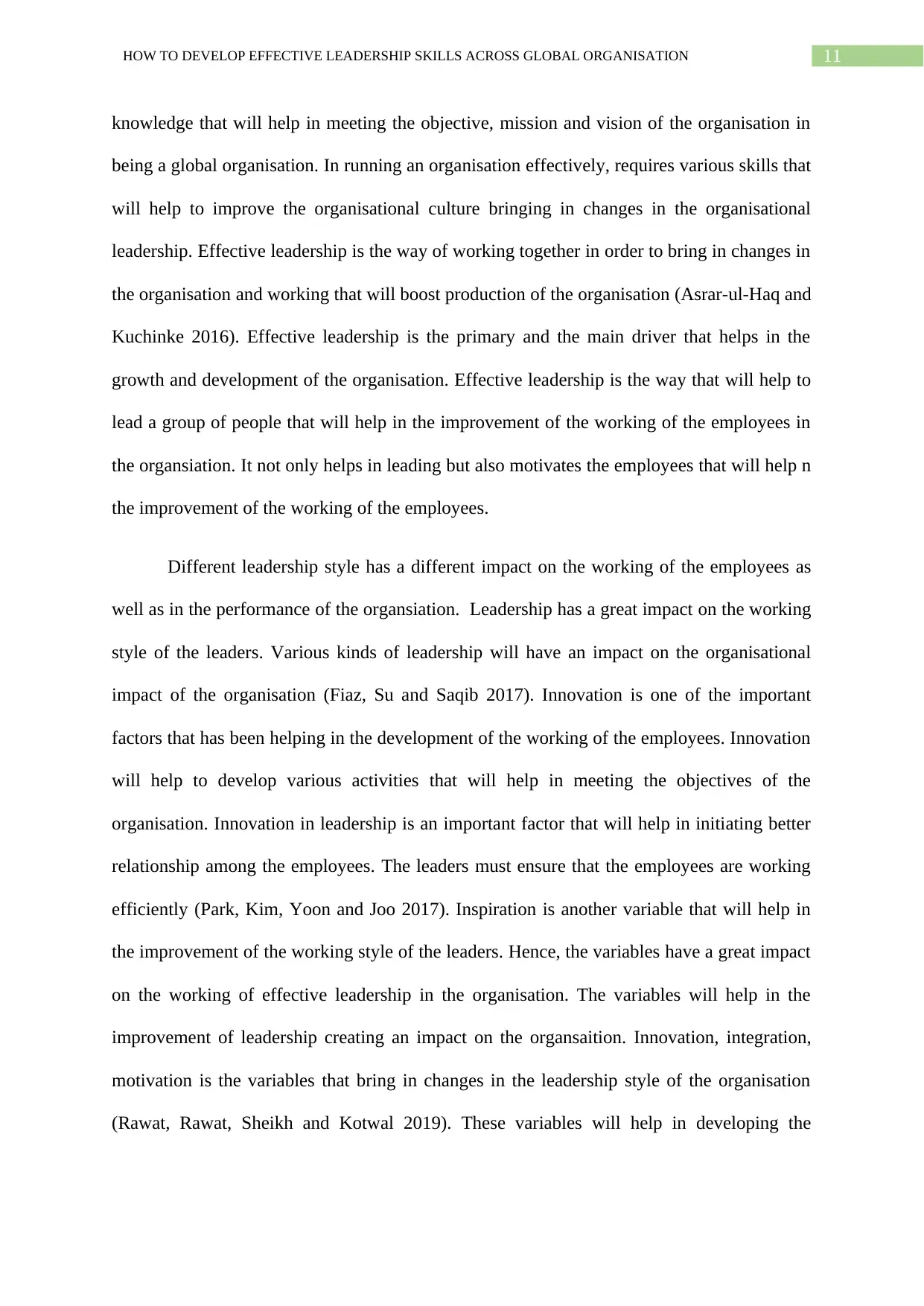
11HOW TO DEVELOP EFFECTIVE LEADERSHIP SKILLS ACROSS GLOBAL ORGANISATION
knowledge that will help in meeting the objective, mission and vision of the organisation in
being a global organisation. In running an organisation effectively, requires various skills that
will help to improve the organisational culture bringing in changes in the organisational
leadership. Effective leadership is the way of working together in order to bring in changes in
the organisation and working that will boost production of the organisation (Asrar-ul-Haq and
Kuchinke 2016). Effective leadership is the primary and the main driver that helps in the
growth and development of the organisation. Effective leadership is the way that will help to
lead a group of people that will help in the improvement of the working of the employees in
the organsiation. It not only helps in leading but also motivates the employees that will help n
the improvement of the working of the employees.
Different leadership style has a different impact on the working of the employees as
well as in the performance of the organsiation. Leadership has a great impact on the working
style of the leaders. Various kinds of leadership will have an impact on the organisational
impact of the organisation (Fiaz, Su and Saqib 2017). Innovation is one of the important
factors that has been helping in the development of the working of the employees. Innovation
will help to develop various activities that will help in meeting the objectives of the
organisation. Innovation in leadership is an important factor that will help in initiating better
relationship among the employees. The leaders must ensure that the employees are working
efficiently (Park, Kim, Yoon and Joo 2017). Inspiration is another variable that will help in
the improvement of the working style of the leaders. Hence, the variables have a great impact
on the working of effective leadership in the organisation. The variables will help in the
improvement of leadership creating an impact on the organsaition. Innovation, integration,
motivation is the variables that bring in changes in the leadership style of the organisation
(Rawat, Rawat, Sheikh and Kotwal 2019). These variables will help in developing the
knowledge that will help in meeting the objective, mission and vision of the organisation in
being a global organisation. In running an organisation effectively, requires various skills that
will help to improve the organisational culture bringing in changes in the organisational
leadership. Effective leadership is the way of working together in order to bring in changes in
the organisation and working that will boost production of the organisation (Asrar-ul-Haq and
Kuchinke 2016). Effective leadership is the primary and the main driver that helps in the
growth and development of the organisation. Effective leadership is the way that will help to
lead a group of people that will help in the improvement of the working of the employees in
the organsiation. It not only helps in leading but also motivates the employees that will help n
the improvement of the working of the employees.
Different leadership style has a different impact on the working of the employees as
well as in the performance of the organsiation. Leadership has a great impact on the working
style of the leaders. Various kinds of leadership will have an impact on the organisational
impact of the organisation (Fiaz, Su and Saqib 2017). Innovation is one of the important
factors that has been helping in the development of the working of the employees. Innovation
will help to develop various activities that will help in meeting the objectives of the
organisation. Innovation in leadership is an important factor that will help in initiating better
relationship among the employees. The leaders must ensure that the employees are working
efficiently (Park, Kim, Yoon and Joo 2017). Inspiration is another variable that will help in
the improvement of the working style of the leaders. Hence, the variables have a great impact
on the working of effective leadership in the organisation. The variables will help in the
improvement of leadership creating an impact on the organsaition. Innovation, integration,
motivation is the variables that bring in changes in the leadership style of the organisation
(Rawat, Rawat, Sheikh and Kotwal 2019). These variables will help in developing the
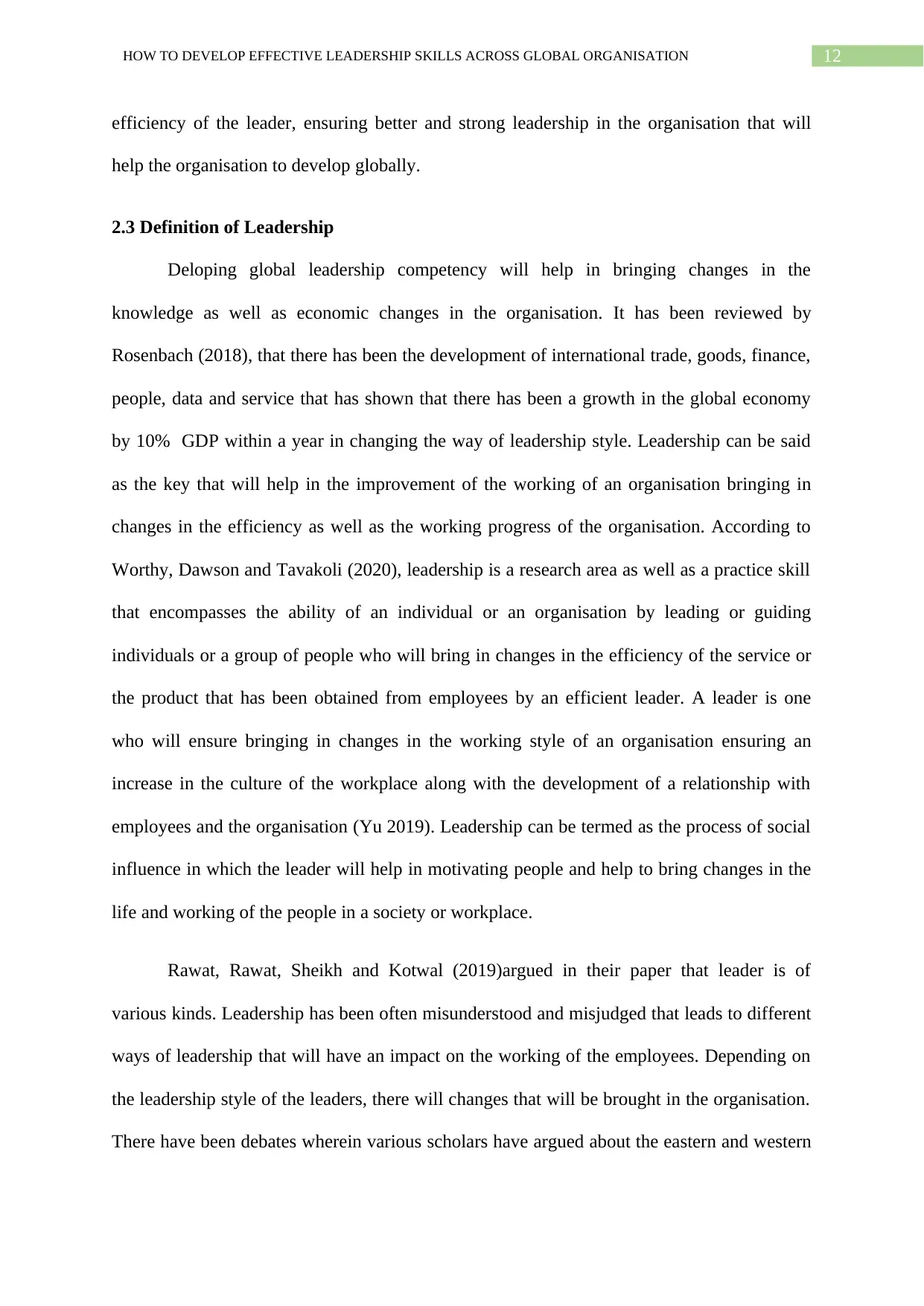
12HOW TO DEVELOP EFFECTIVE LEADERSHIP SKILLS ACROSS GLOBAL ORGANISATION
efficiency of the leader, ensuring better and strong leadership in the organisation that will
help the organisation to develop globally.
2.3 Definition of Leadership
Deloping global leadership competency will help in bringing changes in the
knowledge as well as economic changes in the organisation. It has been reviewed by
Rosenbach (2018), that there has been the development of international trade, goods, finance,
people, data and service that has shown that there has been a growth in the global economy
by 10% GDP within a year in changing the way of leadership style. Leadership can be said
as the key that will help in the improvement of the working of an organisation bringing in
changes in the efficiency as well as the working progress of the organisation. According to
Worthy, Dawson and Tavakoli (2020), leadership is a research area as well as a practice skill
that encompasses the ability of an individual or an organisation by leading or guiding
individuals or a group of people who will bring in changes in the efficiency of the service or
the product that has been obtained from employees by an efficient leader. A leader is one
who will ensure bringing in changes in the working style of an organisation ensuring an
increase in the culture of the workplace along with the development of a relationship with
employees and the organisation (Yu 2019). Leadership can be termed as the process of social
influence in which the leader will help in motivating people and help to bring changes in the
life and working of the people in a society or workplace.
Rawat, Rawat, Sheikh and Kotwal (2019)argued in their paper that leader is of
various kinds. Leadership has been often misunderstood and misjudged that leads to different
ways of leadership that will have an impact on the working of the employees. Depending on
the leadership style of the leaders, there will changes that will be brought in the organisation.
There have been debates wherein various scholars have argued about the eastern and western
efficiency of the leader, ensuring better and strong leadership in the organisation that will
help the organisation to develop globally.
2.3 Definition of Leadership
Deloping global leadership competency will help in bringing changes in the
knowledge as well as economic changes in the organisation. It has been reviewed by
Rosenbach (2018), that there has been the development of international trade, goods, finance,
people, data and service that has shown that there has been a growth in the global economy
by 10% GDP within a year in changing the way of leadership style. Leadership can be said
as the key that will help in the improvement of the working of an organisation bringing in
changes in the efficiency as well as the working progress of the organisation. According to
Worthy, Dawson and Tavakoli (2020), leadership is a research area as well as a practice skill
that encompasses the ability of an individual or an organisation by leading or guiding
individuals or a group of people who will bring in changes in the efficiency of the service or
the product that has been obtained from employees by an efficient leader. A leader is one
who will ensure bringing in changes in the working style of an organisation ensuring an
increase in the culture of the workplace along with the development of a relationship with
employees and the organisation (Yu 2019). Leadership can be termed as the process of social
influence in which the leader will help in motivating people and help to bring changes in the
life and working of the people in a society or workplace.
Rawat, Rawat, Sheikh and Kotwal (2019)argued in their paper that leader is of
various kinds. Leadership has been often misunderstood and misjudged that leads to different
ways of leadership that will have an impact on the working of the employees. Depending on
the leadership style of the leaders, there will changes that will be brought in the organisation.
There have been debates wherein various scholars have argued about the eastern and western
Paraphrase This Document
Need a fresh take? Get an instant paraphrase of this document with our AI Paraphraser
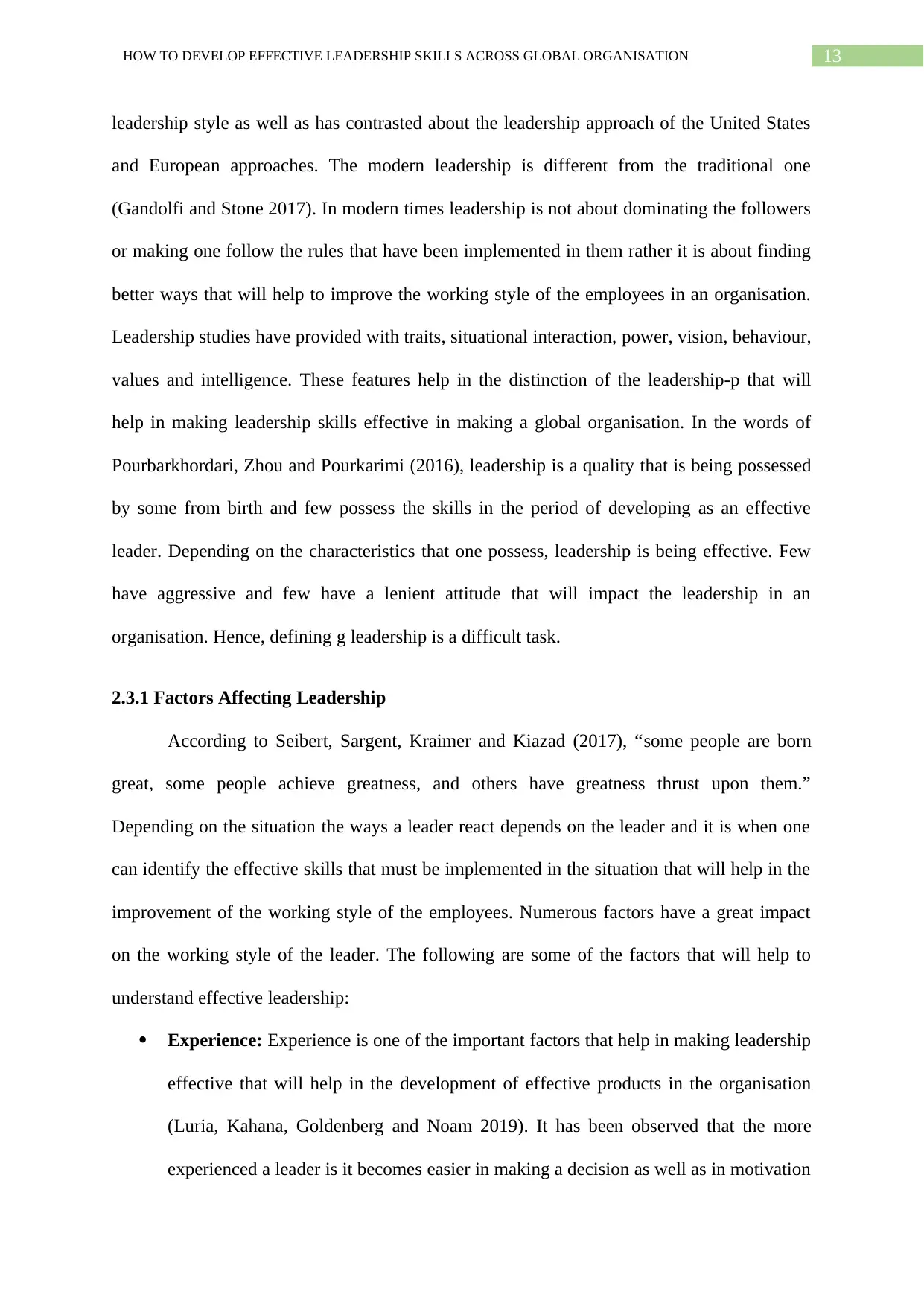
13HOW TO DEVELOP EFFECTIVE LEADERSHIP SKILLS ACROSS GLOBAL ORGANISATION
leadership style as well as has contrasted about the leadership approach of the United States
and European approaches. The modern leadership is different from the traditional one
(Gandolfi and Stone 2017). In modern times leadership is not about dominating the followers
or making one follow the rules that have been implemented in them rather it is about finding
better ways that will help to improve the working style of the employees in an organisation.
Leadership studies have provided with traits, situational interaction, power, vision, behaviour,
values and intelligence. These features help in the distinction of the leadership-p that will
help in making leadership skills effective in making a global organisation. In the words of
Pourbarkhordari, Zhou and Pourkarimi (2016), leadership is a quality that is being possessed
by some from birth and few possess the skills in the period of developing as an effective
leader. Depending on the characteristics that one possess, leadership is being effective. Few
have aggressive and few have a lenient attitude that will impact the leadership in an
organisation. Hence, defining g leadership is a difficult task.
2.3.1 Factors Affecting Leadership
According to Seibert, Sargent, Kraimer and Kiazad (2017), “some people are born
great, some people achieve greatness, and others have greatness thrust upon them.”
Depending on the situation the ways a leader react depends on the leader and it is when one
can identify the effective skills that must be implemented in the situation that will help in the
improvement of the working style of the employees. Numerous factors have a great impact
on the working style of the leader. The following are some of the factors that will help to
understand effective leadership:
Experience: Experience is one of the important factors that help in making leadership
effective that will help in the development of effective products in the organisation
(Luria, Kahana, Goldenberg and Noam 2019). It has been observed that the more
experienced a leader is it becomes easier in making a decision as well as in motivation
leadership style as well as has contrasted about the leadership approach of the United States
and European approaches. The modern leadership is different from the traditional one
(Gandolfi and Stone 2017). In modern times leadership is not about dominating the followers
or making one follow the rules that have been implemented in them rather it is about finding
better ways that will help to improve the working style of the employees in an organisation.
Leadership studies have provided with traits, situational interaction, power, vision, behaviour,
values and intelligence. These features help in the distinction of the leadership-p that will
help in making leadership skills effective in making a global organisation. In the words of
Pourbarkhordari, Zhou and Pourkarimi (2016), leadership is a quality that is being possessed
by some from birth and few possess the skills in the period of developing as an effective
leader. Depending on the characteristics that one possess, leadership is being effective. Few
have aggressive and few have a lenient attitude that will impact the leadership in an
organisation. Hence, defining g leadership is a difficult task.
2.3.1 Factors Affecting Leadership
According to Seibert, Sargent, Kraimer and Kiazad (2017), “some people are born
great, some people achieve greatness, and others have greatness thrust upon them.”
Depending on the situation the ways a leader react depends on the leader and it is when one
can identify the effective skills that must be implemented in the situation that will help in the
improvement of the working style of the employees. Numerous factors have a great impact
on the working style of the leader. The following are some of the factors that will help to
understand effective leadership:
Experience: Experience is one of the important factors that help in making leadership
effective that will help in the development of effective products in the organisation
(Luria, Kahana, Goldenberg and Noam 2019). It has been observed that the more
experienced a leader is it becomes easier in making a decision as well as in motivation
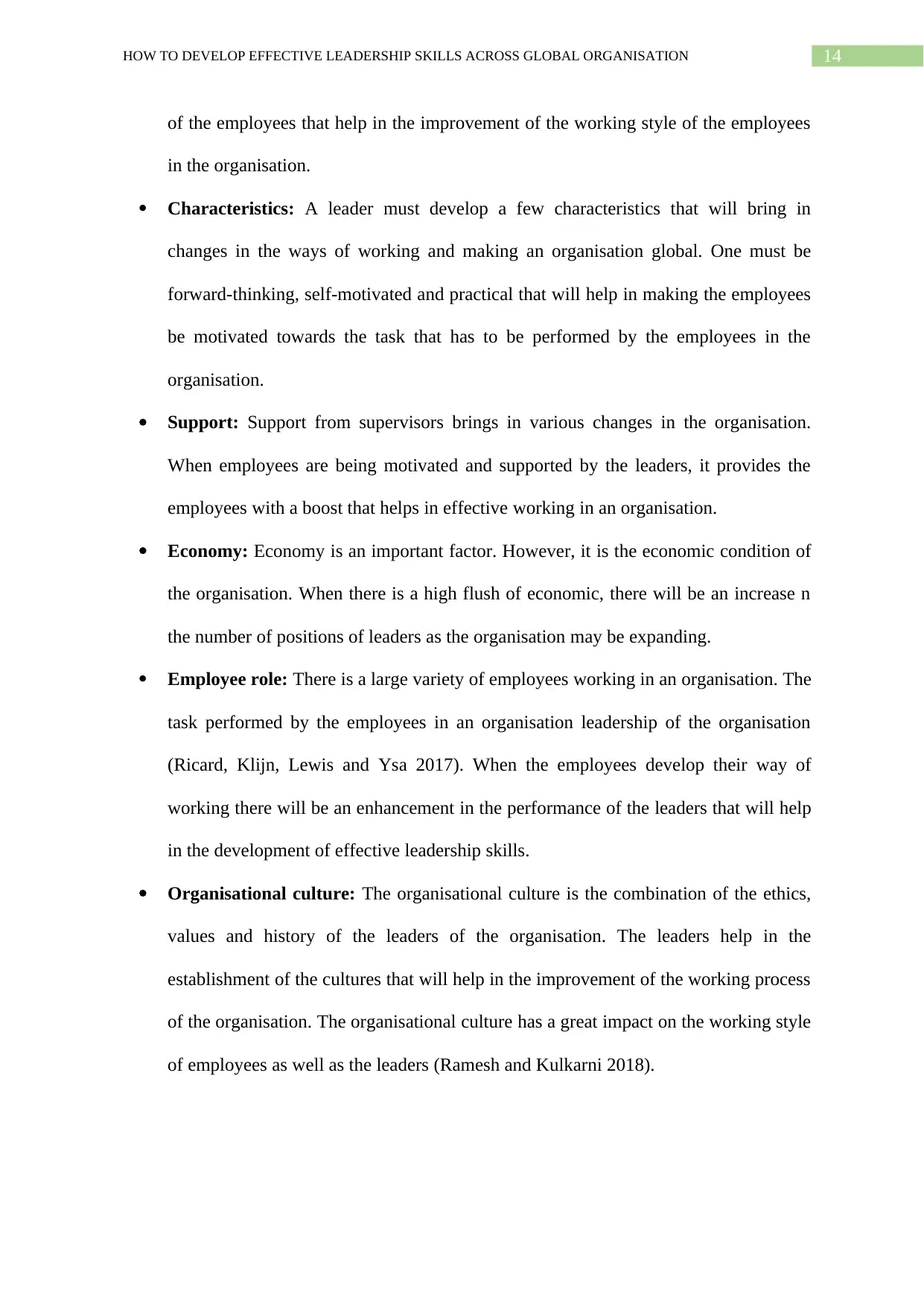
14HOW TO DEVELOP EFFECTIVE LEADERSHIP SKILLS ACROSS GLOBAL ORGANISATION
of the employees that help in the improvement of the working style of the employees
in the organisation.
Characteristics: A leader must develop a few characteristics that will bring in
changes in the ways of working and making an organisation global. One must be
forward-thinking, self-motivated and practical that will help in making the employees
be motivated towards the task that has to be performed by the employees in the
organisation.
Support: Support from supervisors brings in various changes in the organisation.
When employees are being motivated and supported by the leaders, it provides the
employees with a boost that helps in effective working in an organisation.
Economy: Economy is an important factor. However, it is the economic condition of
the organisation. When there is a high flush of economic, there will be an increase n
the number of positions of leaders as the organisation may be expanding.
Employee role: There is a large variety of employees working in an organisation. The
task performed by the employees in an organisation leadership of the organisation
(Ricard, Klijn, Lewis and Ysa 2017). When the employees develop their way of
working there will be an enhancement in the performance of the leaders that will help
in the development of effective leadership skills.
Organisational culture: The organisational culture is the combination of the ethics,
values and history of the leaders of the organisation. The leaders help in the
establishment of the cultures that will help in the improvement of the working process
of the organisation. The organisational culture has a great impact on the working style
of employees as well as the leaders (Ramesh and Kulkarni 2018).
of the employees that help in the improvement of the working style of the employees
in the organisation.
Characteristics: A leader must develop a few characteristics that will bring in
changes in the ways of working and making an organisation global. One must be
forward-thinking, self-motivated and practical that will help in making the employees
be motivated towards the task that has to be performed by the employees in the
organisation.
Support: Support from supervisors brings in various changes in the organisation.
When employees are being motivated and supported by the leaders, it provides the
employees with a boost that helps in effective working in an organisation.
Economy: Economy is an important factor. However, it is the economic condition of
the organisation. When there is a high flush of economic, there will be an increase n
the number of positions of leaders as the organisation may be expanding.
Employee role: There is a large variety of employees working in an organisation. The
task performed by the employees in an organisation leadership of the organisation
(Ricard, Klijn, Lewis and Ysa 2017). When the employees develop their way of
working there will be an enhancement in the performance of the leaders that will help
in the development of effective leadership skills.
Organisational culture: The organisational culture is the combination of the ethics,
values and history of the leaders of the organisation. The leaders help in the
establishment of the cultures that will help in the improvement of the working process
of the organisation. The organisational culture has a great impact on the working style
of employees as well as the leaders (Ramesh and Kulkarni 2018).
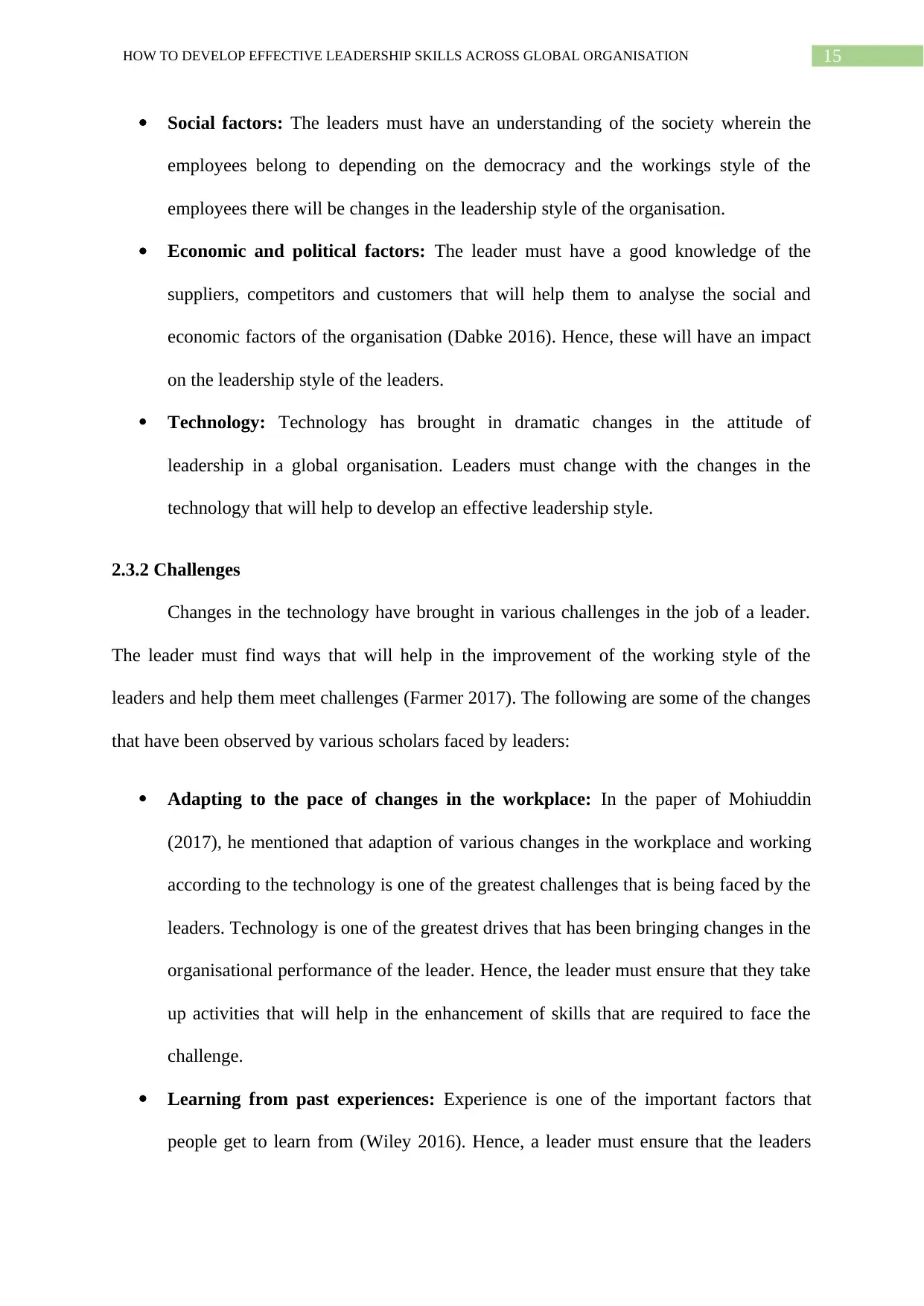
15HOW TO DEVELOP EFFECTIVE LEADERSHIP SKILLS ACROSS GLOBAL ORGANISATION
Social factors: The leaders must have an understanding of the society wherein the
employees belong to depending on the democracy and the workings style of the
employees there will be changes in the leadership style of the organisation.
Economic and political factors: The leader must have a good knowledge of the
suppliers, competitors and customers that will help them to analyse the social and
economic factors of the organisation (Dabke 2016). Hence, these will have an impact
on the leadership style of the leaders.
Technology: Technology has brought in dramatic changes in the attitude of
leadership in a global organisation. Leaders must change with the changes in the
technology that will help to develop an effective leadership style.
2.3.2 Challenges
Changes in the technology have brought in various challenges in the job of a leader.
The leader must find ways that will help in the improvement of the working style of the
leaders and help them meet challenges (Farmer 2017). The following are some of the changes
that have been observed by various scholars faced by leaders:
Adapting to the pace of changes in the workplace: In the paper of Mohiuddin
(2017), he mentioned that adaption of various changes in the workplace and working
according to the technology is one of the greatest challenges that is being faced by the
leaders. Technology is one of the greatest drives that has been bringing changes in the
organisational performance of the leader. Hence, the leader must ensure that they take
up activities that will help in the enhancement of skills that are required to face the
challenge.
Learning from past experiences: Experience is one of the important factors that
people get to learn from (Wiley 2016). Hence, a leader must ensure that the leaders
Social factors: The leaders must have an understanding of the society wherein the
employees belong to depending on the democracy and the workings style of the
employees there will be changes in the leadership style of the organisation.
Economic and political factors: The leader must have a good knowledge of the
suppliers, competitors and customers that will help them to analyse the social and
economic factors of the organisation (Dabke 2016). Hence, these will have an impact
on the leadership style of the leaders.
Technology: Technology has brought in dramatic changes in the attitude of
leadership in a global organisation. Leaders must change with the changes in the
technology that will help to develop an effective leadership style.
2.3.2 Challenges
Changes in the technology have brought in various challenges in the job of a leader.
The leader must find ways that will help in the improvement of the working style of the
leaders and help them meet challenges (Farmer 2017). The following are some of the changes
that have been observed by various scholars faced by leaders:
Adapting to the pace of changes in the workplace: In the paper of Mohiuddin
(2017), he mentioned that adaption of various changes in the workplace and working
according to the technology is one of the greatest challenges that is being faced by the
leaders. Technology is one of the greatest drives that has been bringing changes in the
organisational performance of the leader. Hence, the leader must ensure that they take
up activities that will help in the enhancement of skills that are required to face the
challenge.
Learning from past experiences: Experience is one of the important factors that
people get to learn from (Wiley 2016). Hence, a leader must ensure that the leaders
Secure Best Marks with AI Grader
Need help grading? Try our AI Grader for instant feedback on your assignments.
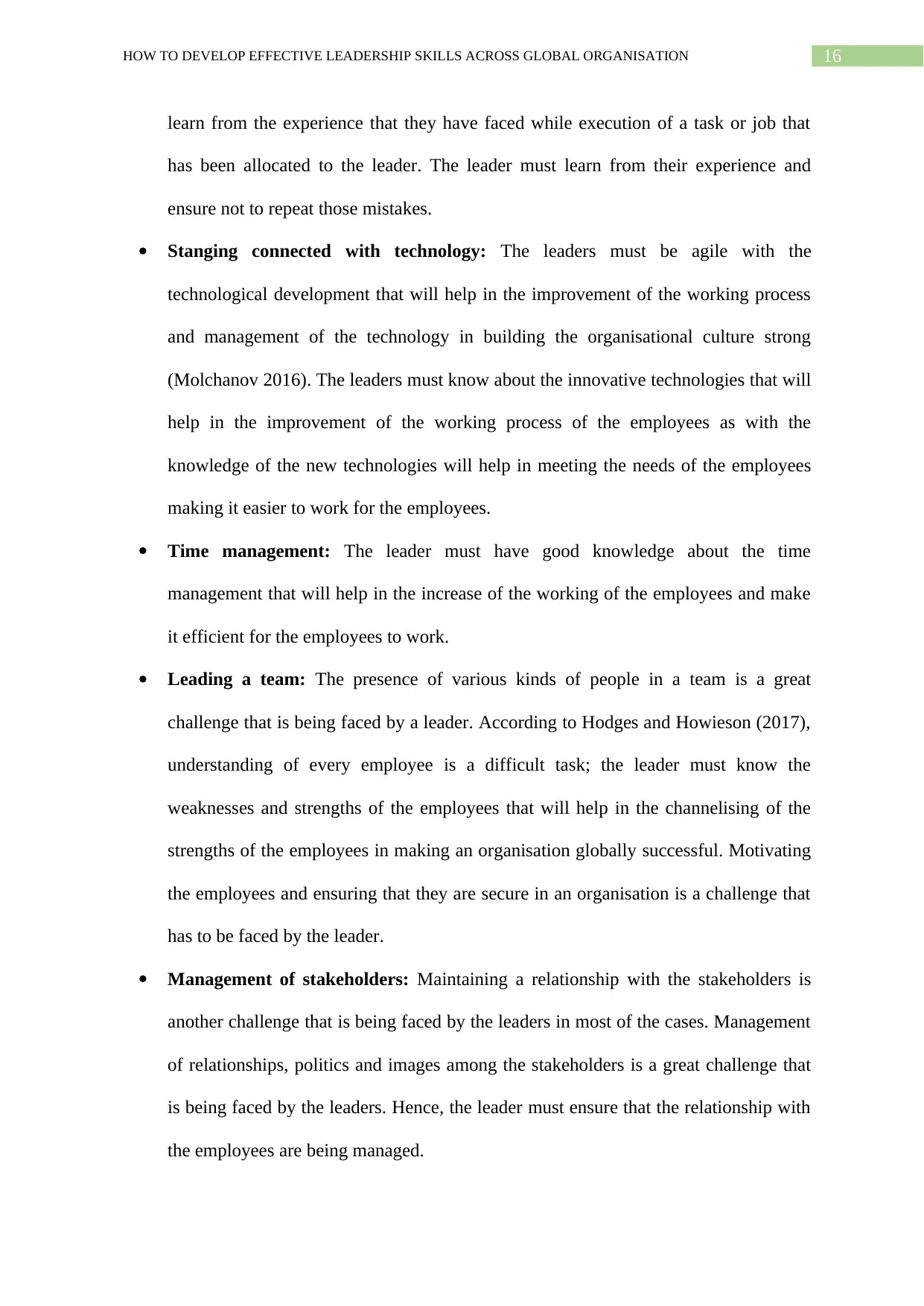
16HOW TO DEVELOP EFFECTIVE LEADERSHIP SKILLS ACROSS GLOBAL ORGANISATION
learn from the experience that they have faced while execution of a task or job that
has been allocated to the leader. The leader must learn from their experience and
ensure not to repeat those mistakes.
Stanging connected with technology: The leaders must be agile with the
technological development that will help in the improvement of the working process
and management of the technology in building the organisational culture strong
(Molchanov 2016). The leaders must know about the innovative technologies that will
help in the improvement of the working process of the employees as with the
knowledge of the new technologies will help in meeting the needs of the employees
making it easier to work for the employees.
Time management: The leader must have good knowledge about the time
management that will help in the increase of the working of the employees and make
it efficient for the employees to work.
Leading a team: The presence of various kinds of people in a team is a great
challenge that is being faced by a leader. According to Hodges and Howieson (2017),
understanding of every employee is a difficult task; the leader must know the
weaknesses and strengths of the employees that will help in the channelising of the
strengths of the employees in making an organisation globally successful. Motivating
the employees and ensuring that they are secure in an organisation is a challenge that
has to be faced by the leader.
Management of stakeholders: Maintaining a relationship with the stakeholders is
another challenge that is being faced by the leaders in most of the cases. Management
of relationships, politics and images among the stakeholders is a great challenge that
is being faced by the leaders. Hence, the leader must ensure that the relationship with
the employees are being managed.
learn from the experience that they have faced while execution of a task or job that
has been allocated to the leader. The leader must learn from their experience and
ensure not to repeat those mistakes.
Stanging connected with technology: The leaders must be agile with the
technological development that will help in the improvement of the working process
and management of the technology in building the organisational culture strong
(Molchanov 2016). The leaders must know about the innovative technologies that will
help in the improvement of the working process of the employees as with the
knowledge of the new technologies will help in meeting the needs of the employees
making it easier to work for the employees.
Time management: The leader must have good knowledge about the time
management that will help in the increase of the working of the employees and make
it efficient for the employees to work.
Leading a team: The presence of various kinds of people in a team is a great
challenge that is being faced by a leader. According to Hodges and Howieson (2017),
understanding of every employee is a difficult task; the leader must know the
weaknesses and strengths of the employees that will help in the channelising of the
strengths of the employees in making an organisation globally successful. Motivating
the employees and ensuring that they are secure in an organisation is a challenge that
has to be faced by the leader.
Management of stakeholders: Maintaining a relationship with the stakeholders is
another challenge that is being faced by the leaders in most of the cases. Management
of relationships, politics and images among the stakeholders is a great challenge that
is being faced by the leaders. Hence, the leader must ensure that the relationship with
the employees are being managed.
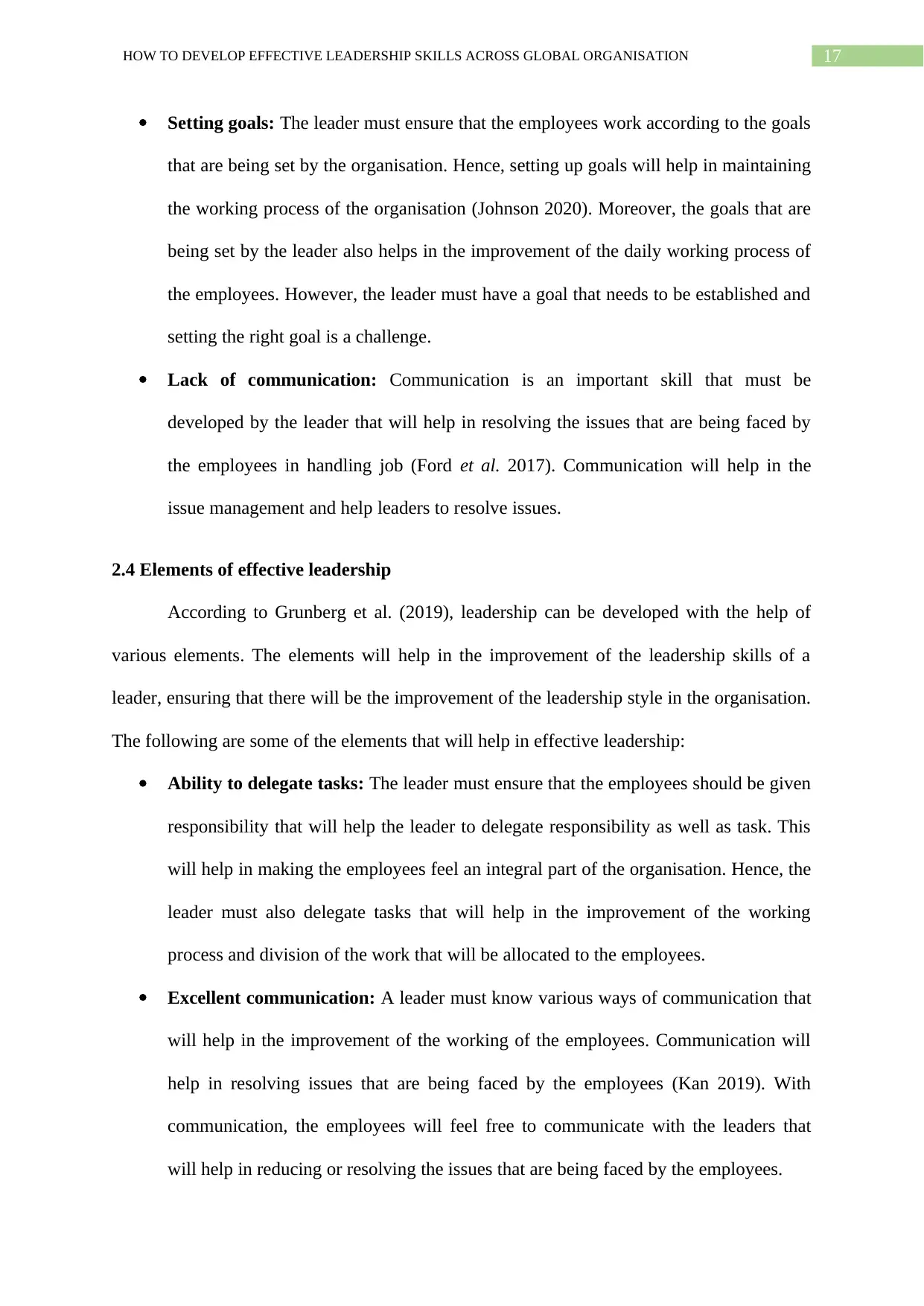
17HOW TO DEVELOP EFFECTIVE LEADERSHIP SKILLS ACROSS GLOBAL ORGANISATION
Setting goals: The leader must ensure that the employees work according to the goals
that are being set by the organisation. Hence, setting up goals will help in maintaining
the working process of the organisation (Johnson 2020). Moreover, the goals that are
being set by the leader also helps in the improvement of the daily working process of
the employees. However, the leader must have a goal that needs to be established and
setting the right goal is a challenge.
Lack of communication: Communication is an important skill that must be
developed by the leader that will help in resolving the issues that are being faced by
the employees in handling job (Ford et al. 2017). Communication will help in the
issue management and help leaders to resolve issues.
2.4 Elements of effective leadership
According to Grunberg et al. (2019), leadership can be developed with the help of
various elements. The elements will help in the improvement of the leadership skills of a
leader, ensuring that there will be the improvement of the leadership style in the organisation.
The following are some of the elements that will help in effective leadership:
Ability to delegate tasks: The leader must ensure that the employees should be given
responsibility that will help the leader to delegate responsibility as well as task. This
will help in making the employees feel an integral part of the organisation. Hence, the
leader must also delegate tasks that will help in the improvement of the working
process and division of the work that will be allocated to the employees.
Excellent communication: A leader must know various ways of communication that
will help in the improvement of the working of the employees. Communication will
help in resolving issues that are being faced by the employees (Kan 2019). With
communication, the employees will feel free to communicate with the leaders that
will help in reducing or resolving the issues that are being faced by the employees.
Setting goals: The leader must ensure that the employees work according to the goals
that are being set by the organisation. Hence, setting up goals will help in maintaining
the working process of the organisation (Johnson 2020). Moreover, the goals that are
being set by the leader also helps in the improvement of the daily working process of
the employees. However, the leader must have a goal that needs to be established and
setting the right goal is a challenge.
Lack of communication: Communication is an important skill that must be
developed by the leader that will help in resolving the issues that are being faced by
the employees in handling job (Ford et al. 2017). Communication will help in the
issue management and help leaders to resolve issues.
2.4 Elements of effective leadership
According to Grunberg et al. (2019), leadership can be developed with the help of
various elements. The elements will help in the improvement of the leadership skills of a
leader, ensuring that there will be the improvement of the leadership style in the organisation.
The following are some of the elements that will help in effective leadership:
Ability to delegate tasks: The leader must ensure that the employees should be given
responsibility that will help the leader to delegate responsibility as well as task. This
will help in making the employees feel an integral part of the organisation. Hence, the
leader must also delegate tasks that will help in the improvement of the working
process and division of the work that will be allocated to the employees.
Excellent communication: A leader must know various ways of communication that
will help in the improvement of the working of the employees. Communication will
help in resolving issues that are being faced by the employees (Kan 2019). With
communication, the employees will feel free to communicate with the leaders that
will help in reducing or resolving the issues that are being faced by the employees.
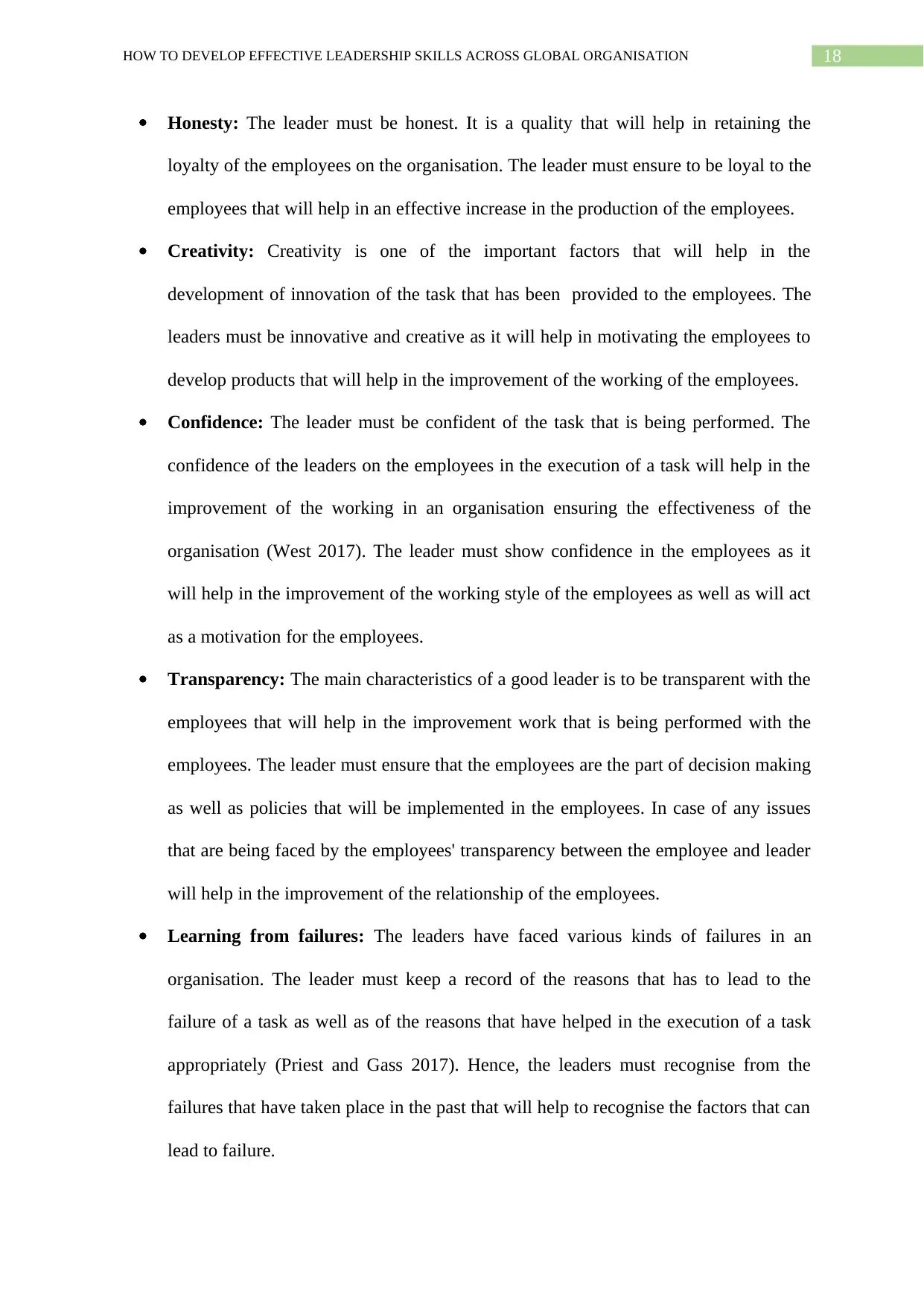
18HOW TO DEVELOP EFFECTIVE LEADERSHIP SKILLS ACROSS GLOBAL ORGANISATION
Honesty: The leader must be honest. It is a quality that will help in retaining the
loyalty of the employees on the organisation. The leader must ensure to be loyal to the
employees that will help in an effective increase in the production of the employees.
Creativity: Creativity is one of the important factors that will help in the
development of innovation of the task that has been provided to the employees. The
leaders must be innovative and creative as it will help in motivating the employees to
develop products that will help in the improvement of the working of the employees.
Confidence: The leader must be confident of the task that is being performed. The
confidence of the leaders on the employees in the execution of a task will help in the
improvement of the working in an organisation ensuring the effectiveness of the
organisation (West 2017). The leader must show confidence in the employees as it
will help in the improvement of the working style of the employees as well as will act
as a motivation for the employees.
Transparency: The main characteristics of a good leader is to be transparent with the
employees that will help in the improvement work that is being performed with the
employees. The leader must ensure that the employees are the part of decision making
as well as policies that will be implemented in the employees. In case of any issues
that are being faced by the employees' transparency between the employee and leader
will help in the improvement of the relationship of the employees.
Learning from failures: The leaders have faced various kinds of failures in an
organisation. The leader must keep a record of the reasons that has to lead to the
failure of a task as well as of the reasons that have helped in the execution of a task
appropriately (Priest and Gass 2017). Hence, the leaders must recognise from the
failures that have taken place in the past that will help to recognise the factors that can
lead to failure.
Honesty: The leader must be honest. It is a quality that will help in retaining the
loyalty of the employees on the organisation. The leader must ensure to be loyal to the
employees that will help in an effective increase in the production of the employees.
Creativity: Creativity is one of the important factors that will help in the
development of innovation of the task that has been provided to the employees. The
leaders must be innovative and creative as it will help in motivating the employees to
develop products that will help in the improvement of the working of the employees.
Confidence: The leader must be confident of the task that is being performed. The
confidence of the leaders on the employees in the execution of a task will help in the
improvement of the working in an organisation ensuring the effectiveness of the
organisation (West 2017). The leader must show confidence in the employees as it
will help in the improvement of the working style of the employees as well as will act
as a motivation for the employees.
Transparency: The main characteristics of a good leader is to be transparent with the
employees that will help in the improvement work that is being performed with the
employees. The leader must ensure that the employees are the part of decision making
as well as policies that will be implemented in the employees. In case of any issues
that are being faced by the employees' transparency between the employee and leader
will help in the improvement of the relationship of the employees.
Learning from failures: The leaders have faced various kinds of failures in an
organisation. The leader must keep a record of the reasons that has to lead to the
failure of a task as well as of the reasons that have helped in the execution of a task
appropriately (Priest and Gass 2017). Hence, the leaders must recognise from the
failures that have taken place in the past that will help to recognise the factors that can
lead to failure.
Paraphrase This Document
Need a fresh take? Get an instant paraphrase of this document with our AI Paraphraser
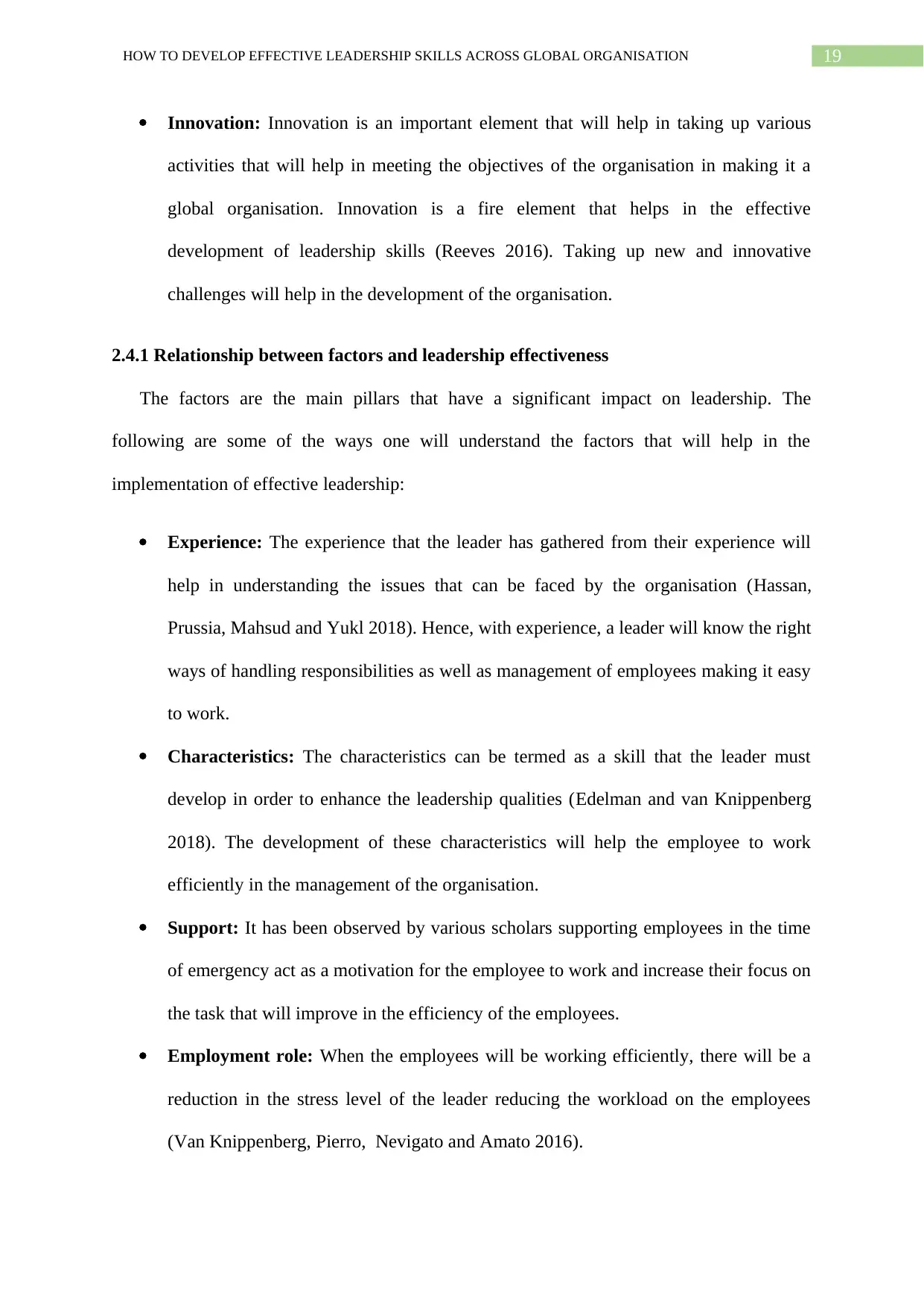
19HOW TO DEVELOP EFFECTIVE LEADERSHIP SKILLS ACROSS GLOBAL ORGANISATION
Innovation: Innovation is an important element that will help in taking up various
activities that will help in meeting the objectives of the organisation in making it a
global organisation. Innovation is a fire element that helps in the effective
development of leadership skills (Reeves 2016). Taking up new and innovative
challenges will help in the development of the organisation.
2.4.1 Relationship between factors and leadership effectiveness
The factors are the main pillars that have a significant impact on leadership. The
following are some of the ways one will understand the factors that will help in the
implementation of effective leadership:
Experience: The experience that the leader has gathered from their experience will
help in understanding the issues that can be faced by the organisation (Hassan,
Prussia, Mahsud and Yukl 2018). Hence, with experience, a leader will know the right
ways of handling responsibilities as well as management of employees making it easy
to work.
Characteristics: The characteristics can be termed as a skill that the leader must
develop in order to enhance the leadership qualities (Edelman and van Knippenberg
2018). The development of these characteristics will help the employee to work
efficiently in the management of the organisation.
Support: It has been observed by various scholars supporting employees in the time
of emergency act as a motivation for the employee to work and increase their focus on
the task that will improve in the efficiency of the employees.
Employment role: When the employees will be working efficiently, there will be a
reduction in the stress level of the leader reducing the workload on the employees
(Van Knippenberg, Pierro, Nevigato and Amato 2016).
Innovation: Innovation is an important element that will help in taking up various
activities that will help in meeting the objectives of the organisation in making it a
global organisation. Innovation is a fire element that helps in the effective
development of leadership skills (Reeves 2016). Taking up new and innovative
challenges will help in the development of the organisation.
2.4.1 Relationship between factors and leadership effectiveness
The factors are the main pillars that have a significant impact on leadership. The
following are some of the ways one will understand the factors that will help in the
implementation of effective leadership:
Experience: The experience that the leader has gathered from their experience will
help in understanding the issues that can be faced by the organisation (Hassan,
Prussia, Mahsud and Yukl 2018). Hence, with experience, a leader will know the right
ways of handling responsibilities as well as management of employees making it easy
to work.
Characteristics: The characteristics can be termed as a skill that the leader must
develop in order to enhance the leadership qualities (Edelman and van Knippenberg
2018). The development of these characteristics will help the employee to work
efficiently in the management of the organisation.
Support: It has been observed by various scholars supporting employees in the time
of emergency act as a motivation for the employee to work and increase their focus on
the task that will improve in the efficiency of the employees.
Employment role: When the employees will be working efficiently, there will be a
reduction in the stress level of the leader reducing the workload on the employees
(Van Knippenberg, Pierro, Nevigato and Amato 2016).
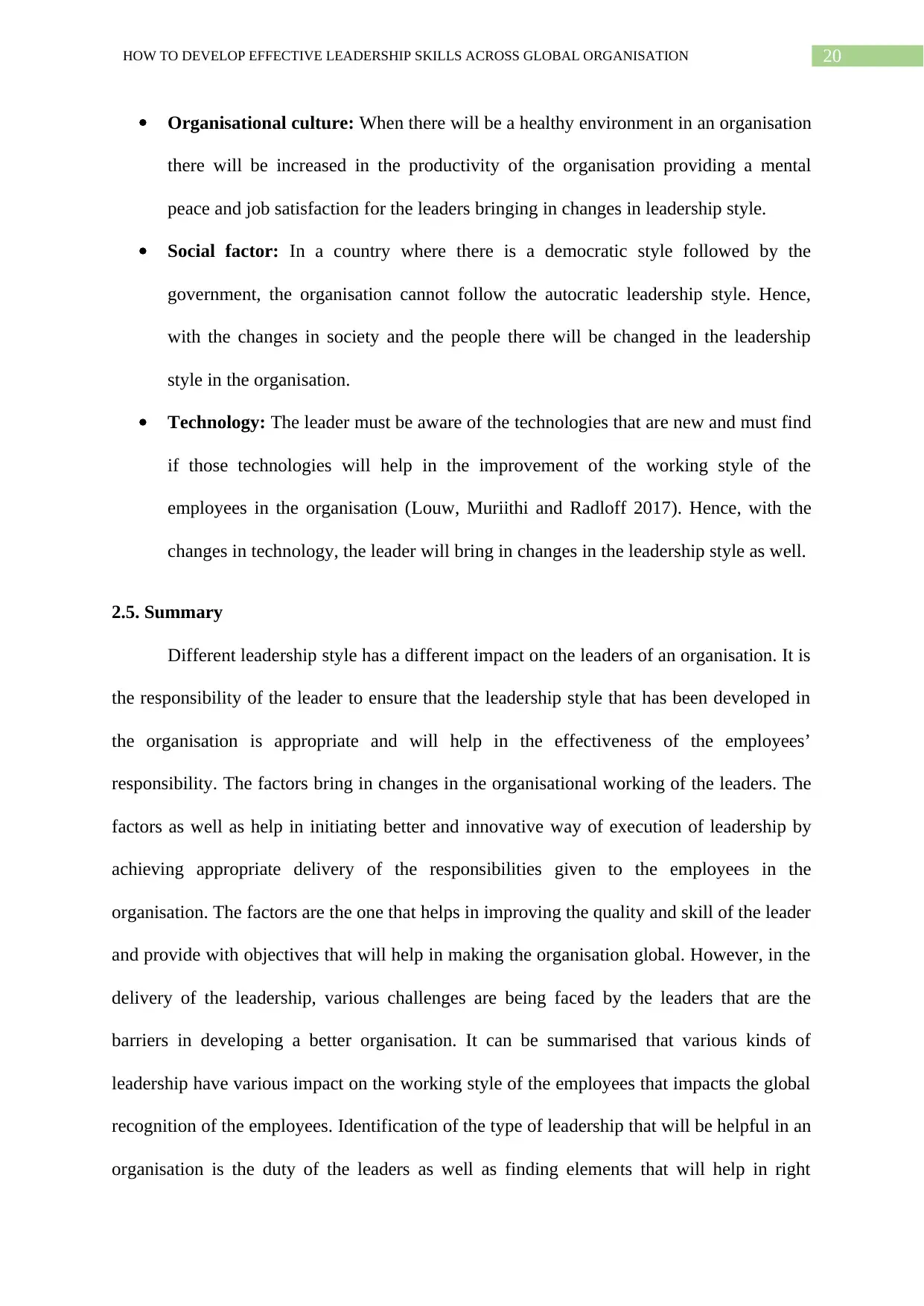
20HOW TO DEVELOP EFFECTIVE LEADERSHIP SKILLS ACROSS GLOBAL ORGANISATION
Organisational culture: When there will be a healthy environment in an organisation
there will be increased in the productivity of the organisation providing a mental
peace and job satisfaction for the leaders bringing in changes in leadership style.
Social factor: In a country where there is a democratic style followed by the
government, the organisation cannot follow the autocratic leadership style. Hence,
with the changes in society and the people there will be changed in the leadership
style in the organisation.
Technology: The leader must be aware of the technologies that are new and must find
if those technologies will help in the improvement of the working style of the
employees in the organisation (Louw, Muriithi and Radloff 2017). Hence, with the
changes in technology, the leader will bring in changes in the leadership style as well.
2.5. Summary
Different leadership style has a different impact on the leaders of an organisation. It is
the responsibility of the leader to ensure that the leadership style that has been developed in
the organisation is appropriate and will help in the effectiveness of the employees’
responsibility. The factors bring in changes in the organisational working of the leaders. The
factors as well as help in initiating better and innovative way of execution of leadership by
achieving appropriate delivery of the responsibilities given to the employees in the
organisation. The factors are the one that helps in improving the quality and skill of the leader
and provide with objectives that will help in making the organisation global. However, in the
delivery of the leadership, various challenges are being faced by the leaders that are the
barriers in developing a better organisation. It can be summarised that various kinds of
leadership have various impact on the working style of the employees that impacts the global
recognition of the employees. Identification of the type of leadership that will be helpful in an
organisation is the duty of the leaders as well as finding elements that will help in right
Organisational culture: When there will be a healthy environment in an organisation
there will be increased in the productivity of the organisation providing a mental
peace and job satisfaction for the leaders bringing in changes in leadership style.
Social factor: In a country where there is a democratic style followed by the
government, the organisation cannot follow the autocratic leadership style. Hence,
with the changes in society and the people there will be changed in the leadership
style in the organisation.
Technology: The leader must be aware of the technologies that are new and must find
if those technologies will help in the improvement of the working style of the
employees in the organisation (Louw, Muriithi and Radloff 2017). Hence, with the
changes in technology, the leader will bring in changes in the leadership style as well.
2.5. Summary
Different leadership style has a different impact on the leaders of an organisation. It is
the responsibility of the leader to ensure that the leadership style that has been developed in
the organisation is appropriate and will help in the effectiveness of the employees’
responsibility. The factors bring in changes in the organisational working of the leaders. The
factors as well as help in initiating better and innovative way of execution of leadership by
achieving appropriate delivery of the responsibilities given to the employees in the
organisation. The factors are the one that helps in improving the quality and skill of the leader
and provide with objectives that will help in making the organisation global. However, in the
delivery of the leadership, various challenges are being faced by the leaders that are the
barriers in developing a better organisation. It can be summarised that various kinds of
leadership have various impact on the working style of the employees that impacts the global
recognition of the employees. Identification of the type of leadership that will be helpful in an
organisation is the duty of the leaders as well as finding elements that will help in right
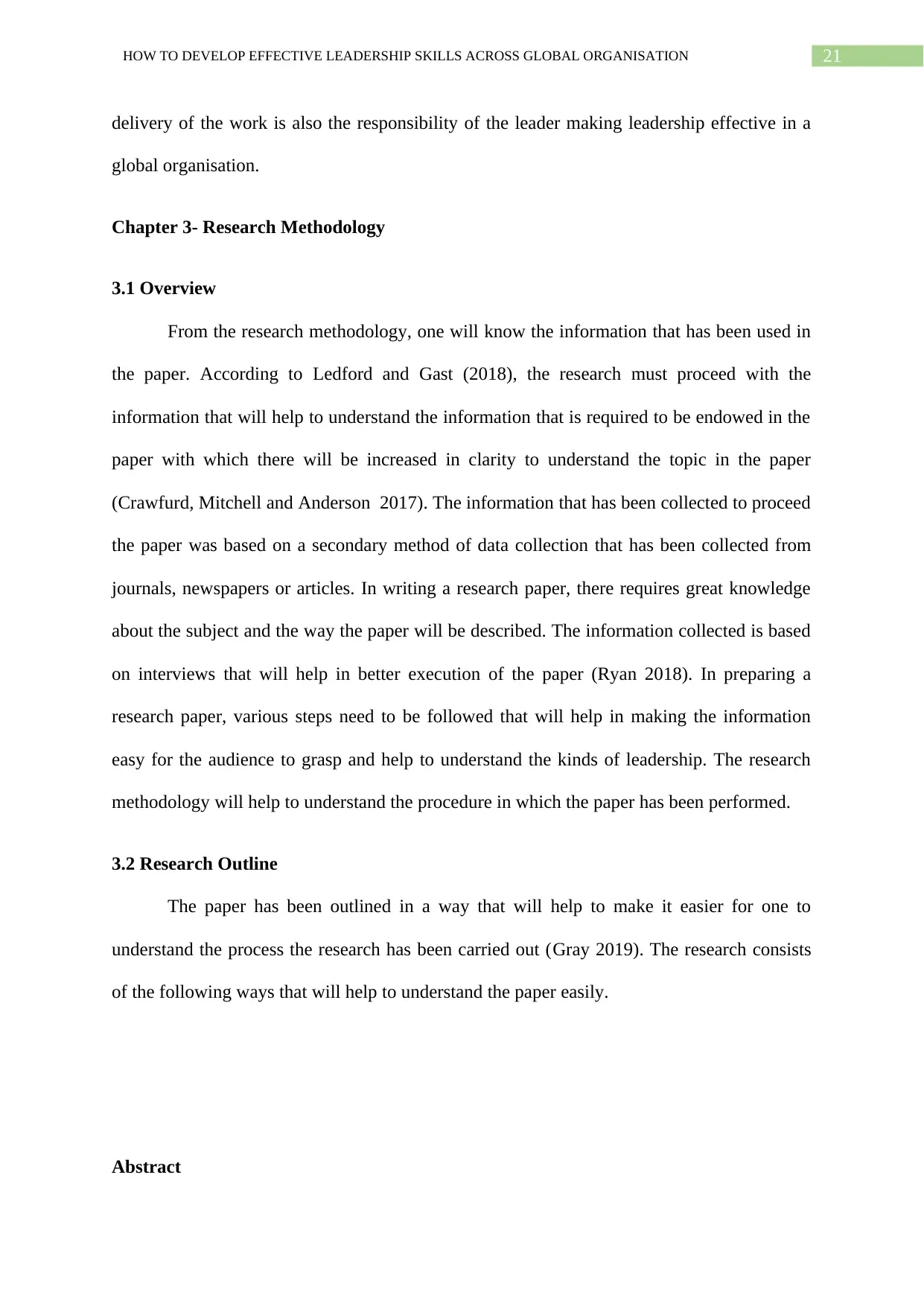
21HOW TO DEVELOP EFFECTIVE LEADERSHIP SKILLS ACROSS GLOBAL ORGANISATION
delivery of the work is also the responsibility of the leader making leadership effective in a
global organisation.
Chapter 3- Research Methodology
3.1 Overview
From the research methodology, one will know the information that has been used in
the paper. According to Ledford and Gast (2018), the research must proceed with the
information that will help to understand the information that is required to be endowed in the
paper with which there will be increased in clarity to understand the topic in the paper
(Crawfurd, Mitchell and Anderson 2017). The information that has been collected to proceed
the paper was based on a secondary method of data collection that has been collected from
journals, newspapers or articles. In writing a research paper, there requires great knowledge
about the subject and the way the paper will be described. The information collected is based
on interviews that will help in better execution of the paper (Ryan 2018). In preparing a
research paper, various steps need to be followed that will help in making the information
easy for the audience to grasp and help to understand the kinds of leadership. The research
methodology will help to understand the procedure in which the paper has been performed.
3.2 Research Outline
The paper has been outlined in a way that will help to make it easier for one to
understand the process the research has been carried out (Gray 2019). The research consists
of the following ways that will help to understand the paper easily.
Abstract
delivery of the work is also the responsibility of the leader making leadership effective in a
global organisation.
Chapter 3- Research Methodology
3.1 Overview
From the research methodology, one will know the information that has been used in
the paper. According to Ledford and Gast (2018), the research must proceed with the
information that will help to understand the information that is required to be endowed in the
paper with which there will be increased in clarity to understand the topic in the paper
(Crawfurd, Mitchell and Anderson 2017). The information that has been collected to proceed
the paper was based on a secondary method of data collection that has been collected from
journals, newspapers or articles. In writing a research paper, there requires great knowledge
about the subject and the way the paper will be described. The information collected is based
on interviews that will help in better execution of the paper (Ryan 2018). In preparing a
research paper, various steps need to be followed that will help in making the information
easy for the audience to grasp and help to understand the kinds of leadership. The research
methodology will help to understand the procedure in which the paper has been performed.
3.2 Research Outline
The paper has been outlined in a way that will help to make it easier for one to
understand the process the research has been carried out (Gray 2019). The research consists
of the following ways that will help to understand the paper easily.
Abstract
Secure Best Marks with AI Grader
Need help grading? Try our AI Grader for instant feedback on your assignments.
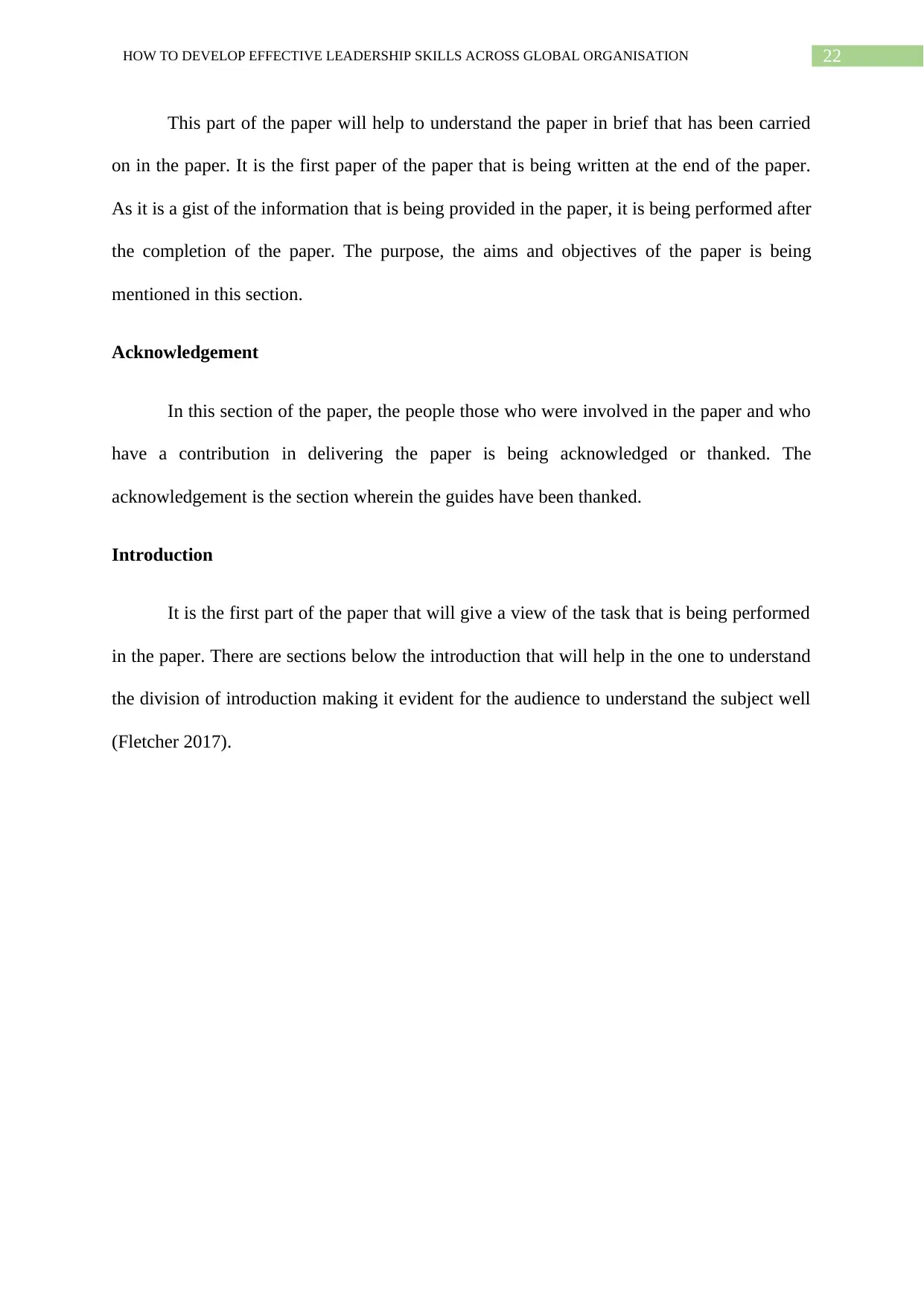
22HOW TO DEVELOP EFFECTIVE LEADERSHIP SKILLS ACROSS GLOBAL ORGANISATION
This part of the paper will help to understand the paper in brief that has been carried
on in the paper. It is the first paper of the paper that is being written at the end of the paper.
As it is a gist of the information that is being provided in the paper, it is being performed after
the completion of the paper. The purpose, the aims and objectives of the paper is being
mentioned in this section.
Acknowledgement
In this section of the paper, the people those who were involved in the paper and who
have a contribution in delivering the paper is being acknowledged or thanked. The
acknowledgement is the section wherein the guides have been thanked.
Introduction
It is the first part of the paper that will give a view of the task that is being performed
in the paper. There are sections below the introduction that will help in the one to understand
the division of introduction making it evident for the audience to understand the subject well
(Fletcher 2017).
This part of the paper will help to understand the paper in brief that has been carried
on in the paper. It is the first paper of the paper that is being written at the end of the paper.
As it is a gist of the information that is being provided in the paper, it is being performed after
the completion of the paper. The purpose, the aims and objectives of the paper is being
mentioned in this section.
Acknowledgement
In this section of the paper, the people those who were involved in the paper and who
have a contribution in delivering the paper is being acknowledged or thanked. The
acknowledgement is the section wherein the guides have been thanked.
Introduction
It is the first part of the paper that will give a view of the task that is being performed
in the paper. There are sections below the introduction that will help in the one to understand
the division of introduction making it evident for the audience to understand the subject well
(Fletcher 2017).
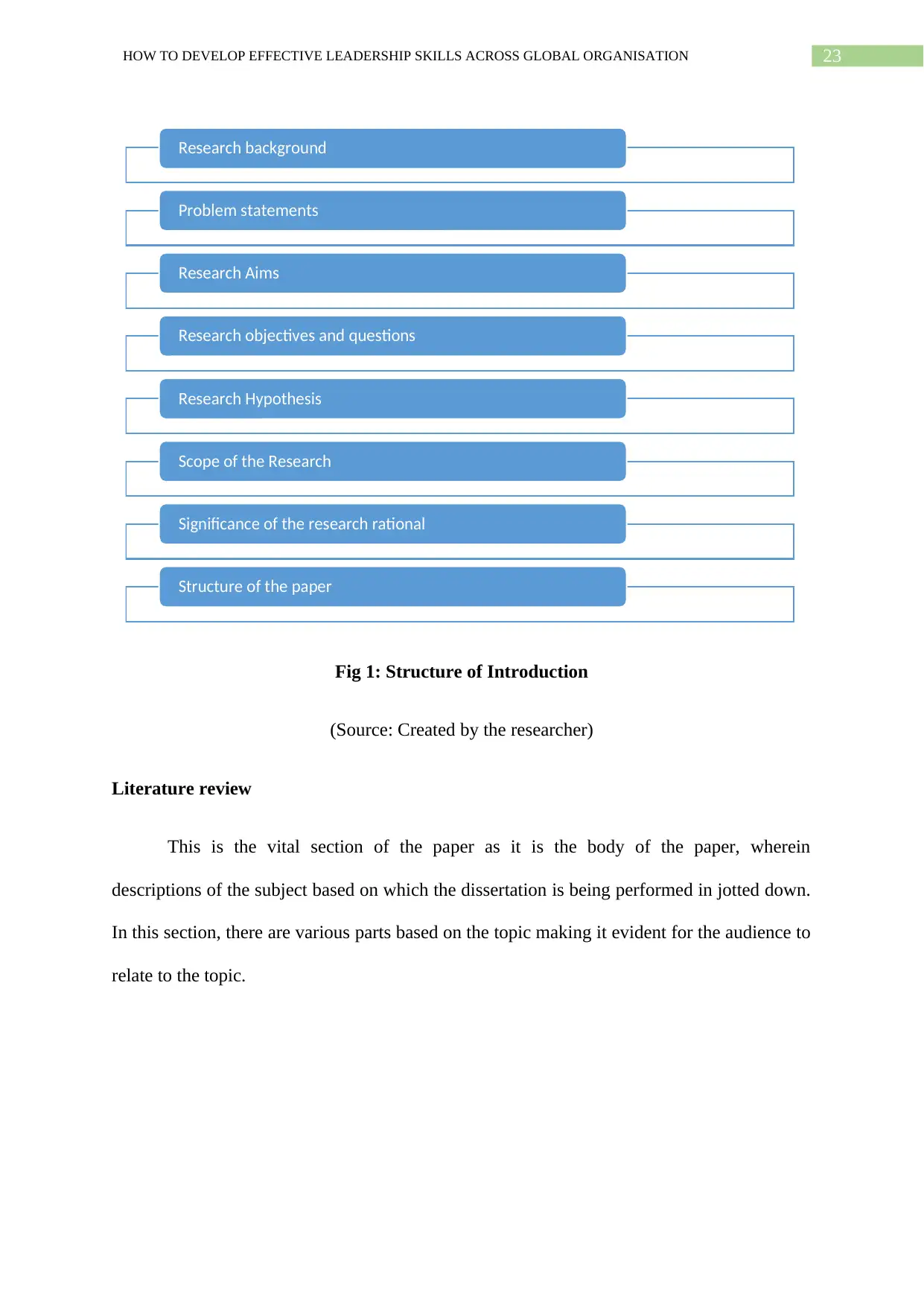
23HOW TO DEVELOP EFFECTIVE LEADERSHIP SKILLS ACROSS GLOBAL ORGANISATION
Fig 1: Structure of Introduction
(Source: Created by the researcher)
Literature review
This is the vital section of the paper as it is the body of the paper, wherein
descriptions of the subject based on which the dissertation is being performed in jotted down.
In this section, there are various parts based on the topic making it evident for the audience to
relate to the topic.
Research background
Problem statements
Research Aims
Research objectives and questions
Research Hypothesis
Scope of the Research
Significance of the research rational
Structure of the paper
Fig 1: Structure of Introduction
(Source: Created by the researcher)
Literature review
This is the vital section of the paper as it is the body of the paper, wherein
descriptions of the subject based on which the dissertation is being performed in jotted down.
In this section, there are various parts based on the topic making it evident for the audience to
relate to the topic.
Research background
Problem statements
Research Aims
Research objectives and questions
Research Hypothesis
Scope of the Research
Significance of the research rational
Structure of the paper
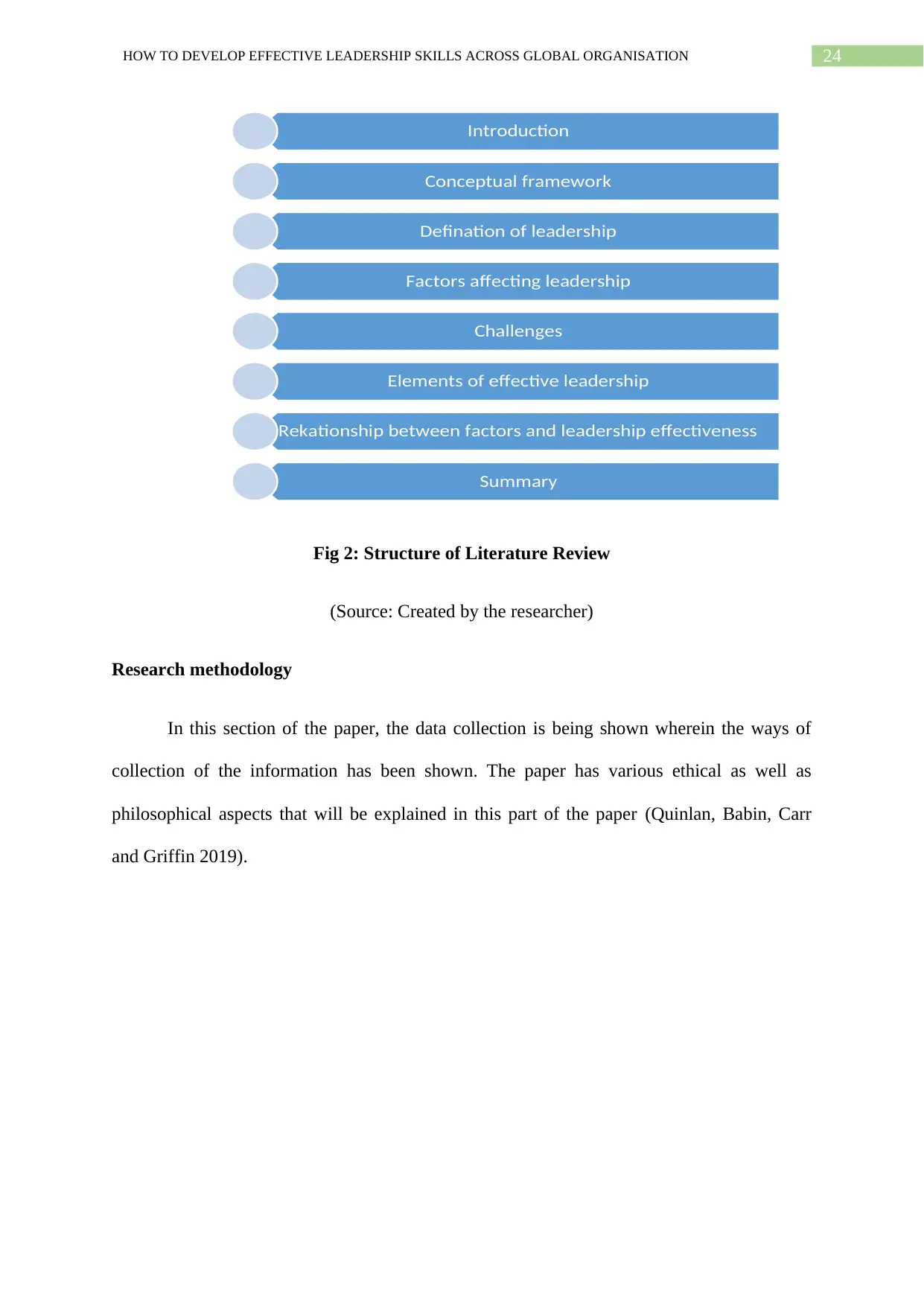
24HOW TO DEVELOP EFFECTIVE LEADERSHIP SKILLS ACROSS GLOBAL ORGANISATION
Fig 2: Structure of Literature Review
(Source: Created by the researcher)
Research methodology
In this section of the paper, the data collection is being shown wherein the ways of
collection of the information has been shown. The paper has various ethical as well as
philosophical aspects that will be explained in this part of the paper (Quinlan, Babin, Carr
and Griffin 2019).
Introduction
Conceptual framework
Defination of leadership
Factors affecting leadership
Challenges
Elements of effective leadership
Rekationship between factors and leadership effectiveness
Summary
Fig 2: Structure of Literature Review
(Source: Created by the researcher)
Research methodology
In this section of the paper, the data collection is being shown wherein the ways of
collection of the information has been shown. The paper has various ethical as well as
philosophical aspects that will be explained in this part of the paper (Quinlan, Babin, Carr
and Griffin 2019).
Introduction
Conceptual framework
Defination of leadership
Factors affecting leadership
Challenges
Elements of effective leadership
Rekationship between factors and leadership effectiveness
Summary
Paraphrase This Document
Need a fresh take? Get an instant paraphrase of this document with our AI Paraphraser
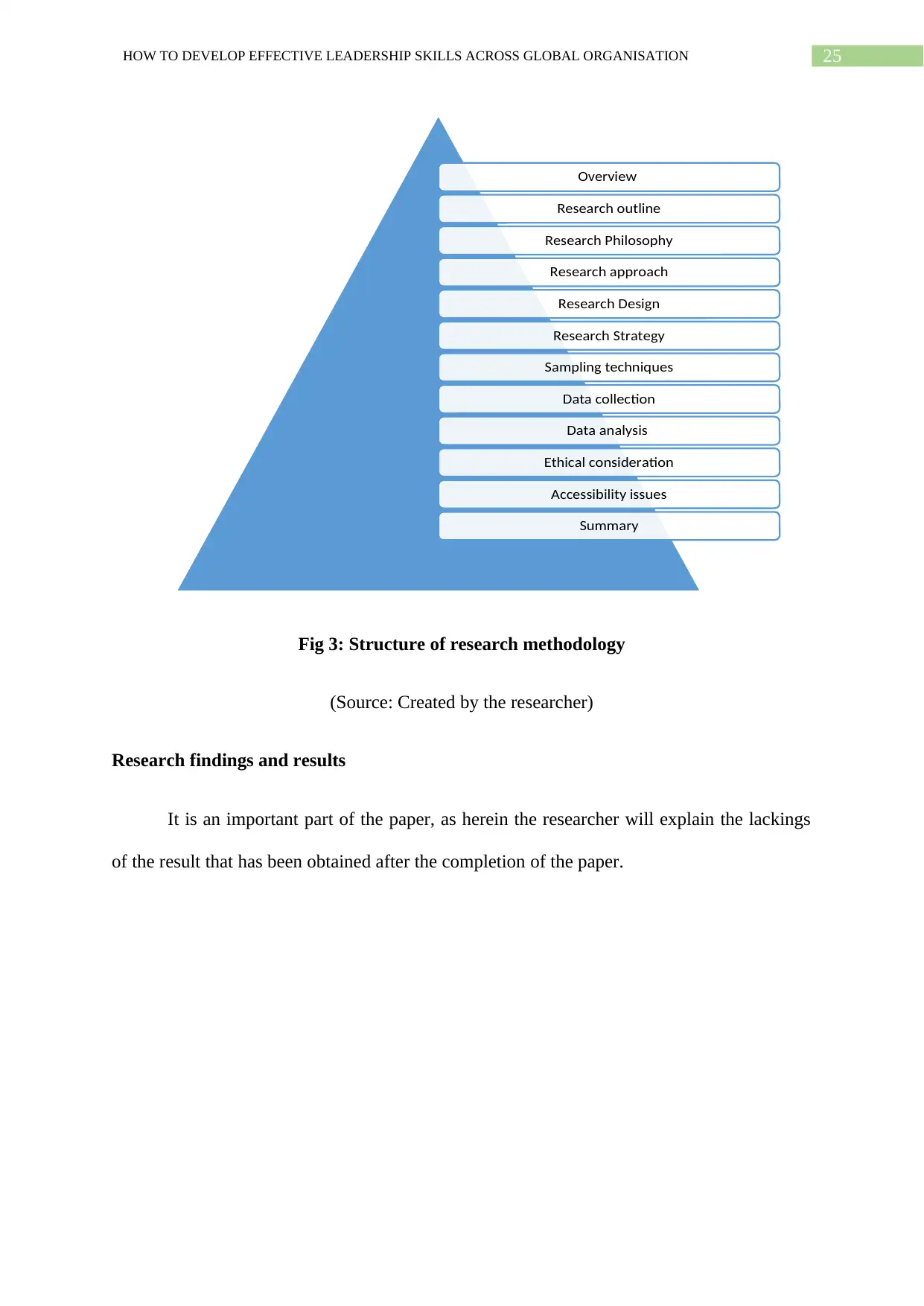
25HOW TO DEVELOP EFFECTIVE LEADERSHIP SKILLS ACROSS GLOBAL ORGANISATION
Fig 3: Structure of research methodology
(Source: Created by the researcher)
Research findings and results
It is an important part of the paper, as herein the researcher will explain the lackings
of the result that has been obtained after the completion of the paper.
Overview
Research outline
Research Philosophy
Research approach
Research Design
Research Strategy
Sampling techniques
Data collection
Data analysis
Ethical consideration
Accessibility issues
Summary
Fig 3: Structure of research methodology
(Source: Created by the researcher)
Research findings and results
It is an important part of the paper, as herein the researcher will explain the lackings
of the result that has been obtained after the completion of the paper.
Overview
Research outline
Research Philosophy
Research approach
Research Design
Research Strategy
Sampling techniques
Data collection
Data analysis
Ethical consideration
Accessibility issues
Summary
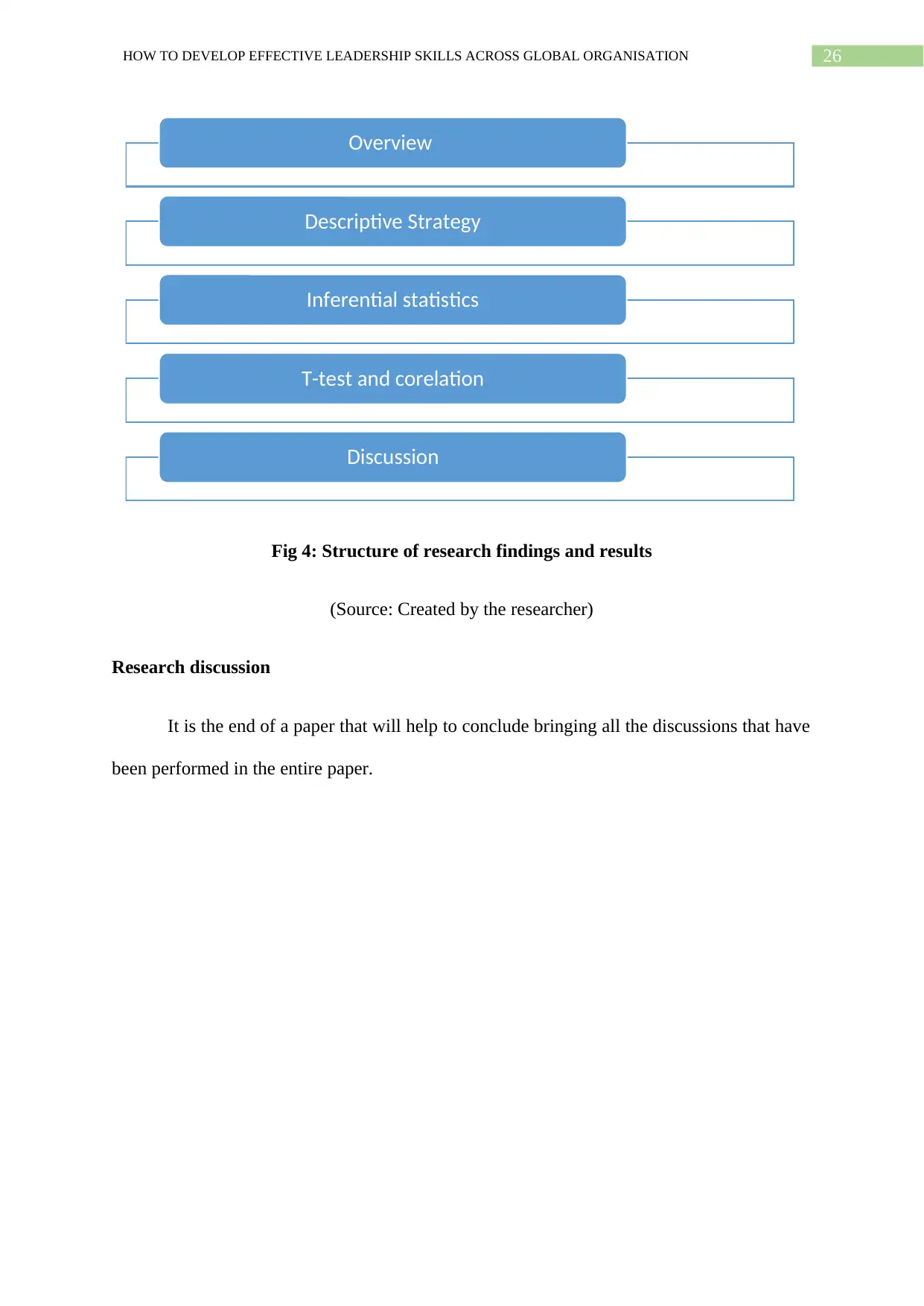
26HOW TO DEVELOP EFFECTIVE LEADERSHIP SKILLS ACROSS GLOBAL ORGANISATION
Fig 4: Structure of research findings and results
(Source: Created by the researcher)
Research discussion
It is the end of a paper that will help to conclude bringing all the discussions that have
been performed in the entire paper.
Overview
Descriptive Strategy
Inferential statistics
T-test and corelation
Discussion
Fig 4: Structure of research findings and results
(Source: Created by the researcher)
Research discussion
It is the end of a paper that will help to conclude bringing all the discussions that have
been performed in the entire paper.
Overview
Descriptive Strategy
Inferential statistics
T-test and corelation
Discussion
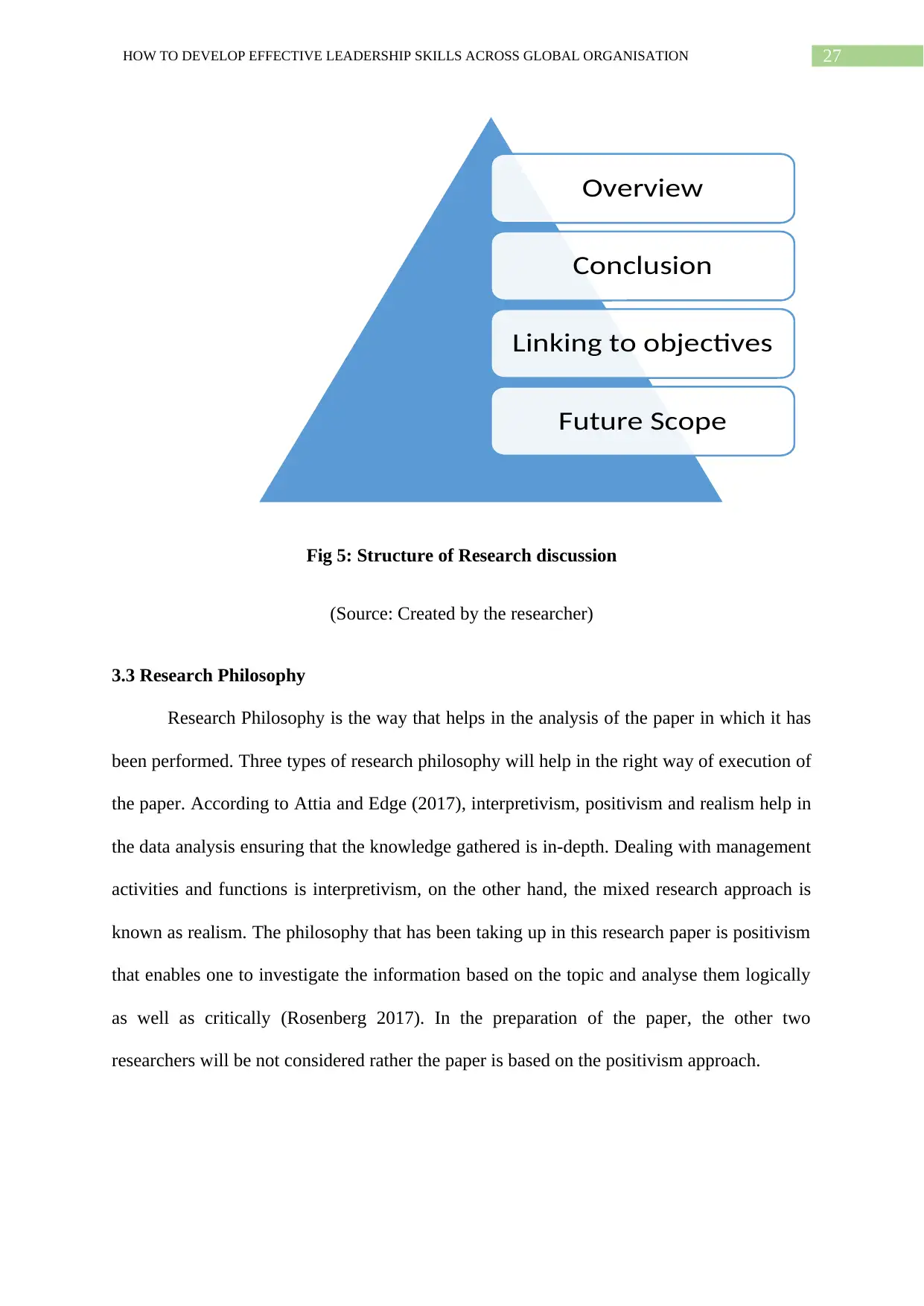
27HOW TO DEVELOP EFFECTIVE LEADERSHIP SKILLS ACROSS GLOBAL ORGANISATION
Fig 5: Structure of Research discussion
(Source: Created by the researcher)
3.3 Research Philosophy
Research Philosophy is the way that helps in the analysis of the paper in which it has
been performed. Three types of research philosophy will help in the right way of execution of
the paper. According to Attia and Edge (2017), interpretivism, positivism and realism help in
the data analysis ensuring that the knowledge gathered is in-depth. Dealing with management
activities and functions is interpretivism, on the other hand, the mixed research approach is
known as realism. The philosophy that has been taking up in this research paper is positivism
that enables one to investigate the information based on the topic and analyse them logically
as well as critically (Rosenberg 2017). In the preparation of the paper, the other two
researchers will be not considered rather the paper is based on the positivism approach.
Overview
Conclusion
Linking to objectives
Future Scope
Fig 5: Structure of Research discussion
(Source: Created by the researcher)
3.3 Research Philosophy
Research Philosophy is the way that helps in the analysis of the paper in which it has
been performed. Three types of research philosophy will help in the right way of execution of
the paper. According to Attia and Edge (2017), interpretivism, positivism and realism help in
the data analysis ensuring that the knowledge gathered is in-depth. Dealing with management
activities and functions is interpretivism, on the other hand, the mixed research approach is
known as realism. The philosophy that has been taking up in this research paper is positivism
that enables one to investigate the information based on the topic and analyse them logically
as well as critically (Rosenberg 2017). In the preparation of the paper, the other two
researchers will be not considered rather the paper is based on the positivism approach.
Overview
Conclusion
Linking to objectives
Future Scope
Secure Best Marks with AI Grader
Need help grading? Try our AI Grader for instant feedback on your assignments.
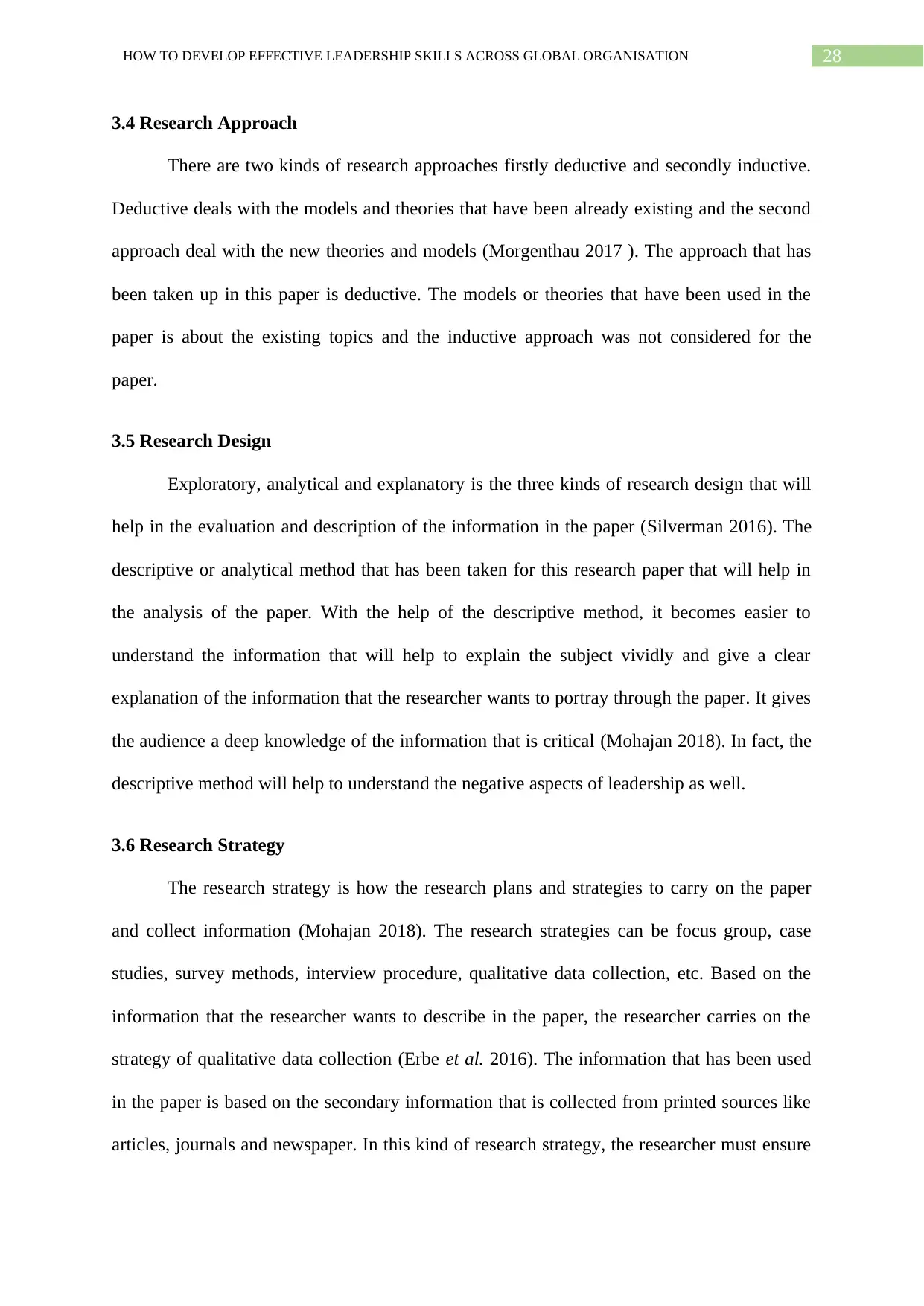
28HOW TO DEVELOP EFFECTIVE LEADERSHIP SKILLS ACROSS GLOBAL ORGANISATION
3.4 Research Approach
There are two kinds of research approaches firstly deductive and secondly inductive.
Deductive deals with the models and theories that have been already existing and the second
approach deal with the new theories and models (Morgenthau 2017 ). The approach that has
been taken up in this paper is deductive. The models or theories that have been used in the
paper is about the existing topics and the inductive approach was not considered for the
paper.
3.5 Research Design
Exploratory, analytical and explanatory is the three kinds of research design that will
help in the evaluation and description of the information in the paper (Silverman 2016). The
descriptive or analytical method that has been taken for this research paper that will help in
the analysis of the paper. With the help of the descriptive method, it becomes easier to
understand the information that will help to explain the subject vividly and give a clear
explanation of the information that the researcher wants to portray through the paper. It gives
the audience a deep knowledge of the information that is critical (Mohajan 2018). In fact, the
descriptive method will help to understand the negative aspects of leadership as well.
3.6 Research Strategy
The research strategy is how the research plans and strategies to carry on the paper
and collect information (Mohajan 2018). The research strategies can be focus group, case
studies, survey methods, interview procedure, qualitative data collection, etc. Based on the
information that the researcher wants to describe in the paper, the researcher carries on the
strategy of qualitative data collection (Erbe et al. 2016). The information that has been used
in the paper is based on the secondary information that is collected from printed sources like
articles, journals and newspaper. In this kind of research strategy, the researcher must ensure
3.4 Research Approach
There are two kinds of research approaches firstly deductive and secondly inductive.
Deductive deals with the models and theories that have been already existing and the second
approach deal with the new theories and models (Morgenthau 2017 ). The approach that has
been taken up in this paper is deductive. The models or theories that have been used in the
paper is about the existing topics and the inductive approach was not considered for the
paper.
3.5 Research Design
Exploratory, analytical and explanatory is the three kinds of research design that will
help in the evaluation and description of the information in the paper (Silverman 2016). The
descriptive or analytical method that has been taken for this research paper that will help in
the analysis of the paper. With the help of the descriptive method, it becomes easier to
understand the information that will help to explain the subject vividly and give a clear
explanation of the information that the researcher wants to portray through the paper. It gives
the audience a deep knowledge of the information that is critical (Mohajan 2018). In fact, the
descriptive method will help to understand the negative aspects of leadership as well.
3.6 Research Strategy
The research strategy is how the research plans and strategies to carry on the paper
and collect information (Mohajan 2018). The research strategies can be focus group, case
studies, survey methods, interview procedure, qualitative data collection, etc. Based on the
information that the researcher wants to describe in the paper, the researcher carries on the
strategy of qualitative data collection (Erbe et al. 2016). The information that has been used
in the paper is based on the secondary information that is collected from printed sources like
articles, journals and newspaper. In this kind of research strategy, the researcher must ensure
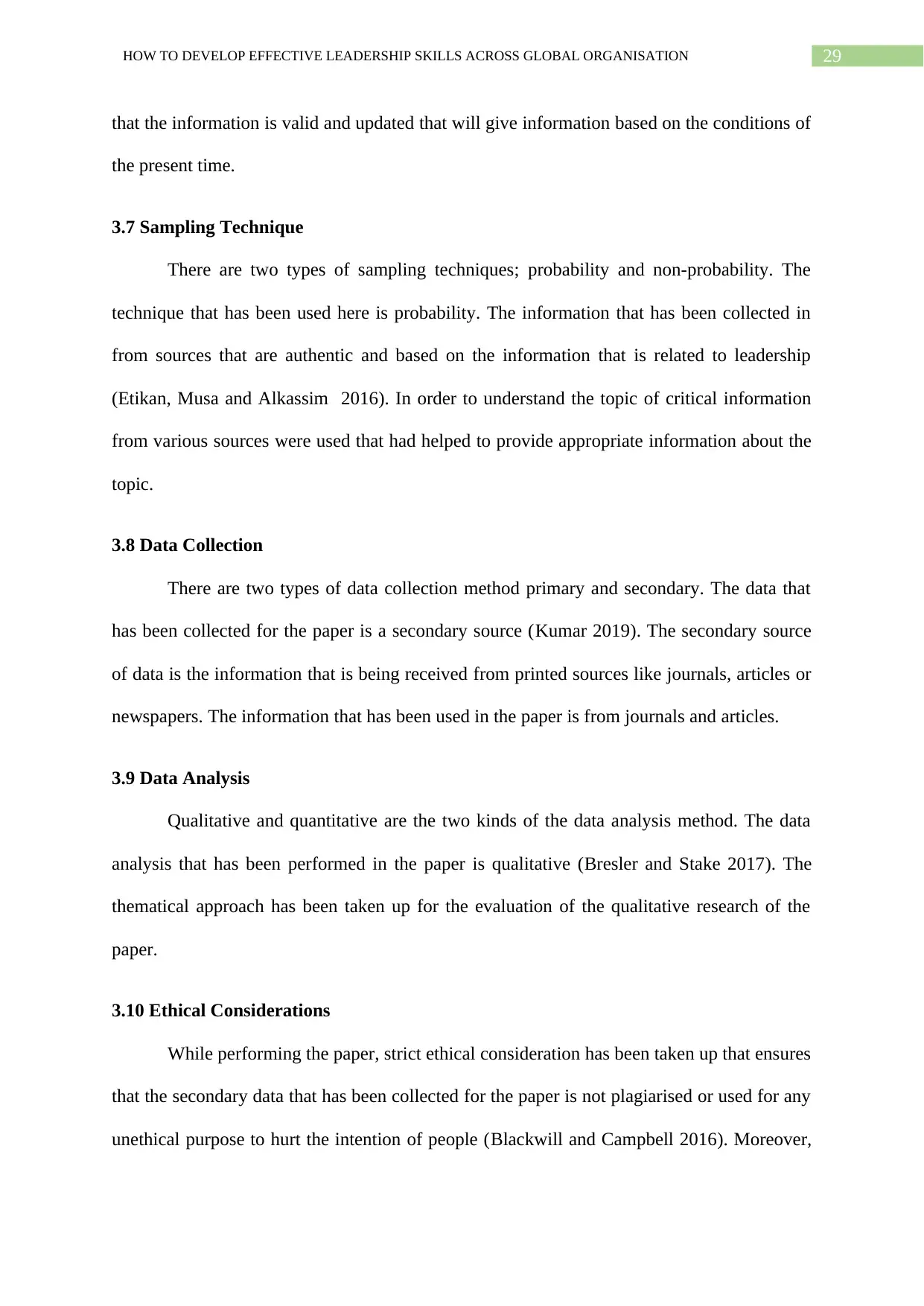
29HOW TO DEVELOP EFFECTIVE LEADERSHIP SKILLS ACROSS GLOBAL ORGANISATION
that the information is valid and updated that will give information based on the conditions of
the present time.
3.7 Sampling Technique
There are two types of sampling techniques; probability and non-probability. The
technique that has been used here is probability. The information that has been collected in
from sources that are authentic and based on the information that is related to leadership
(Etikan, Musa and Alkassim 2016). In order to understand the topic of critical information
from various sources were used that had helped to provide appropriate information about the
topic.
3.8 Data Collection
There are two types of data collection method primary and secondary. The data that
has been collected for the paper is a secondary source (Kumar 2019). The secondary source
of data is the information that is being received from printed sources like journals, articles or
newspapers. The information that has been used in the paper is from journals and articles.
3.9 Data Analysis
Qualitative and quantitative are the two kinds of the data analysis method. The data
analysis that has been performed in the paper is qualitative (Bresler and Stake 2017). The
thematical approach has been taken up for the evaluation of the qualitative research of the
paper.
3.10 Ethical Considerations
While performing the paper, strict ethical consideration has been taken up that ensures
that the secondary data that has been collected for the paper is not plagiarised or used for any
unethical purpose to hurt the intention of people (Blackwill and Campbell 2016). Moreover,
that the information is valid and updated that will give information based on the conditions of
the present time.
3.7 Sampling Technique
There are two types of sampling techniques; probability and non-probability. The
technique that has been used here is probability. The information that has been collected in
from sources that are authentic and based on the information that is related to leadership
(Etikan, Musa and Alkassim 2016). In order to understand the topic of critical information
from various sources were used that had helped to provide appropriate information about the
topic.
3.8 Data Collection
There are two types of data collection method primary and secondary. The data that
has been collected for the paper is a secondary source (Kumar 2019). The secondary source
of data is the information that is being received from printed sources like journals, articles or
newspapers. The information that has been used in the paper is from journals and articles.
3.9 Data Analysis
Qualitative and quantitative are the two kinds of the data analysis method. The data
analysis that has been performed in the paper is qualitative (Bresler and Stake 2017). The
thematical approach has been taken up for the evaluation of the qualitative research of the
paper.
3.10 Ethical Considerations
While performing the paper, strict ethical consideration has been taken up that ensures
that the secondary data that has been collected for the paper is not plagiarised or used for any
unethical purpose to hurt the intention of people (Blackwill and Campbell 2016). Moreover,
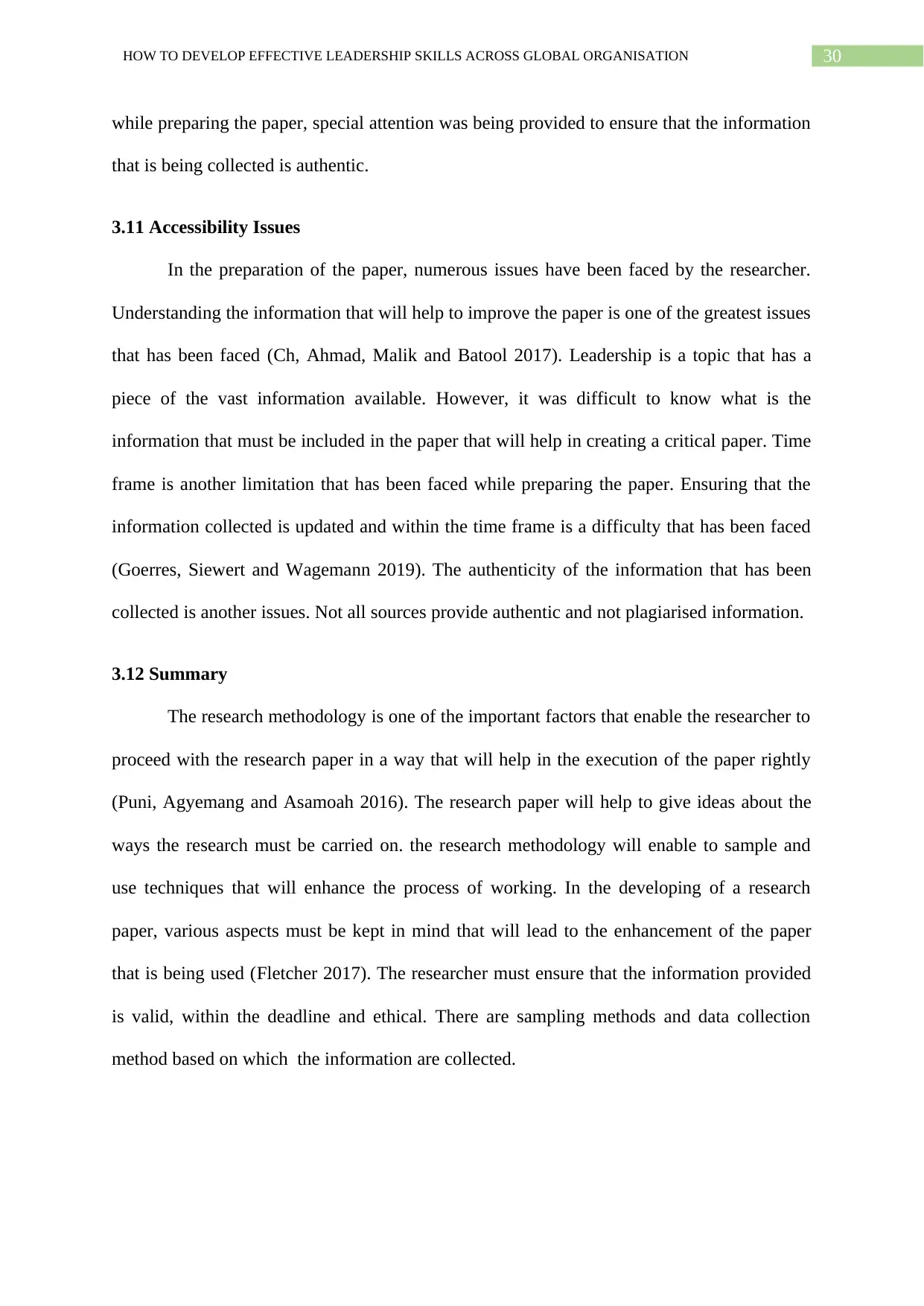
30HOW TO DEVELOP EFFECTIVE LEADERSHIP SKILLS ACROSS GLOBAL ORGANISATION
while preparing the paper, special attention was being provided to ensure that the information
that is being collected is authentic.
3.11 Accessibility Issues
In the preparation of the paper, numerous issues have been faced by the researcher.
Understanding the information that will help to improve the paper is one of the greatest issues
that has been faced (Ch, Ahmad, Malik and Batool 2017). Leadership is a topic that has a
piece of the vast information available. However, it was difficult to know what is the
information that must be included in the paper that will help in creating a critical paper. Time
frame is another limitation that has been faced while preparing the paper. Ensuring that the
information collected is updated and within the time frame is a difficulty that has been faced
(Goerres, Siewert and Wagemann 2019). The authenticity of the information that has been
collected is another issues. Not all sources provide authentic and not plagiarised information.
3.12 Summary
The research methodology is one of the important factors that enable the researcher to
proceed with the research paper in a way that will help in the execution of the paper rightly
(Puni, Agyemang and Asamoah 2016). The research paper will help to give ideas about the
ways the research must be carried on. the research methodology will enable to sample and
use techniques that will enhance the process of working. In the developing of a research
paper, various aspects must be kept in mind that will lead to the enhancement of the paper
that is being used (Fletcher 2017). The researcher must ensure that the information provided
is valid, within the deadline and ethical. There are sampling methods and data collection
method based on which the information are collected.
while preparing the paper, special attention was being provided to ensure that the information
that is being collected is authentic.
3.11 Accessibility Issues
In the preparation of the paper, numerous issues have been faced by the researcher.
Understanding the information that will help to improve the paper is one of the greatest issues
that has been faced (Ch, Ahmad, Malik and Batool 2017). Leadership is a topic that has a
piece of the vast information available. However, it was difficult to know what is the
information that must be included in the paper that will help in creating a critical paper. Time
frame is another limitation that has been faced while preparing the paper. Ensuring that the
information collected is updated and within the time frame is a difficulty that has been faced
(Goerres, Siewert and Wagemann 2019). The authenticity of the information that has been
collected is another issues. Not all sources provide authentic and not plagiarised information.
3.12 Summary
The research methodology is one of the important factors that enable the researcher to
proceed with the research paper in a way that will help in the execution of the paper rightly
(Puni, Agyemang and Asamoah 2016). The research paper will help to give ideas about the
ways the research must be carried on. the research methodology will enable to sample and
use techniques that will enhance the process of working. In the developing of a research
paper, various aspects must be kept in mind that will lead to the enhancement of the paper
that is being used (Fletcher 2017). The researcher must ensure that the information provided
is valid, within the deadline and ethical. There are sampling methods and data collection
method based on which the information are collected.
Paraphrase This Document
Need a fresh take? Get an instant paraphrase of this document with our AI Paraphraser
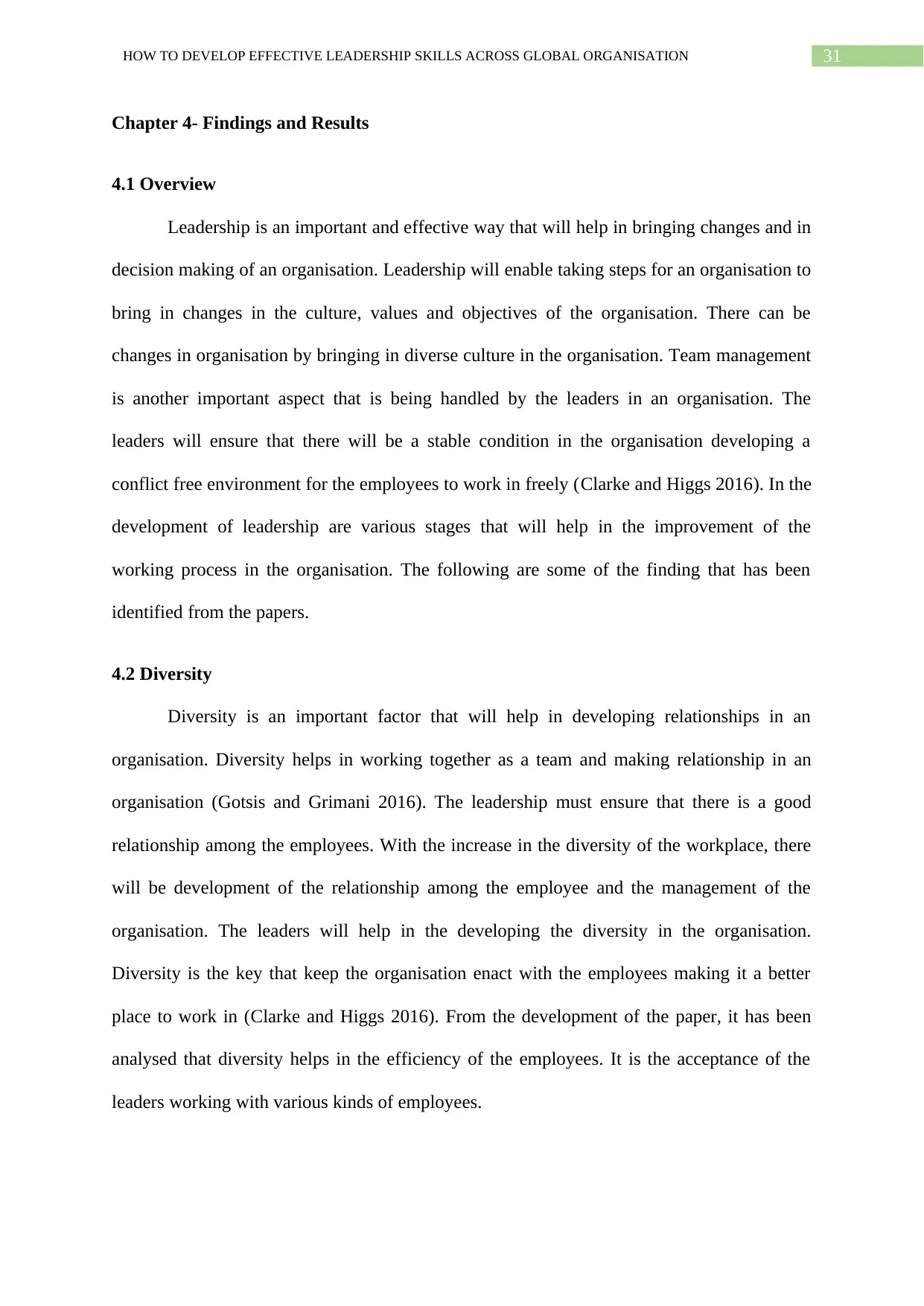
31HOW TO DEVELOP EFFECTIVE LEADERSHIP SKILLS ACROSS GLOBAL ORGANISATION
Chapter 4- Findings and Results
4.1 Overview
Leadership is an important and effective way that will help in bringing changes and in
decision making of an organisation. Leadership will enable taking steps for an organisation to
bring in changes in the culture, values and objectives of the organisation. There can be
changes in organisation by bringing in diverse culture in the organisation. Team management
is another important aspect that is being handled by the leaders in an organisation. The
leaders will ensure that there will be a stable condition in the organisation developing a
conflict free environment for the employees to work in freely (Clarke and Higgs 2016). In the
development of leadership are various stages that will help in the improvement of the
working process in the organisation. The following are some of the finding that has been
identified from the papers.
4.2 Diversity
Diversity is an important factor that will help in developing relationships in an
organisation. Diversity helps in working together as a team and making relationship in an
organisation (Gotsis and Grimani 2016). The leadership must ensure that there is a good
relationship among the employees. With the increase in the diversity of the workplace, there
will be development of the relationship among the employee and the management of the
organisation. The leaders will help in the developing the diversity in the organisation.
Diversity is the key that keep the organisation enact with the employees making it a better
place to work in (Clarke and Higgs 2016). From the development of the paper, it has been
analysed that diversity helps in the efficiency of the employees. It is the acceptance of the
leaders working with various kinds of employees.
Chapter 4- Findings and Results
4.1 Overview
Leadership is an important and effective way that will help in bringing changes and in
decision making of an organisation. Leadership will enable taking steps for an organisation to
bring in changes in the culture, values and objectives of the organisation. There can be
changes in organisation by bringing in diverse culture in the organisation. Team management
is another important aspect that is being handled by the leaders in an organisation. The
leaders will ensure that there will be a stable condition in the organisation developing a
conflict free environment for the employees to work in freely (Clarke and Higgs 2016). In the
development of leadership are various stages that will help in the improvement of the
working process in the organisation. The following are some of the finding that has been
identified from the papers.
4.2 Diversity
Diversity is an important factor that will help in developing relationships in an
organisation. Diversity helps in working together as a team and making relationship in an
organisation (Gotsis and Grimani 2016). The leadership must ensure that there is a good
relationship among the employees. With the increase in the diversity of the workplace, there
will be development of the relationship among the employee and the management of the
organisation. The leaders will help in the developing the diversity in the organisation.
Diversity is the key that keep the organisation enact with the employees making it a better
place to work in (Clarke and Higgs 2016). From the development of the paper, it has been
analysed that diversity helps in the efficiency of the employees. It is the acceptance of the
leaders working with various kinds of employees.
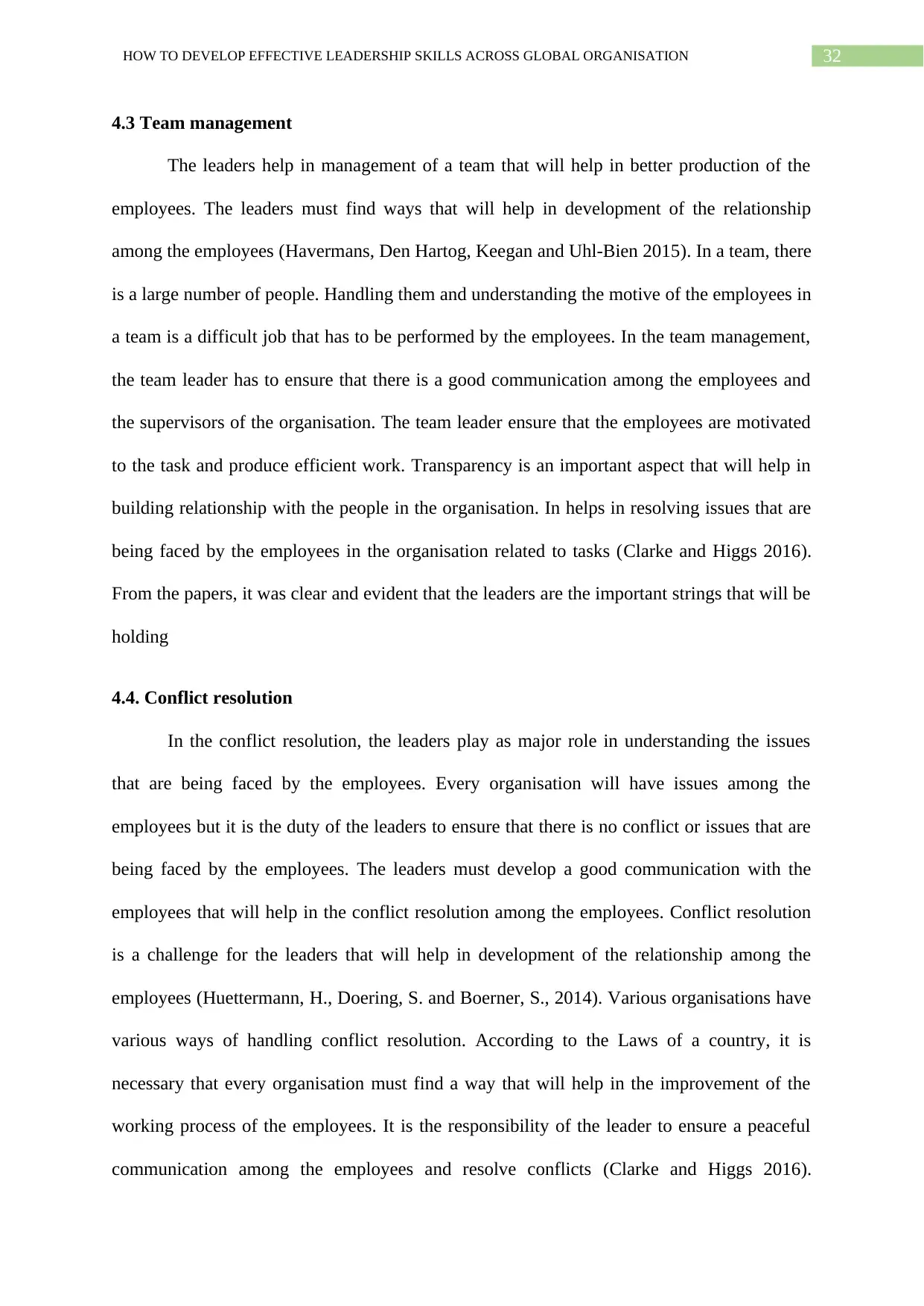
32HOW TO DEVELOP EFFECTIVE LEADERSHIP SKILLS ACROSS GLOBAL ORGANISATION
4.3 Team management
The leaders help in management of a team that will help in better production of the
employees. The leaders must find ways that will help in development of the relationship
among the employees (Havermans, Den Hartog, Keegan and Uhl‐Bien 2015). In a team, there
is a large number of people. Handling them and understanding the motive of the employees in
a team is a difficult job that has to be performed by the employees. In the team management,
the team leader has to ensure that there is a good communication among the employees and
the supervisors of the organisation. The team leader ensure that the employees are motivated
to the task and produce efficient work. Transparency is an important aspect that will help in
building relationship with the people in the organisation. In helps in resolving issues that are
being faced by the employees in the organisation related to tasks (Clarke and Higgs 2016).
From the papers, it was clear and evident that the leaders are the important strings that will be
holding
4.4. Conflict resolution
In the conflict resolution, the leaders play as major role in understanding the issues
that are being faced by the employees. Every organisation will have issues among the
employees but it is the duty of the leaders to ensure that there is no conflict or issues that are
being faced by the employees. The leaders must develop a good communication with the
employees that will help in the conflict resolution among the employees. Conflict resolution
is a challenge for the leaders that will help in development of the relationship among the
employees (Huettermann, H., Doering, S. and Boerner, S., 2014). Various organisations have
various ways of handling conflict resolution. According to the Laws of a country, it is
necessary that every organisation must find a way that will help in the improvement of the
working process of the employees. It is the responsibility of the leader to ensure a peaceful
communication among the employees and resolve conflicts (Clarke and Higgs 2016).
4.3 Team management
The leaders help in management of a team that will help in better production of the
employees. The leaders must find ways that will help in development of the relationship
among the employees (Havermans, Den Hartog, Keegan and Uhl‐Bien 2015). In a team, there
is a large number of people. Handling them and understanding the motive of the employees in
a team is a difficult job that has to be performed by the employees. In the team management,
the team leader has to ensure that there is a good communication among the employees and
the supervisors of the organisation. The team leader ensure that the employees are motivated
to the task and produce efficient work. Transparency is an important aspect that will help in
building relationship with the people in the organisation. In helps in resolving issues that are
being faced by the employees in the organisation related to tasks (Clarke and Higgs 2016).
From the papers, it was clear and evident that the leaders are the important strings that will be
holding
4.4. Conflict resolution
In the conflict resolution, the leaders play as major role in understanding the issues
that are being faced by the employees. Every organisation will have issues among the
employees but it is the duty of the leaders to ensure that there is no conflict or issues that are
being faced by the employees. The leaders must develop a good communication with the
employees that will help in the conflict resolution among the employees. Conflict resolution
is a challenge for the leaders that will help in development of the relationship among the
employees (Huettermann, H., Doering, S. and Boerner, S., 2014). Various organisations have
various ways of handling conflict resolution. According to the Laws of a country, it is
necessary that every organisation must find a way that will help in the improvement of the
working process of the employees. It is the responsibility of the leader to ensure a peaceful
communication among the employees and resolve conflicts (Clarke and Higgs 2016).
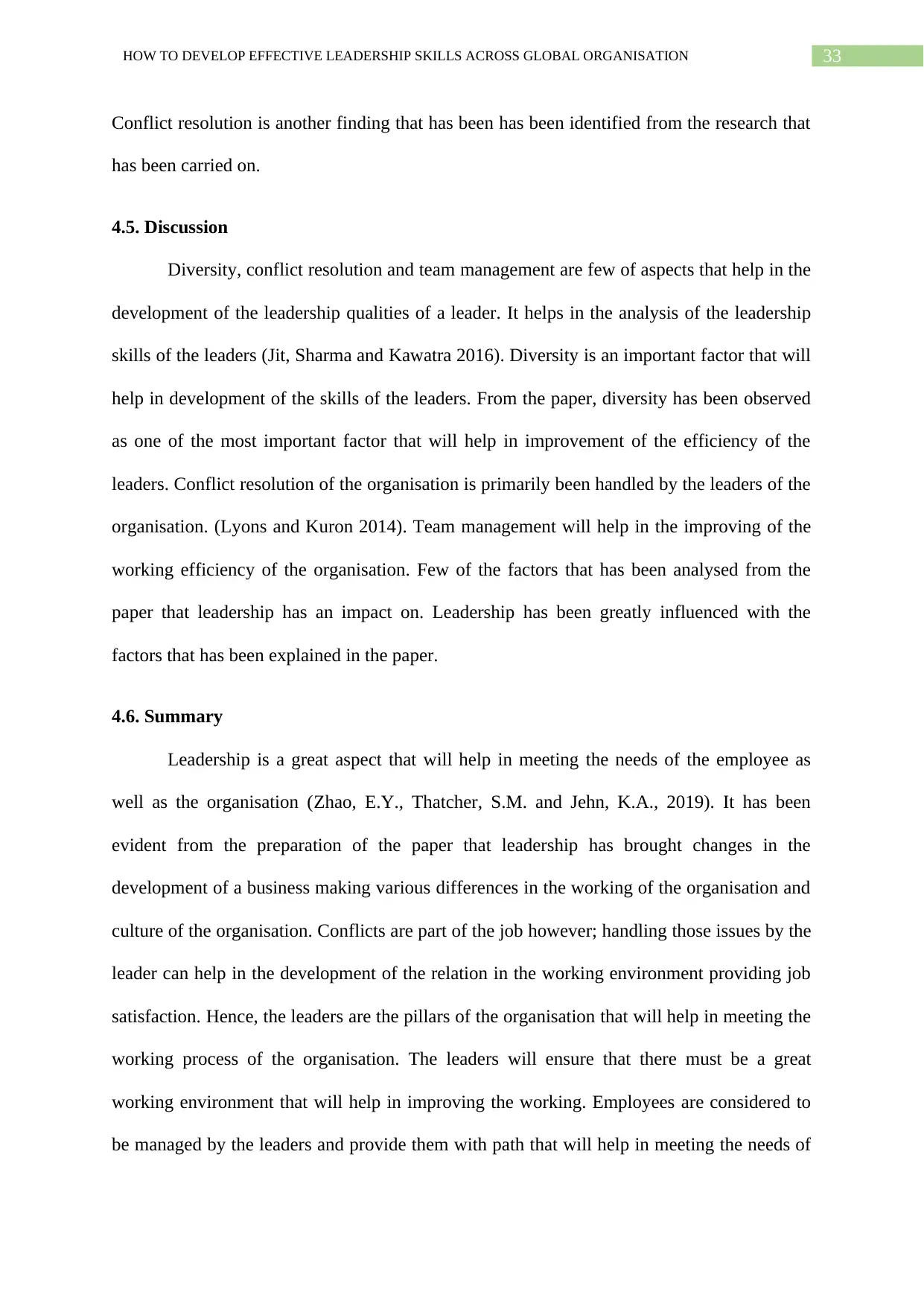
33HOW TO DEVELOP EFFECTIVE LEADERSHIP SKILLS ACROSS GLOBAL ORGANISATION
Conflict resolution is another finding that has been has been identified from the research that
has been carried on.
4.5. Discussion
Diversity, conflict resolution and team management are few of aspects that help in the
development of the leadership qualities of a leader. It helps in the analysis of the leadership
skills of the leaders (Jit, Sharma and Kawatra 2016). Diversity is an important factor that will
help in development of the skills of the leaders. From the paper, diversity has been observed
as one of the most important factor that will help in improvement of the efficiency of the
leaders. Conflict resolution of the organisation is primarily been handled by the leaders of the
organisation. (Lyons and Kuron 2014). Team management will help in the improving of the
working efficiency of the organisation. Few of the factors that has been analysed from the
paper that leadership has an impact on. Leadership has been greatly influenced with the
factors that has been explained in the paper.
4.6. Summary
Leadership is a great aspect that will help in meeting the needs of the employee as
well as the organisation (Zhao, E.Y., Thatcher, S.M. and Jehn, K.A., 2019). It has been
evident from the preparation of the paper that leadership has brought changes in the
development of a business making various differences in the working of the organisation and
culture of the organisation. Conflicts are part of the job however; handling those issues by the
leader can help in the development of the relation in the working environment providing job
satisfaction. Hence, the leaders are the pillars of the organisation that will help in meeting the
working process of the organisation. The leaders will ensure that there must be a great
working environment that will help in improving the working. Employees are considered to
be managed by the leaders and provide them with path that will help in meeting the needs of
Conflict resolution is another finding that has been has been identified from the research that
has been carried on.
4.5. Discussion
Diversity, conflict resolution and team management are few of aspects that help in the
development of the leadership qualities of a leader. It helps in the analysis of the leadership
skills of the leaders (Jit, Sharma and Kawatra 2016). Diversity is an important factor that will
help in development of the skills of the leaders. From the paper, diversity has been observed
as one of the most important factor that will help in improvement of the efficiency of the
leaders. Conflict resolution of the organisation is primarily been handled by the leaders of the
organisation. (Lyons and Kuron 2014). Team management will help in the improving of the
working efficiency of the organisation. Few of the factors that has been analysed from the
paper that leadership has an impact on. Leadership has been greatly influenced with the
factors that has been explained in the paper.
4.6. Summary
Leadership is a great aspect that will help in meeting the needs of the employee as
well as the organisation (Zhao, E.Y., Thatcher, S.M. and Jehn, K.A., 2019). It has been
evident from the preparation of the paper that leadership has brought changes in the
development of a business making various differences in the working of the organisation and
culture of the organisation. Conflicts are part of the job however; handling those issues by the
leader can help in the development of the relation in the working environment providing job
satisfaction. Hence, the leaders are the pillars of the organisation that will help in meeting the
working process of the organisation. The leaders will ensure that there must be a great
working environment that will help in improving the working. Employees are considered to
be managed by the leaders and provide them with path that will help in meeting the needs of
Secure Best Marks with AI Grader
Need help grading? Try our AI Grader for instant feedback on your assignments.
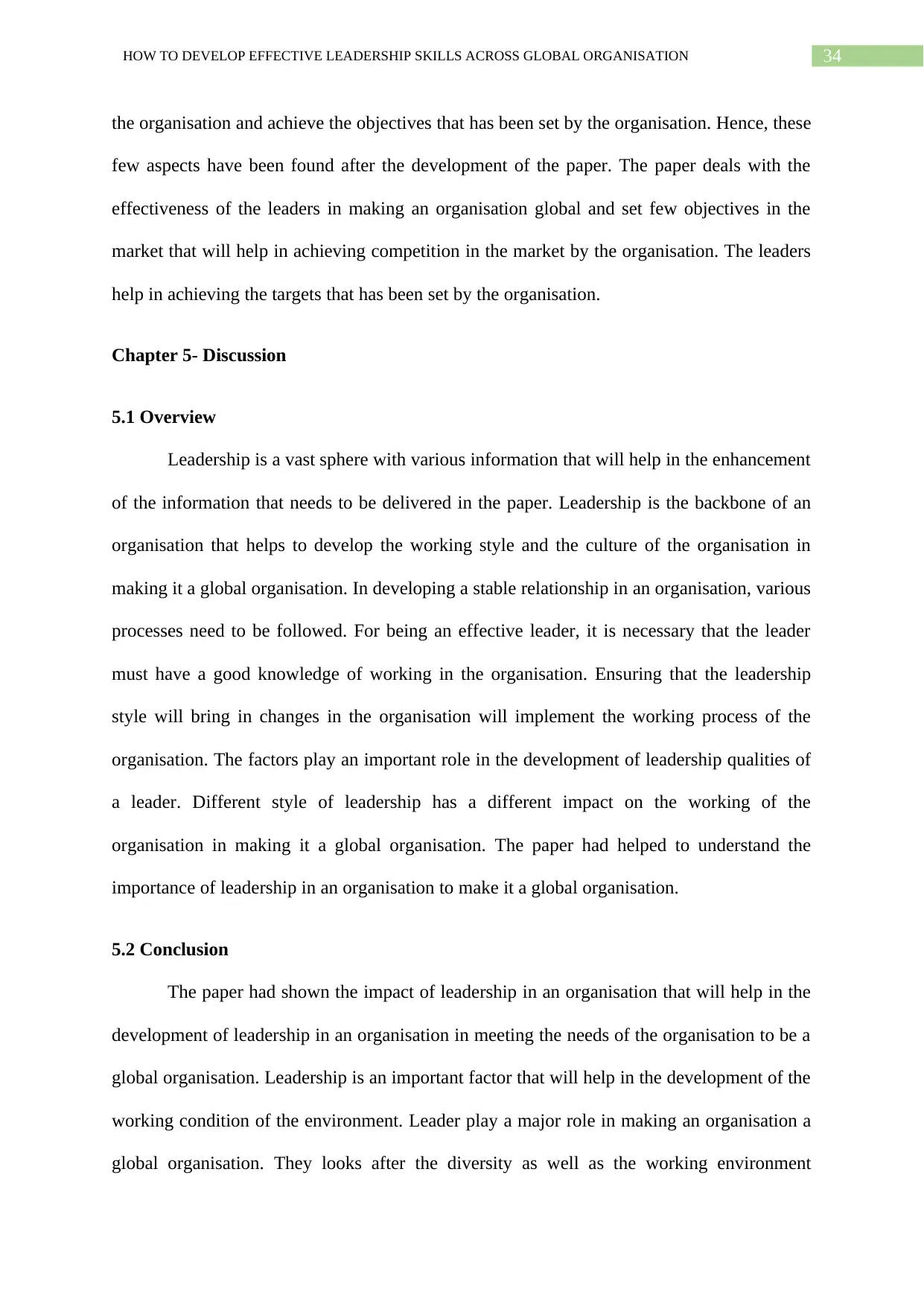
34HOW TO DEVELOP EFFECTIVE LEADERSHIP SKILLS ACROSS GLOBAL ORGANISATION
the organisation and achieve the objectives that has been set by the organisation. Hence, these
few aspects have been found after the development of the paper. The paper deals with the
effectiveness of the leaders in making an organisation global and set few objectives in the
market that will help in achieving competition in the market by the organisation. The leaders
help in achieving the targets that has been set by the organisation.
Chapter 5- Discussion
5.1 Overview
Leadership is a vast sphere with various information that will help in the enhancement
of the information that needs to be delivered in the paper. Leadership is the backbone of an
organisation that helps to develop the working style and the culture of the organisation in
making it a global organisation. In developing a stable relationship in an organisation, various
processes need to be followed. For being an effective leader, it is necessary that the leader
must have a good knowledge of working in the organisation. Ensuring that the leadership
style will bring in changes in the organisation will implement the working process of the
organisation. The factors play an important role in the development of leadership qualities of
a leader. Different style of leadership has a different impact on the working of the
organisation in making it a global organisation. The paper had helped to understand the
importance of leadership in an organisation to make it a global organisation.
5.2 Conclusion
The paper had shown the impact of leadership in an organisation that will help in the
development of leadership in an organisation in meeting the needs of the organisation to be a
global organisation. Leadership is an important factor that will help in the development of the
working condition of the environment. Leader play a major role in making an organisation a
global organisation. They looks after the diversity as well as the working environment
the organisation and achieve the objectives that has been set by the organisation. Hence, these
few aspects have been found after the development of the paper. The paper deals with the
effectiveness of the leaders in making an organisation global and set few objectives in the
market that will help in achieving competition in the market by the organisation. The leaders
help in achieving the targets that has been set by the organisation.
Chapter 5- Discussion
5.1 Overview
Leadership is a vast sphere with various information that will help in the enhancement
of the information that needs to be delivered in the paper. Leadership is the backbone of an
organisation that helps to develop the working style and the culture of the organisation in
making it a global organisation. In developing a stable relationship in an organisation, various
processes need to be followed. For being an effective leader, it is necessary that the leader
must have a good knowledge of working in the organisation. Ensuring that the leadership
style will bring in changes in the organisation will implement the working process of the
organisation. The factors play an important role in the development of leadership qualities of
a leader. Different style of leadership has a different impact on the working of the
organisation in making it a global organisation. The paper had helped to understand the
importance of leadership in an organisation to make it a global organisation.
5.2 Conclusion
The paper had shown the impact of leadership in an organisation that will help in the
development of leadership in an organisation in meeting the needs of the organisation to be a
global organisation. Leadership is an important factor that will help in the development of the
working condition of the environment. Leader play a major role in making an organisation a
global organisation. They looks after the diversity as well as the working environment
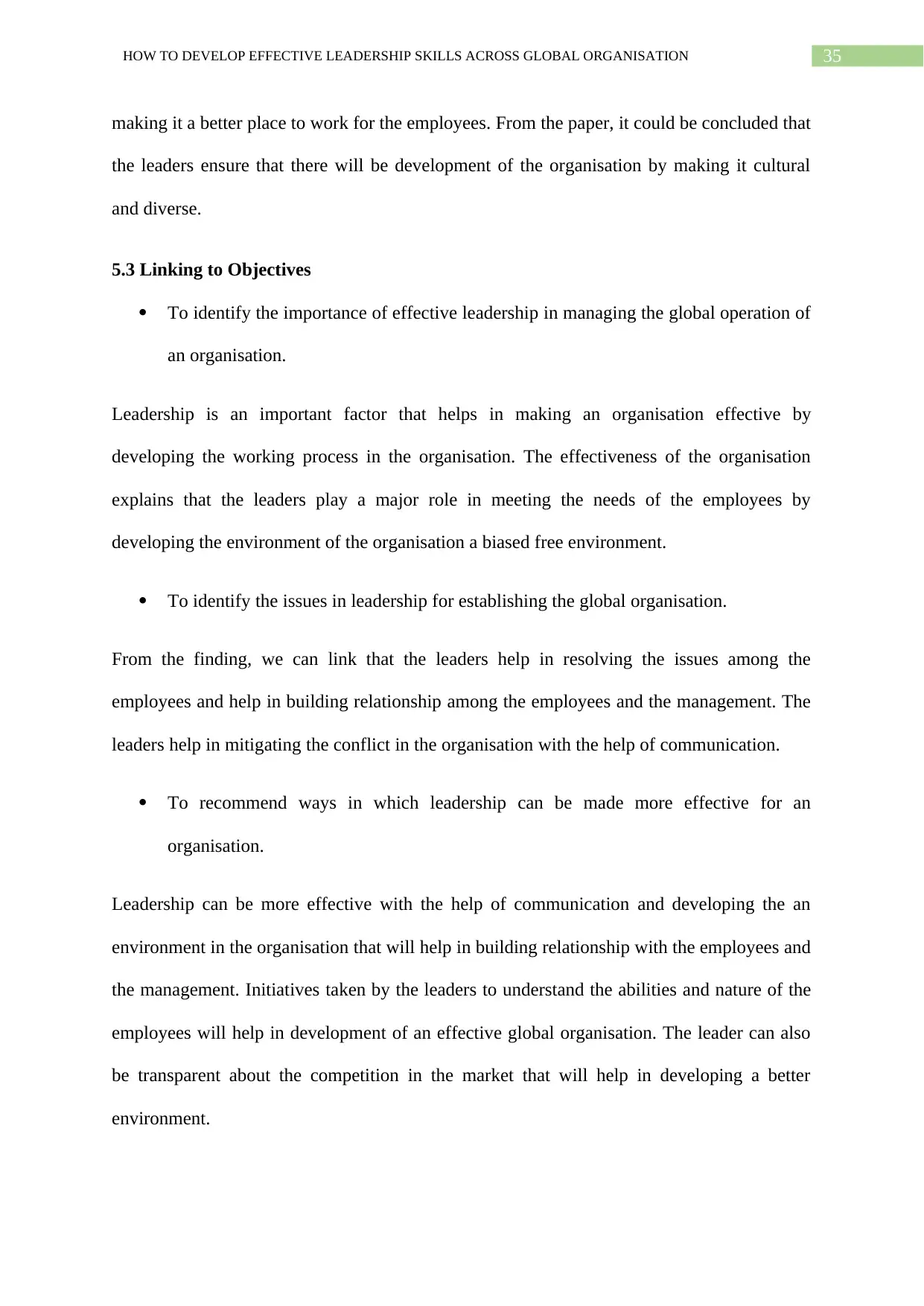
35HOW TO DEVELOP EFFECTIVE LEADERSHIP SKILLS ACROSS GLOBAL ORGANISATION
making it a better place to work for the employees. From the paper, it could be concluded that
the leaders ensure that there will be development of the organisation by making it cultural
and diverse.
5.3 Linking to Objectives
To identify the importance of effective leadership in managing the global operation of
an organisation.
Leadership is an important factor that helps in making an organisation effective by
developing the working process in the organisation. The effectiveness of the organisation
explains that the leaders play a major role in meeting the needs of the employees by
developing the environment of the organisation a biased free environment.
To identify the issues in leadership for establishing the global organisation.
From the finding, we can link that the leaders help in resolving the issues among the
employees and help in building relationship among the employees and the management. The
leaders help in mitigating the conflict in the organisation with the help of communication.
To recommend ways in which leadership can be made more effective for an
organisation.
Leadership can be more effective with the help of communication and developing the an
environment in the organisation that will help in building relationship with the employees and
the management. Initiatives taken by the leaders to understand the abilities and nature of the
employees will help in development of an effective global organisation. The leader can also
be transparent about the competition in the market that will help in developing a better
environment.
making it a better place to work for the employees. From the paper, it could be concluded that
the leaders ensure that there will be development of the organisation by making it cultural
and diverse.
5.3 Linking to Objectives
To identify the importance of effective leadership in managing the global operation of
an organisation.
Leadership is an important factor that helps in making an organisation effective by
developing the working process in the organisation. The effectiveness of the organisation
explains that the leaders play a major role in meeting the needs of the employees by
developing the environment of the organisation a biased free environment.
To identify the issues in leadership for establishing the global organisation.
From the finding, we can link that the leaders help in resolving the issues among the
employees and help in building relationship among the employees and the management. The
leaders help in mitigating the conflict in the organisation with the help of communication.
To recommend ways in which leadership can be made more effective for an
organisation.
Leadership can be more effective with the help of communication and developing the an
environment in the organisation that will help in building relationship with the employees and
the management. Initiatives taken by the leaders to understand the abilities and nature of the
employees will help in development of an effective global organisation. The leader can also
be transparent about the competition in the market that will help in developing a better
environment.
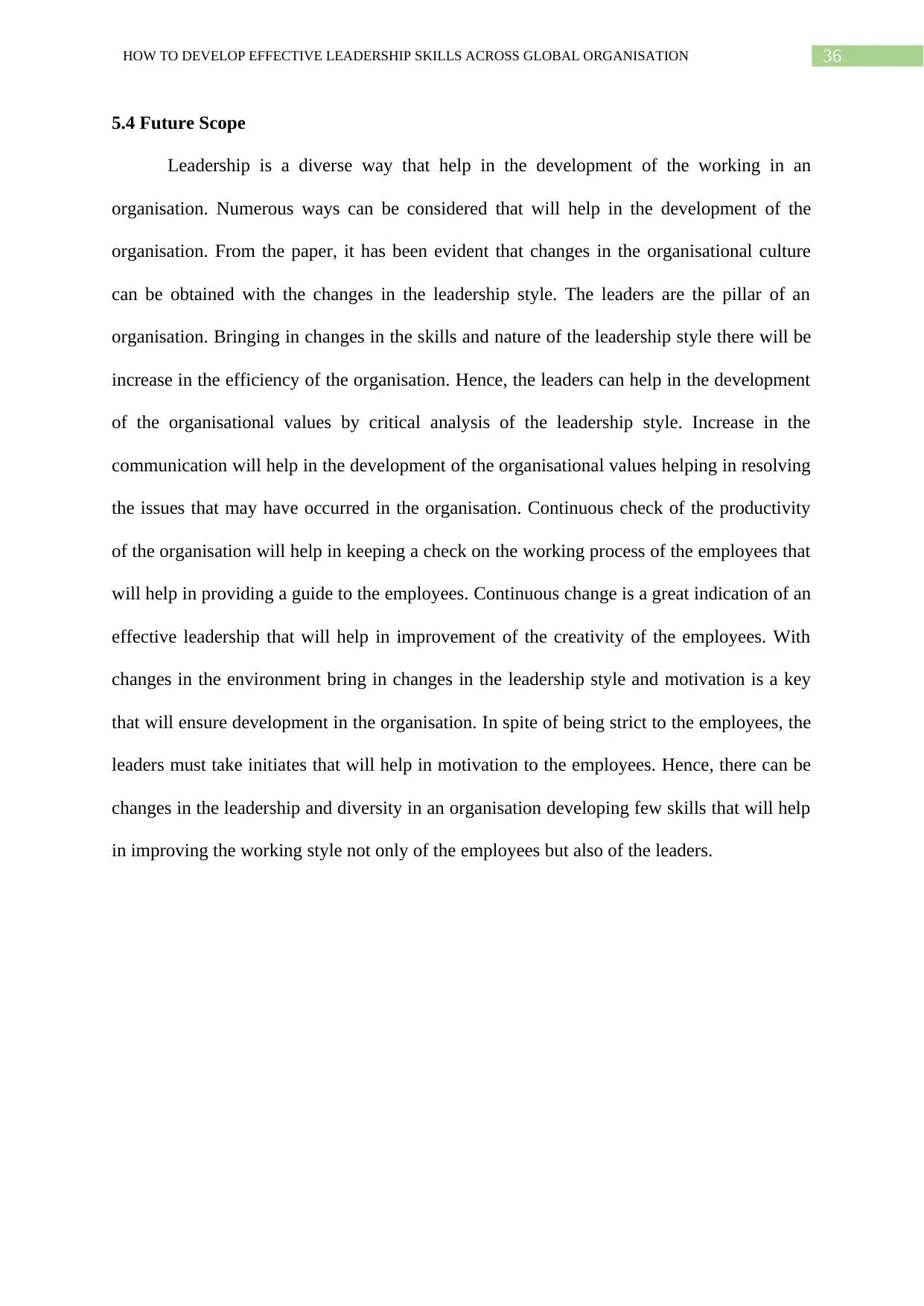
36HOW TO DEVELOP EFFECTIVE LEADERSHIP SKILLS ACROSS GLOBAL ORGANISATION
5.4 Future Scope
Leadership is a diverse way that help in the development of the working in an
organisation. Numerous ways can be considered that will help in the development of the
organisation. From the paper, it has been evident that changes in the organisational culture
can be obtained with the changes in the leadership style. The leaders are the pillar of an
organisation. Bringing in changes in the skills and nature of the leadership style there will be
increase in the efficiency of the organisation. Hence, the leaders can help in the development
of the organisational values by critical analysis of the leadership style. Increase in the
communication will help in the development of the organisational values helping in resolving
the issues that may have occurred in the organisation. Continuous check of the productivity
of the organisation will help in keeping a check on the working process of the employees that
will help in providing a guide to the employees. Continuous change is a great indication of an
effective leadership that will help in improvement of the creativity of the employees. With
changes in the environment bring in changes in the leadership style and motivation is a key
that will ensure development in the organisation. In spite of being strict to the employees, the
leaders must take initiates that will help in motivation to the employees. Hence, there can be
changes in the leadership and diversity in an organisation developing few skills that will help
in improving the working style not only of the employees but also of the leaders.
5.4 Future Scope
Leadership is a diverse way that help in the development of the working in an
organisation. Numerous ways can be considered that will help in the development of the
organisation. From the paper, it has been evident that changes in the organisational culture
can be obtained with the changes in the leadership style. The leaders are the pillar of an
organisation. Bringing in changes in the skills and nature of the leadership style there will be
increase in the efficiency of the organisation. Hence, the leaders can help in the development
of the organisational values by critical analysis of the leadership style. Increase in the
communication will help in the development of the organisational values helping in resolving
the issues that may have occurred in the organisation. Continuous check of the productivity
of the organisation will help in keeping a check on the working process of the employees that
will help in providing a guide to the employees. Continuous change is a great indication of an
effective leadership that will help in improvement of the creativity of the employees. With
changes in the environment bring in changes in the leadership style and motivation is a key
that will ensure development in the organisation. In spite of being strict to the employees, the
leaders must take initiates that will help in motivation to the employees. Hence, there can be
changes in the leadership and diversity in an organisation developing few skills that will help
in improving the working style not only of the employees but also of the leaders.
Paraphrase This Document
Need a fresh take? Get an instant paraphrase of this document with our AI Paraphraser
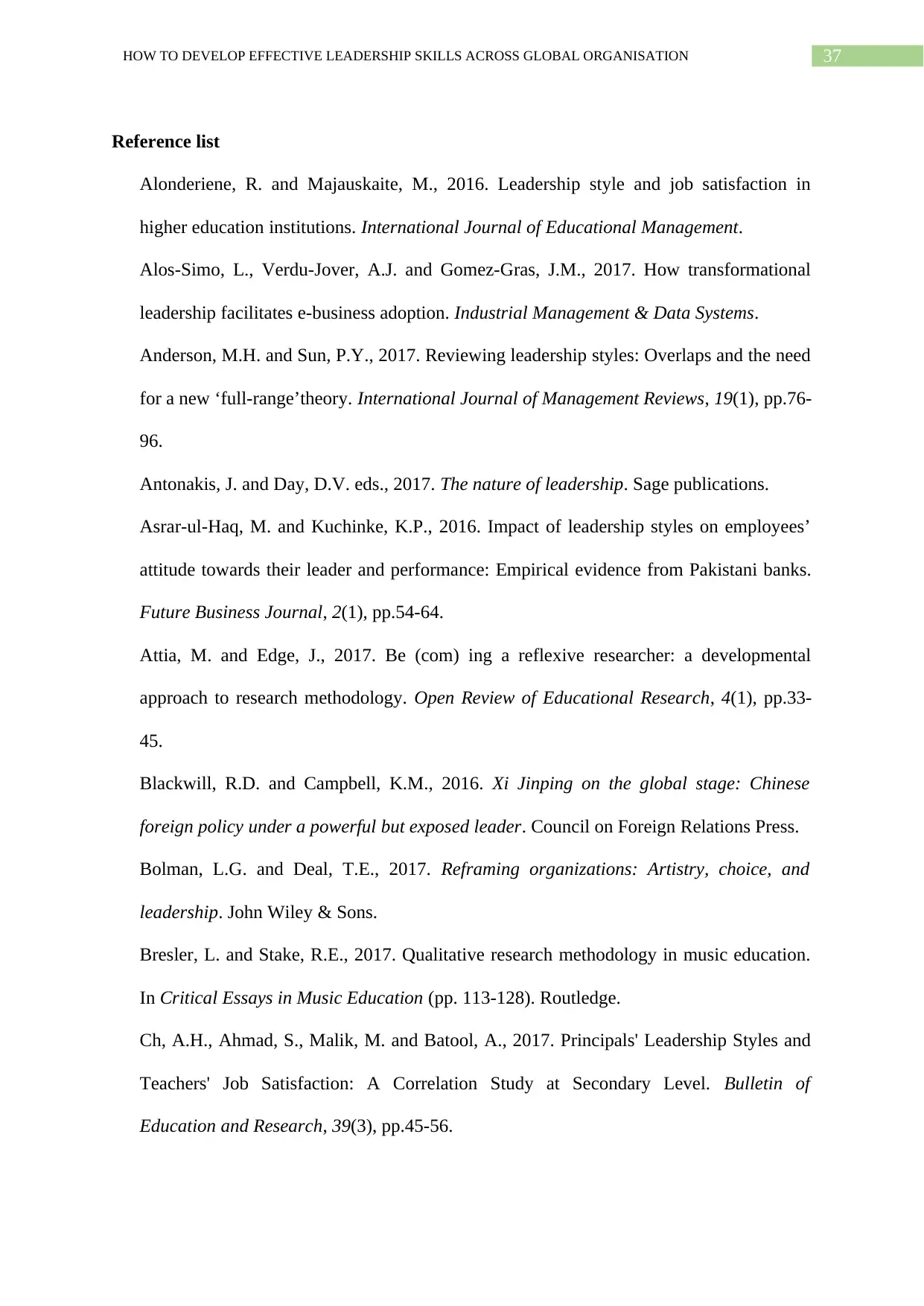
37HOW TO DEVELOP EFFECTIVE LEADERSHIP SKILLS ACROSS GLOBAL ORGANISATION
Reference list
Alonderiene, R. and Majauskaite, M., 2016. Leadership style and job satisfaction in
higher education institutions. International Journal of Educational Management.
Alos-Simo, L., Verdu-Jover, A.J. and Gomez-Gras, J.M., 2017. How transformational
leadership facilitates e-business adoption. Industrial Management & Data Systems.
Anderson, M.H. and Sun, P.Y., 2017. Reviewing leadership styles: Overlaps and the need
for a new ‘full‐range’theory. International Journal of Management Reviews, 19(1), pp.76-
96.
Antonakis, J. and Day, D.V. eds., 2017. The nature of leadership. Sage publications.
Asrar-ul-Haq, M. and Kuchinke, K.P., 2016. Impact of leadership styles on employees’
attitude towards their leader and performance: Empirical evidence from Pakistani banks.
Future Business Journal, 2(1), pp.54-64.
Attia, M. and Edge, J., 2017. Be (com) ing a reflexive researcher: a developmental
approach to research methodology. Open Review of Educational Research, 4(1), pp.33-
45.
Blackwill, R.D. and Campbell, K.M., 2016. Xi Jinping on the global stage: Chinese
foreign policy under a powerful but exposed leader. Council on Foreign Relations Press.
Bolman, L.G. and Deal, T.E., 2017. Reframing organizations: Artistry, choice, and
leadership. John Wiley & Sons.
Bresler, L. and Stake, R.E., 2017. Qualitative research methodology in music education.
In Critical Essays in Music Education (pp. 113-128). Routledge.
Ch, A.H., Ahmad, S., Malik, M. and Batool, A., 2017. Principals' Leadership Styles and
Teachers' Job Satisfaction: A Correlation Study at Secondary Level. Bulletin of
Education and Research, 39(3), pp.45-56.
Reference list
Alonderiene, R. and Majauskaite, M., 2016. Leadership style and job satisfaction in
higher education institutions. International Journal of Educational Management.
Alos-Simo, L., Verdu-Jover, A.J. and Gomez-Gras, J.M., 2017. How transformational
leadership facilitates e-business adoption. Industrial Management & Data Systems.
Anderson, M.H. and Sun, P.Y., 2017. Reviewing leadership styles: Overlaps and the need
for a new ‘full‐range’theory. International Journal of Management Reviews, 19(1), pp.76-
96.
Antonakis, J. and Day, D.V. eds., 2017. The nature of leadership. Sage publications.
Asrar-ul-Haq, M. and Kuchinke, K.P., 2016. Impact of leadership styles on employees’
attitude towards their leader and performance: Empirical evidence from Pakistani banks.
Future Business Journal, 2(1), pp.54-64.
Attia, M. and Edge, J., 2017. Be (com) ing a reflexive researcher: a developmental
approach to research methodology. Open Review of Educational Research, 4(1), pp.33-
45.
Blackwill, R.D. and Campbell, K.M., 2016. Xi Jinping on the global stage: Chinese
foreign policy under a powerful but exposed leader. Council on Foreign Relations Press.
Bolman, L.G. and Deal, T.E., 2017. Reframing organizations: Artistry, choice, and
leadership. John Wiley & Sons.
Bresler, L. and Stake, R.E., 2017. Qualitative research methodology in music education.
In Critical Essays in Music Education (pp. 113-128). Routledge.
Ch, A.H., Ahmad, S., Malik, M. and Batool, A., 2017. Principals' Leadership Styles and
Teachers' Job Satisfaction: A Correlation Study at Secondary Level. Bulletin of
Education and Research, 39(3), pp.45-56.
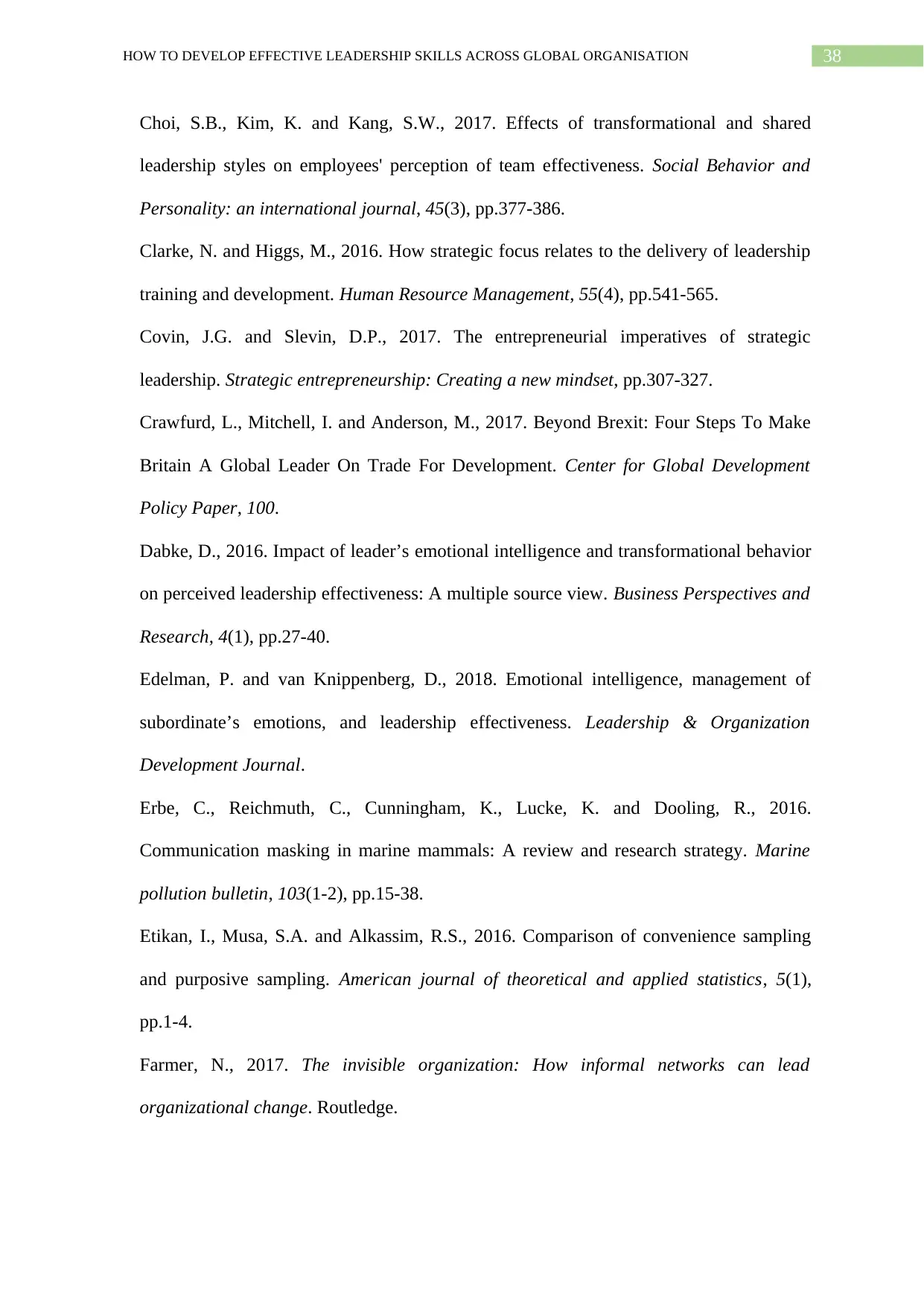
38HOW TO DEVELOP EFFECTIVE LEADERSHIP SKILLS ACROSS GLOBAL ORGANISATION
Choi, S.B., Kim, K. and Kang, S.W., 2017. Effects of transformational and shared
leadership styles on employees' perception of team effectiveness. Social Behavior and
Personality: an international journal, 45(3), pp.377-386.
Clarke, N. and Higgs, M., 2016. How strategic focus relates to the delivery of leadership
training and development. Human Resource Management, 55(4), pp.541-565.
Covin, J.G. and Slevin, D.P., 2017. The entrepreneurial imperatives of strategic
leadership. Strategic entrepreneurship: Creating a new mindset, pp.307-327.
Crawfurd, L., Mitchell, I. and Anderson, M., 2017. Beyond Brexit: Four Steps To Make
Britain A Global Leader On Trade For Development. Center for Global Development
Policy Paper, 100.
Dabke, D., 2016. Impact of leader’s emotional intelligence and transformational behavior
on perceived leadership effectiveness: A multiple source view. Business Perspectives and
Research, 4(1), pp.27-40.
Edelman, P. and van Knippenberg, D., 2018. Emotional intelligence, management of
subordinate’s emotions, and leadership effectiveness. Leadership & Organization
Development Journal.
Erbe, C., Reichmuth, C., Cunningham, K., Lucke, K. and Dooling, R., 2016.
Communication masking in marine mammals: A review and research strategy. Marine
pollution bulletin, 103(1-2), pp.15-38.
Etikan, I., Musa, S.A. and Alkassim, R.S., 2016. Comparison of convenience sampling
and purposive sampling. American journal of theoretical and applied statistics, 5(1),
pp.1-4.
Farmer, N., 2017. The invisible organization: How informal networks can lead
organizational change. Routledge.
Choi, S.B., Kim, K. and Kang, S.W., 2017. Effects of transformational and shared
leadership styles on employees' perception of team effectiveness. Social Behavior and
Personality: an international journal, 45(3), pp.377-386.
Clarke, N. and Higgs, M., 2016. How strategic focus relates to the delivery of leadership
training and development. Human Resource Management, 55(4), pp.541-565.
Covin, J.G. and Slevin, D.P., 2017. The entrepreneurial imperatives of strategic
leadership. Strategic entrepreneurship: Creating a new mindset, pp.307-327.
Crawfurd, L., Mitchell, I. and Anderson, M., 2017. Beyond Brexit: Four Steps To Make
Britain A Global Leader On Trade For Development. Center for Global Development
Policy Paper, 100.
Dabke, D., 2016. Impact of leader’s emotional intelligence and transformational behavior
on perceived leadership effectiveness: A multiple source view. Business Perspectives and
Research, 4(1), pp.27-40.
Edelman, P. and van Knippenberg, D., 2018. Emotional intelligence, management of
subordinate’s emotions, and leadership effectiveness. Leadership & Organization
Development Journal.
Erbe, C., Reichmuth, C., Cunningham, K., Lucke, K. and Dooling, R., 2016.
Communication masking in marine mammals: A review and research strategy. Marine
pollution bulletin, 103(1-2), pp.15-38.
Etikan, I., Musa, S.A. and Alkassim, R.S., 2016. Comparison of convenience sampling
and purposive sampling. American journal of theoretical and applied statistics, 5(1),
pp.1-4.
Farmer, N., 2017. The invisible organization: How informal networks can lead
organizational change. Routledge.
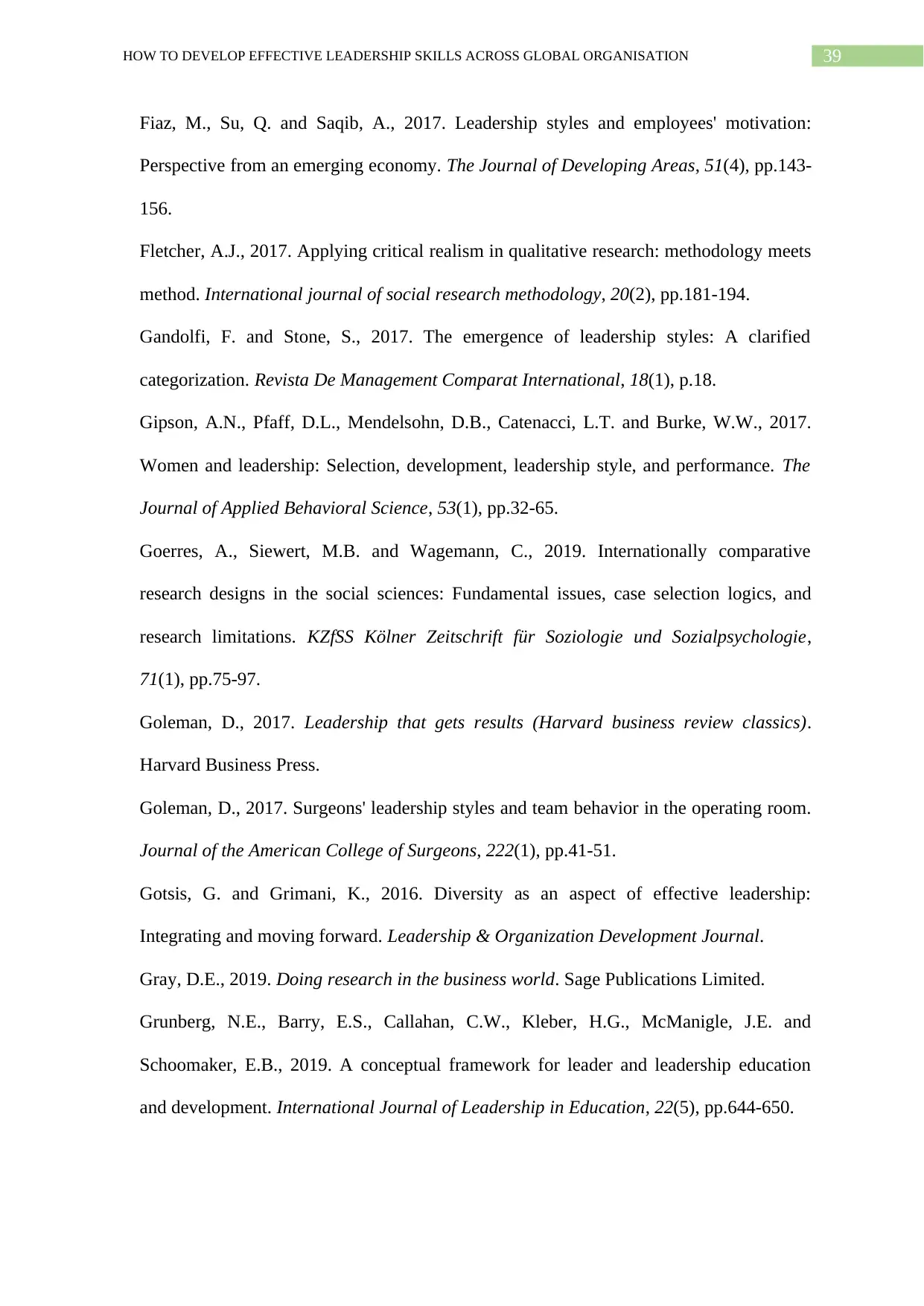
39HOW TO DEVELOP EFFECTIVE LEADERSHIP SKILLS ACROSS GLOBAL ORGANISATION
Fiaz, M., Su, Q. and Saqib, A., 2017. Leadership styles and employees' motivation:
Perspective from an emerging economy. The Journal of Developing Areas, 51(4), pp.143-
156.
Fletcher, A.J., 2017. Applying critical realism in qualitative research: methodology meets
method. International journal of social research methodology, 20(2), pp.181-194.
Gandolfi, F. and Stone, S., 2017. The emergence of leadership styles: A clarified
categorization. Revista De Management Comparat International, 18(1), p.18.
Gipson, A.N., Pfaff, D.L., Mendelsohn, D.B., Catenacci, L.T. and Burke, W.W., 2017.
Women and leadership: Selection, development, leadership style, and performance. The
Journal of Applied Behavioral Science, 53(1), pp.32-65.
Goerres, A., Siewert, M.B. and Wagemann, C., 2019. Internationally comparative
research designs in the social sciences: Fundamental issues, case selection logics, and
research limitations. KZfSS Kölner Zeitschrift für Soziologie und Sozialpsychologie,
71(1), pp.75-97.
Goleman, D., 2017. Leadership that gets results (Harvard business review classics).
Harvard Business Press.
Goleman, D., 2017. Surgeons' leadership styles and team behavior in the operating room.
Journal of the American College of Surgeons, 222(1), pp.41-51.
Gotsis, G. and Grimani, K., 2016. Diversity as an aspect of effective leadership:
Integrating and moving forward. Leadership & Organization Development Journal.
Gray, D.E., 2019. Doing research in the business world. Sage Publications Limited.
Grunberg, N.E., Barry, E.S., Callahan, C.W., Kleber, H.G., McManigle, J.E. and
Schoomaker, E.B., 2019. A conceptual framework for leader and leadership education
and development. International Journal of Leadership in Education, 22(5), pp.644-650.
Fiaz, M., Su, Q. and Saqib, A., 2017. Leadership styles and employees' motivation:
Perspective from an emerging economy. The Journal of Developing Areas, 51(4), pp.143-
156.
Fletcher, A.J., 2017. Applying critical realism in qualitative research: methodology meets
method. International journal of social research methodology, 20(2), pp.181-194.
Gandolfi, F. and Stone, S., 2017. The emergence of leadership styles: A clarified
categorization. Revista De Management Comparat International, 18(1), p.18.
Gipson, A.N., Pfaff, D.L., Mendelsohn, D.B., Catenacci, L.T. and Burke, W.W., 2017.
Women and leadership: Selection, development, leadership style, and performance. The
Journal of Applied Behavioral Science, 53(1), pp.32-65.
Goerres, A., Siewert, M.B. and Wagemann, C., 2019. Internationally comparative
research designs in the social sciences: Fundamental issues, case selection logics, and
research limitations. KZfSS Kölner Zeitschrift für Soziologie und Sozialpsychologie,
71(1), pp.75-97.
Goleman, D., 2017. Leadership that gets results (Harvard business review classics).
Harvard Business Press.
Goleman, D., 2017. Surgeons' leadership styles and team behavior in the operating room.
Journal of the American College of Surgeons, 222(1), pp.41-51.
Gotsis, G. and Grimani, K., 2016. Diversity as an aspect of effective leadership:
Integrating and moving forward. Leadership & Organization Development Journal.
Gray, D.E., 2019. Doing research in the business world. Sage Publications Limited.
Grunberg, N.E., Barry, E.S., Callahan, C.W., Kleber, H.G., McManigle, J.E. and
Schoomaker, E.B., 2019. A conceptual framework for leader and leadership education
and development. International Journal of Leadership in Education, 22(5), pp.644-650.
Secure Best Marks with AI Grader
Need help grading? Try our AI Grader for instant feedback on your assignments.
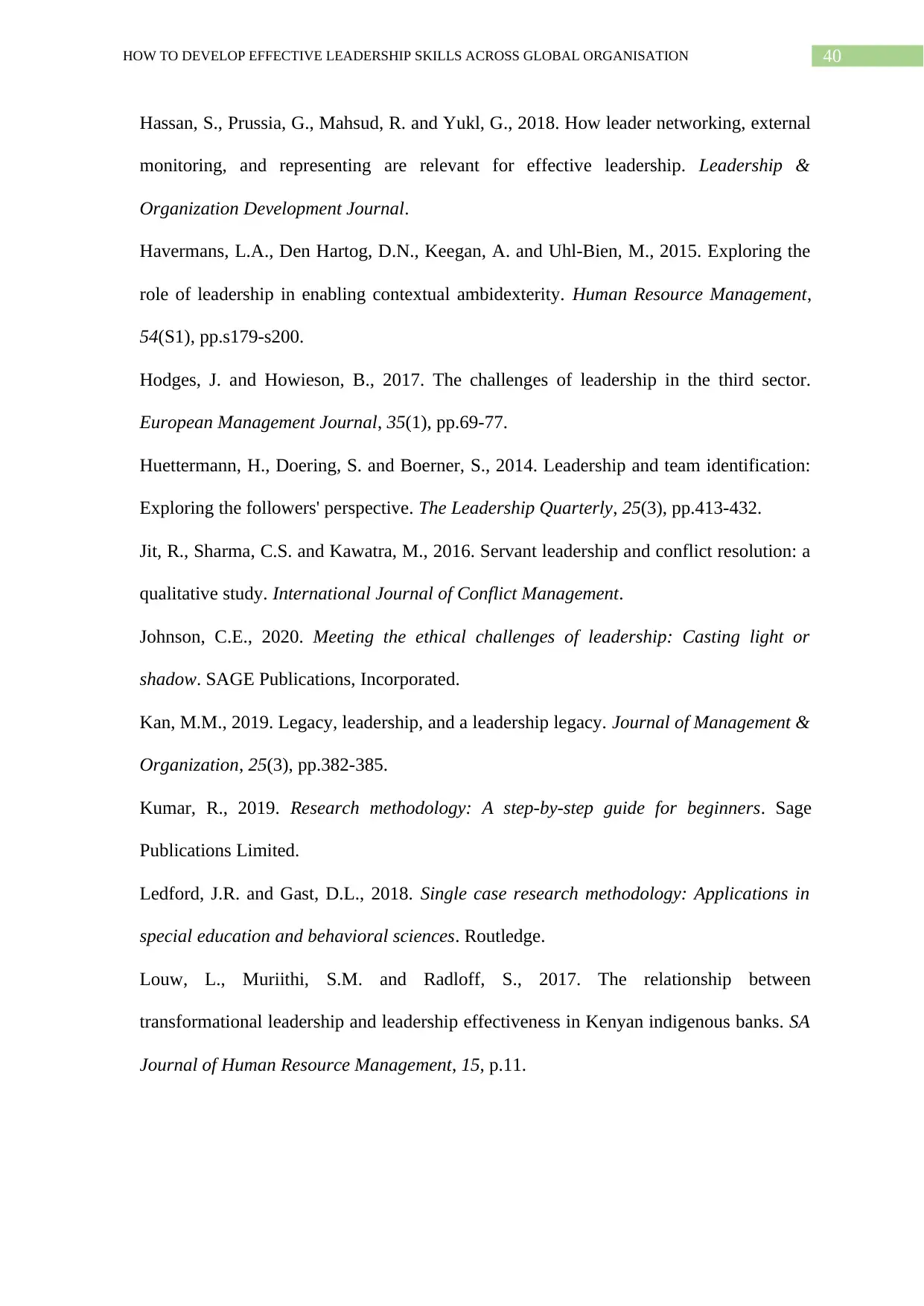
40HOW TO DEVELOP EFFECTIVE LEADERSHIP SKILLS ACROSS GLOBAL ORGANISATION
Hassan, S., Prussia, G., Mahsud, R. and Yukl, G., 2018. How leader networking, external
monitoring, and representing are relevant for effective leadership. Leadership &
Organization Development Journal.
Havermans, L.A., Den Hartog, D.N., Keegan, A. and Uhl‐Bien, M., 2015. Exploring the
role of leadership in enabling contextual ambidexterity. Human Resource Management,
54(S1), pp.s179-s200.
Hodges, J. and Howieson, B., 2017. The challenges of leadership in the third sector.
European Management Journal, 35(1), pp.69-77.
Huettermann, H., Doering, S. and Boerner, S., 2014. Leadership and team identification:
Exploring the followers' perspective. The Leadership Quarterly, 25(3), pp.413-432.
Jit, R., Sharma, C.S. and Kawatra, M., 2016. Servant leadership and conflict resolution: a
qualitative study. International Journal of Conflict Management.
Johnson, C.E., 2020. Meeting the ethical challenges of leadership: Casting light or
shadow. SAGE Publications, Incorporated.
Kan, M.M., 2019. Legacy, leadership, and a leadership legacy. Journal of Management &
Organization, 25(3), pp.382-385.
Kumar, R., 2019. Research methodology: A step-by-step guide for beginners. Sage
Publications Limited.
Ledford, J.R. and Gast, D.L., 2018. Single case research methodology: Applications in
special education and behavioral sciences. Routledge.
Louw, L., Muriithi, S.M. and Radloff, S., 2017. The relationship between
transformational leadership and leadership effectiveness in Kenyan indigenous banks. SA
Journal of Human Resource Management, 15, p.11.
Hassan, S., Prussia, G., Mahsud, R. and Yukl, G., 2018. How leader networking, external
monitoring, and representing are relevant for effective leadership. Leadership &
Organization Development Journal.
Havermans, L.A., Den Hartog, D.N., Keegan, A. and Uhl‐Bien, M., 2015. Exploring the
role of leadership in enabling contextual ambidexterity. Human Resource Management,
54(S1), pp.s179-s200.
Hodges, J. and Howieson, B., 2017. The challenges of leadership in the third sector.
European Management Journal, 35(1), pp.69-77.
Huettermann, H., Doering, S. and Boerner, S., 2014. Leadership and team identification:
Exploring the followers' perspective. The Leadership Quarterly, 25(3), pp.413-432.
Jit, R., Sharma, C.S. and Kawatra, M., 2016. Servant leadership and conflict resolution: a
qualitative study. International Journal of Conflict Management.
Johnson, C.E., 2020. Meeting the ethical challenges of leadership: Casting light or
shadow. SAGE Publications, Incorporated.
Kan, M.M., 2019. Legacy, leadership, and a leadership legacy. Journal of Management &
Organization, 25(3), pp.382-385.
Kumar, R., 2019. Research methodology: A step-by-step guide for beginners. Sage
Publications Limited.
Ledford, J.R. and Gast, D.L., 2018. Single case research methodology: Applications in
special education and behavioral sciences. Routledge.
Louw, L., Muriithi, S.M. and Radloff, S., 2017. The relationship between
transformational leadership and leadership effectiveness in Kenyan indigenous banks. SA
Journal of Human Resource Management, 15, p.11.
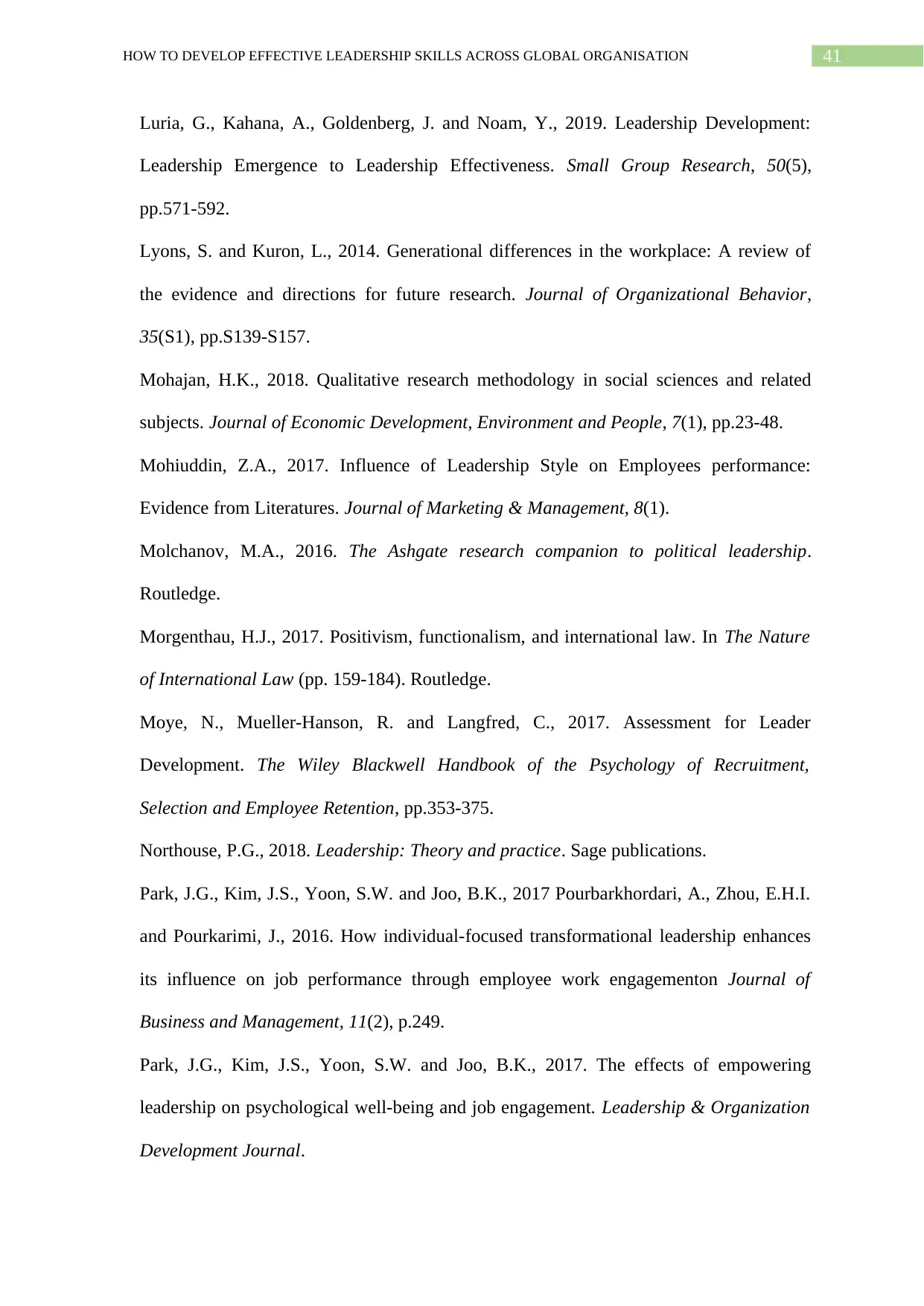
41HOW TO DEVELOP EFFECTIVE LEADERSHIP SKILLS ACROSS GLOBAL ORGANISATION
Luria, G., Kahana, A., Goldenberg, J. and Noam, Y., 2019. Leadership Development:
Leadership Emergence to Leadership Effectiveness. Small Group Research, 50(5),
pp.571-592.
Lyons, S. and Kuron, L., 2014. Generational differences in the workplace: A review of
the evidence and directions for future research. Journal of Organizational Behavior,
35(S1), pp.S139-S157.
Mohajan, H.K., 2018. Qualitative research methodology in social sciences and related
subjects. Journal of Economic Development, Environment and People, 7(1), pp.23-48.
Mohiuddin, Z.A., 2017. Influence of Leadership Style on Employees performance:
Evidence from Literatures. Journal of Marketing & Management, 8(1).
Molchanov, M.A., 2016. The Ashgate research companion to political leadership.
Routledge.
Morgenthau, H.J., 2017. Positivism, functionalism, and international law. In The Nature
of International Law (pp. 159-184). Routledge.
Moye, N., Mueller‐Hanson, R. and Langfred, C., 2017. Assessment for Leader
Development. The Wiley Blackwell Handbook of the Psychology of Recruitment,
Selection and Employee Retention, pp.353-375.
Northouse, P.G., 2018. Leadership: Theory and practice. Sage publications.
Park, J.G., Kim, J.S., Yoon, S.W. and Joo, B.K., 2017 Pourbarkhordari, A., Zhou, E.H.I.
and Pourkarimi, J., 2016. How individual-focused transformational leadership enhances
its influence on job performance through employee work engagementon Journal of
Business and Management, 11(2), p.249.
Park, J.G., Kim, J.S., Yoon, S.W. and Joo, B.K., 2017. The effects of empowering
leadership on psychological well-being and job engagement. Leadership & Organization
Development Journal.
Luria, G., Kahana, A., Goldenberg, J. and Noam, Y., 2019. Leadership Development:
Leadership Emergence to Leadership Effectiveness. Small Group Research, 50(5),
pp.571-592.
Lyons, S. and Kuron, L., 2014. Generational differences in the workplace: A review of
the evidence and directions for future research. Journal of Organizational Behavior,
35(S1), pp.S139-S157.
Mohajan, H.K., 2018. Qualitative research methodology in social sciences and related
subjects. Journal of Economic Development, Environment and People, 7(1), pp.23-48.
Mohiuddin, Z.A., 2017. Influence of Leadership Style on Employees performance:
Evidence from Literatures. Journal of Marketing & Management, 8(1).
Molchanov, M.A., 2016. The Ashgate research companion to political leadership.
Routledge.
Morgenthau, H.J., 2017. Positivism, functionalism, and international law. In The Nature
of International Law (pp. 159-184). Routledge.
Moye, N., Mueller‐Hanson, R. and Langfred, C., 2017. Assessment for Leader
Development. The Wiley Blackwell Handbook of the Psychology of Recruitment,
Selection and Employee Retention, pp.353-375.
Northouse, P.G., 2018. Leadership: Theory and practice. Sage publications.
Park, J.G., Kim, J.S., Yoon, S.W. and Joo, B.K., 2017 Pourbarkhordari, A., Zhou, E.H.I.
and Pourkarimi, J., 2016. How individual-focused transformational leadership enhances
its influence on job performance through employee work engagementon Journal of
Business and Management, 11(2), p.249.
Park, J.G., Kim, J.S., Yoon, S.W. and Joo, B.K., 2017. The effects of empowering
leadership on psychological well-being and job engagement. Leadership & Organization
Development Journal.
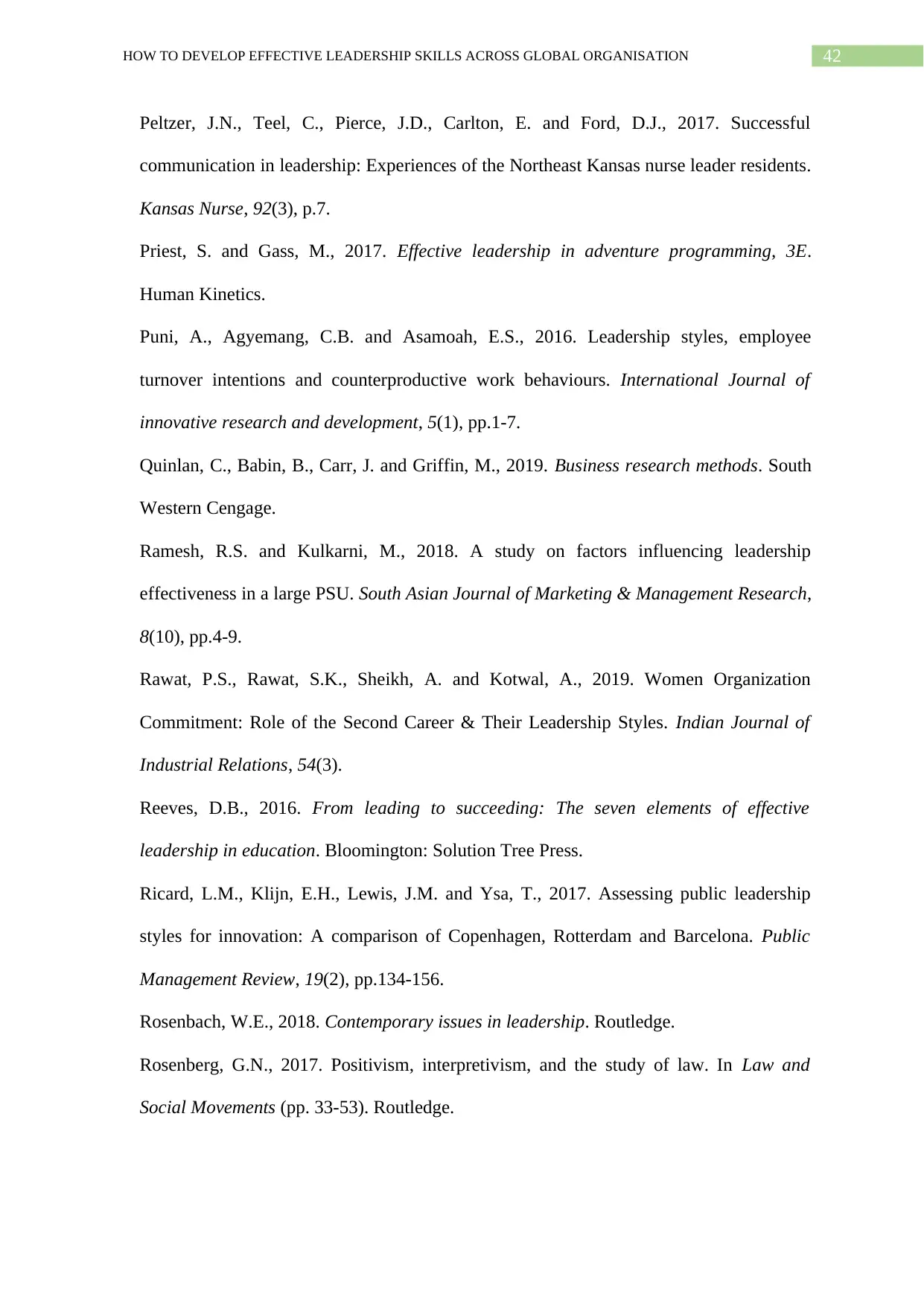
42HOW TO DEVELOP EFFECTIVE LEADERSHIP SKILLS ACROSS GLOBAL ORGANISATION
Peltzer, J.N., Teel, C., Pierce, J.D., Carlton, E. and Ford, D.J., 2017. Successful
communication in leadership: Experiences of the Northeast Kansas nurse leader residents.
Kansas Nurse, 92(3), p.7.
Priest, S. and Gass, M., 2017. Effective leadership in adventure programming, 3E.
Human Kinetics.
Puni, A., Agyemang, C.B. and Asamoah, E.S., 2016. Leadership styles, employee
turnover intentions and counterproductive work behaviours. International Journal of
innovative research and development, 5(1), pp.1-7.
Quinlan, C., Babin, B., Carr, J. and Griffin, M., 2019. Business research methods. South
Western Cengage.
Ramesh, R.S. and Kulkarni, M., 2018. A study on factors influencing leadership
effectiveness in a large PSU. South Asian Journal of Marketing & Management Research,
8(10), pp.4-9.
Rawat, P.S., Rawat, S.K., Sheikh, A. and Kotwal, A., 2019. Women Organization
Commitment: Role of the Second Career & Their Leadership Styles. Indian Journal of
Industrial Relations, 54(3).
Reeves, D.B., 2016. From leading to succeeding: The seven elements of effective
leadership in education. Bloomington: Solution Tree Press.
Ricard, L.M., Klijn, E.H., Lewis, J.M. and Ysa, T., 2017. Assessing public leadership
styles for innovation: A comparison of Copenhagen, Rotterdam and Barcelona. Public
Management Review, 19(2), pp.134-156.
Rosenbach, W.E., 2018. Contemporary issues in leadership. Routledge.
Rosenberg, G.N., 2017. Positivism, interpretivism, and the study of law. In Law and
Social Movements (pp. 33-53). Routledge.
Peltzer, J.N., Teel, C., Pierce, J.D., Carlton, E. and Ford, D.J., 2017. Successful
communication in leadership: Experiences of the Northeast Kansas nurse leader residents.
Kansas Nurse, 92(3), p.7.
Priest, S. and Gass, M., 2017. Effective leadership in adventure programming, 3E.
Human Kinetics.
Puni, A., Agyemang, C.B. and Asamoah, E.S., 2016. Leadership styles, employee
turnover intentions and counterproductive work behaviours. International Journal of
innovative research and development, 5(1), pp.1-7.
Quinlan, C., Babin, B., Carr, J. and Griffin, M., 2019. Business research methods. South
Western Cengage.
Ramesh, R.S. and Kulkarni, M., 2018. A study on factors influencing leadership
effectiveness in a large PSU. South Asian Journal of Marketing & Management Research,
8(10), pp.4-9.
Rawat, P.S., Rawat, S.K., Sheikh, A. and Kotwal, A., 2019. Women Organization
Commitment: Role of the Second Career & Their Leadership Styles. Indian Journal of
Industrial Relations, 54(3).
Reeves, D.B., 2016. From leading to succeeding: The seven elements of effective
leadership in education. Bloomington: Solution Tree Press.
Ricard, L.M., Klijn, E.H., Lewis, J.M. and Ysa, T., 2017. Assessing public leadership
styles for innovation: A comparison of Copenhagen, Rotterdam and Barcelona. Public
Management Review, 19(2), pp.134-156.
Rosenbach, W.E., 2018. Contemporary issues in leadership. Routledge.
Rosenberg, G.N., 2017. Positivism, interpretivism, and the study of law. In Law and
Social Movements (pp. 33-53). Routledge.
Paraphrase This Document
Need a fresh take? Get an instant paraphrase of this document with our AI Paraphraser
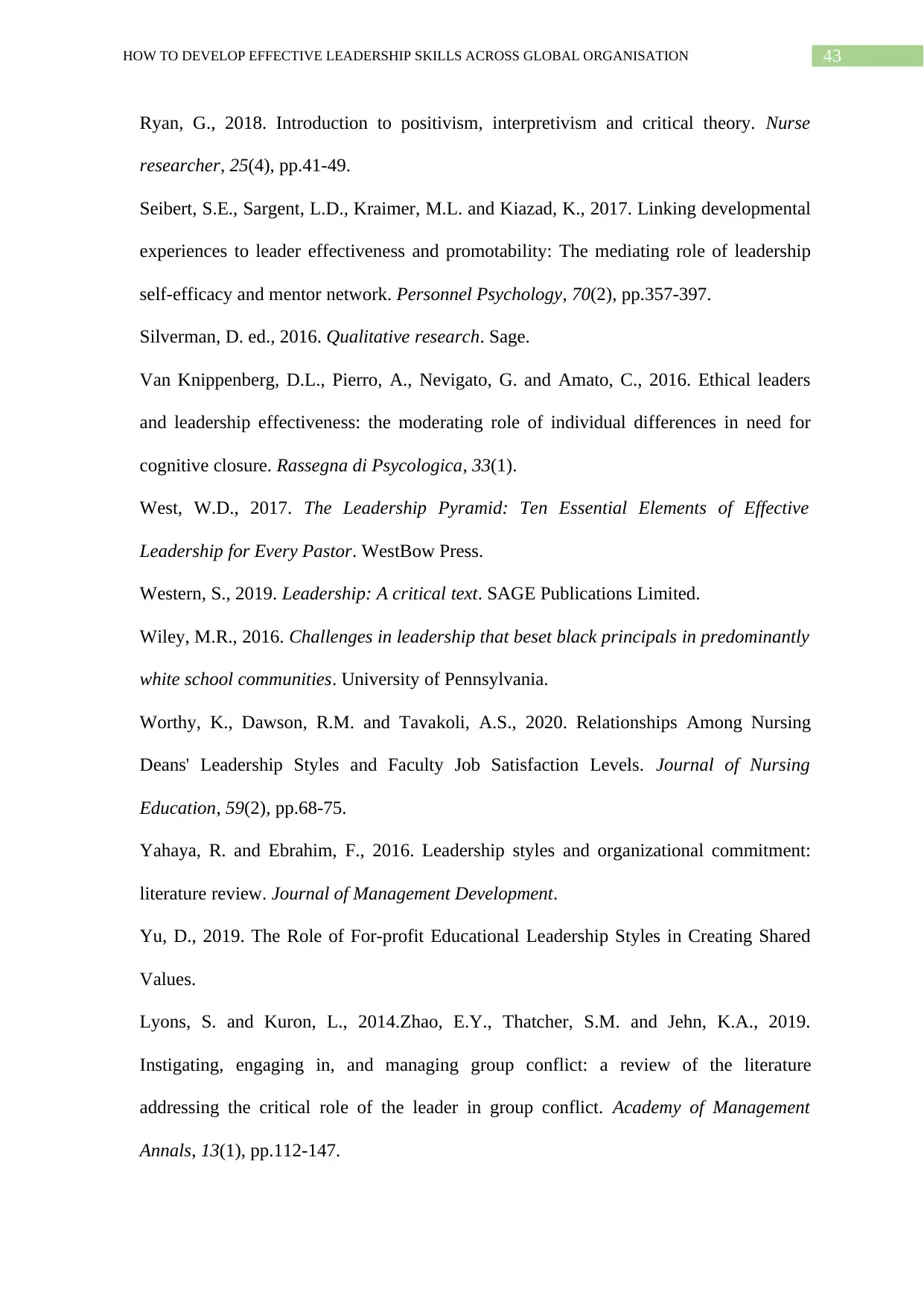
43HOW TO DEVELOP EFFECTIVE LEADERSHIP SKILLS ACROSS GLOBAL ORGANISATION
Ryan, G., 2018. Introduction to positivism, interpretivism and critical theory. Nurse
researcher, 25(4), pp.41-49.
Seibert, S.E., Sargent, L.D., Kraimer, M.L. and Kiazad, K., 2017. Linking developmental
experiences to leader effectiveness and promotability: The mediating role of leadership
self‐efficacy and mentor network. Personnel Psychology, 70(2), pp.357-397.
Silverman, D. ed., 2016. Qualitative research. Sage.
Van Knippenberg, D.L., Pierro, A., Nevigato, G. and Amato, C., 2016. Ethical leaders
and leadership effectiveness: the moderating role of individual differences in need for
cognitive closure. Rassegna di Psycologica, 33(1).
West, W.D., 2017. The Leadership Pyramid: Ten Essential Elements of Effective
Leadership for Every Pastor. WestBow Press.
Western, S., 2019. Leadership: A critical text. SAGE Publications Limited.
Wiley, M.R., 2016. Challenges in leadership that beset black principals in predominantly
white school communities. University of Pennsylvania.
Worthy, K., Dawson, R.M. and Tavakoli, A.S., 2020. Relationships Among Nursing
Deans' Leadership Styles and Faculty Job Satisfaction Levels. Journal of Nursing
Education, 59(2), pp.68-75.
Yahaya, R. and Ebrahim, F., 2016. Leadership styles and organizational commitment:
literature review. Journal of Management Development.
Yu, D., 2019. The Role of For-profit Educational Leadership Styles in Creating Shared
Values.
Lyons, S. and Kuron, L., 2014.Zhao, E.Y., Thatcher, S.M. and Jehn, K.A., 2019.
Instigating, engaging in, and managing group conflict: a review of the literature
addressing the critical role of the leader in group conflict. Academy of Management
Annals, 13(1), pp.112-147.
Ryan, G., 2018. Introduction to positivism, interpretivism and critical theory. Nurse
researcher, 25(4), pp.41-49.
Seibert, S.E., Sargent, L.D., Kraimer, M.L. and Kiazad, K., 2017. Linking developmental
experiences to leader effectiveness and promotability: The mediating role of leadership
self‐efficacy and mentor network. Personnel Psychology, 70(2), pp.357-397.
Silverman, D. ed., 2016. Qualitative research. Sage.
Van Knippenberg, D.L., Pierro, A., Nevigato, G. and Amato, C., 2016. Ethical leaders
and leadership effectiveness: the moderating role of individual differences in need for
cognitive closure. Rassegna di Psycologica, 33(1).
West, W.D., 2017. The Leadership Pyramid: Ten Essential Elements of Effective
Leadership for Every Pastor. WestBow Press.
Western, S., 2019. Leadership: A critical text. SAGE Publications Limited.
Wiley, M.R., 2016. Challenges in leadership that beset black principals in predominantly
white school communities. University of Pennsylvania.
Worthy, K., Dawson, R.M. and Tavakoli, A.S., 2020. Relationships Among Nursing
Deans' Leadership Styles and Faculty Job Satisfaction Levels. Journal of Nursing
Education, 59(2), pp.68-75.
Yahaya, R. and Ebrahim, F., 2016. Leadership styles and organizational commitment:
literature review. Journal of Management Development.
Yu, D., 2019. The Role of For-profit Educational Leadership Styles in Creating Shared
Values.
Lyons, S. and Kuron, L., 2014.Zhao, E.Y., Thatcher, S.M. and Jehn, K.A., 2019.
Instigating, engaging in, and managing group conflict: a review of the literature
addressing the critical role of the leader in group conflict. Academy of Management
Annals, 13(1), pp.112-147.
1 out of 44
Related Documents
Your All-in-One AI-Powered Toolkit for Academic Success.
+13062052269
info@desklib.com
Available 24*7 on WhatsApp / Email
![[object Object]](/_next/static/media/star-bottom.7253800d.svg)
Unlock your academic potential
© 2024 | Zucol Services PVT LTD | All rights reserved.





